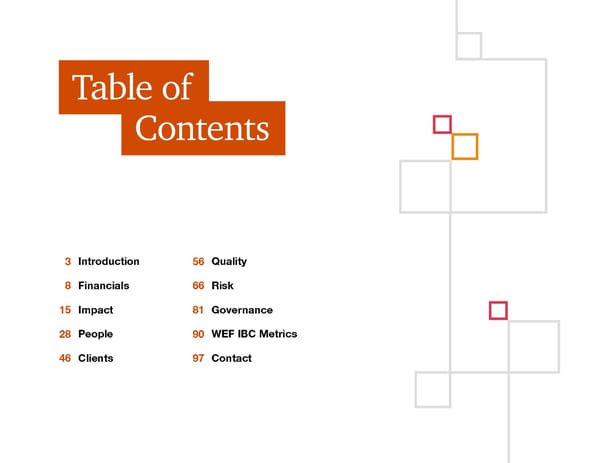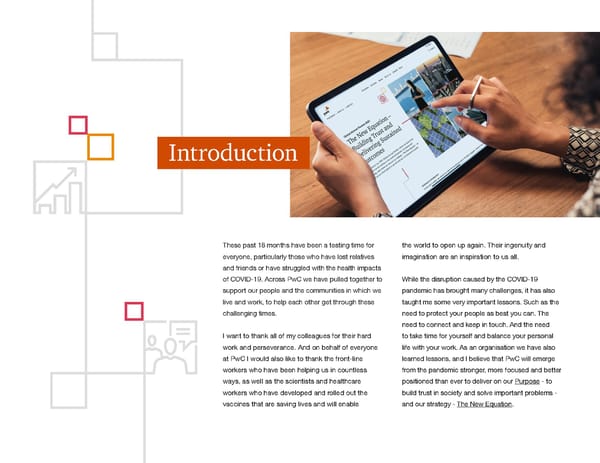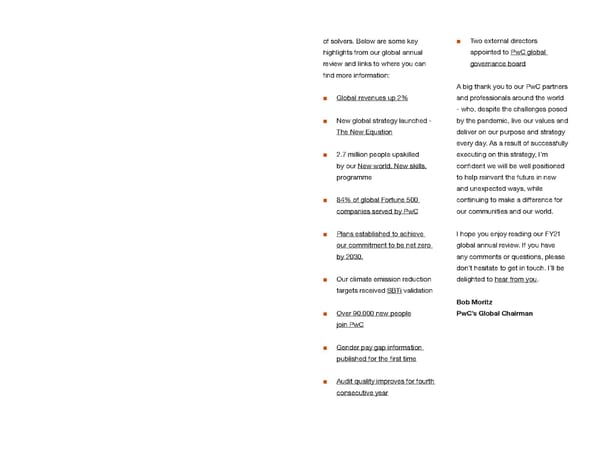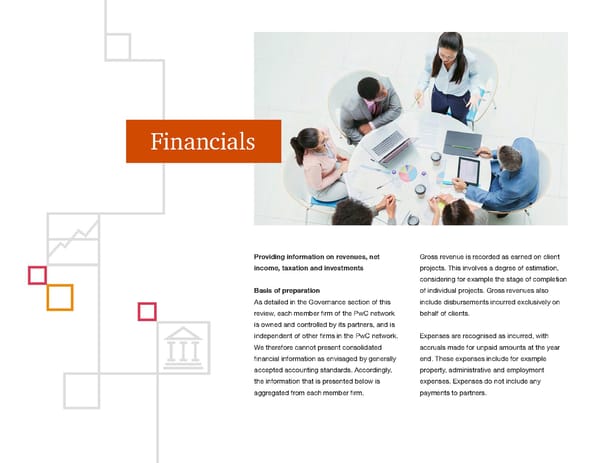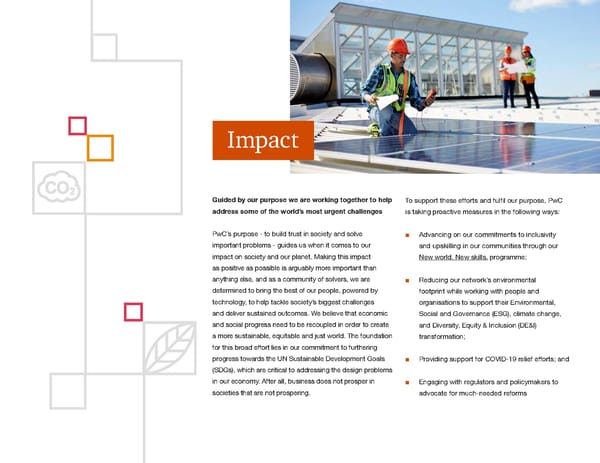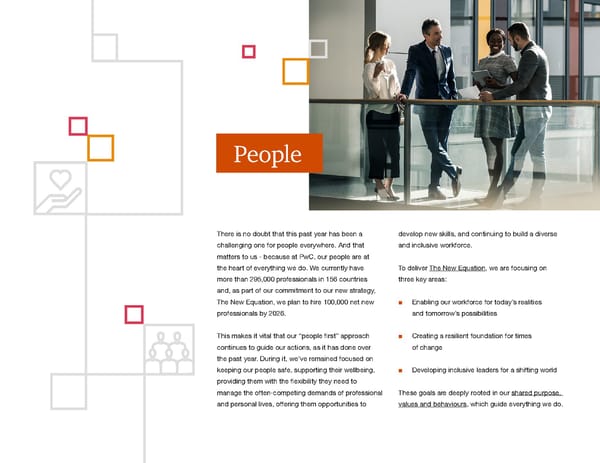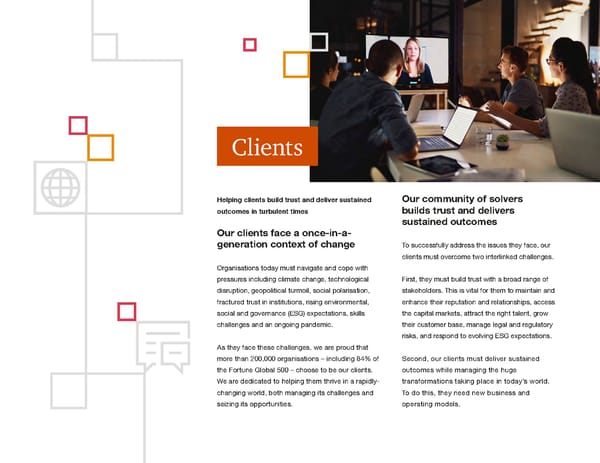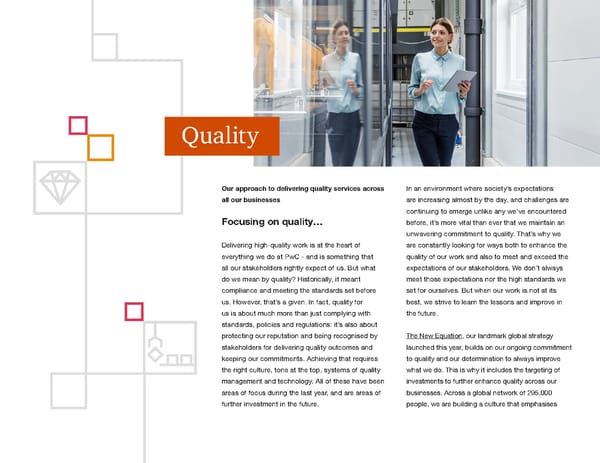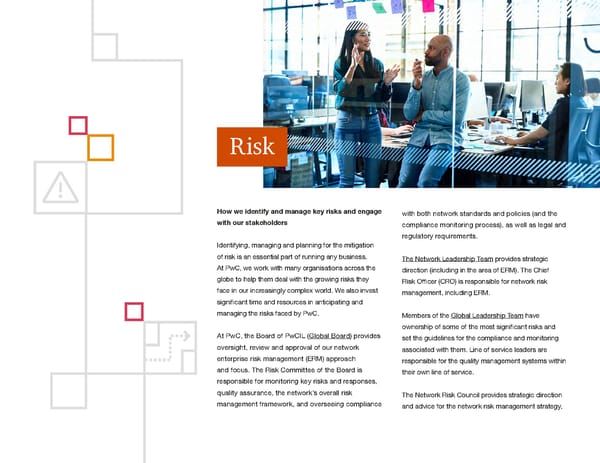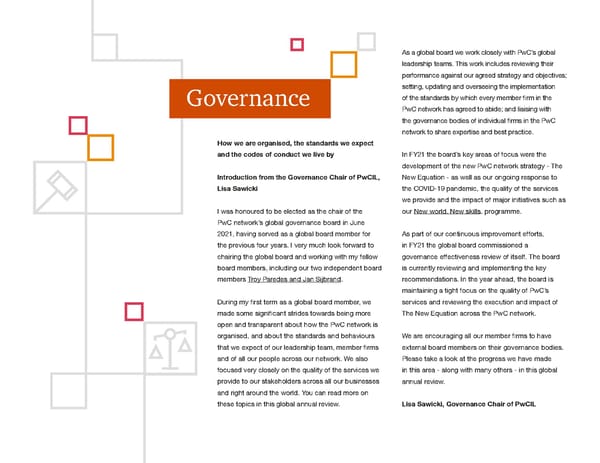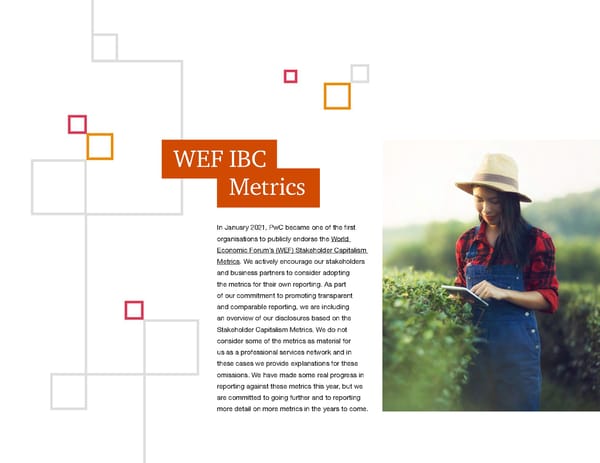Global Annual Review | PwC
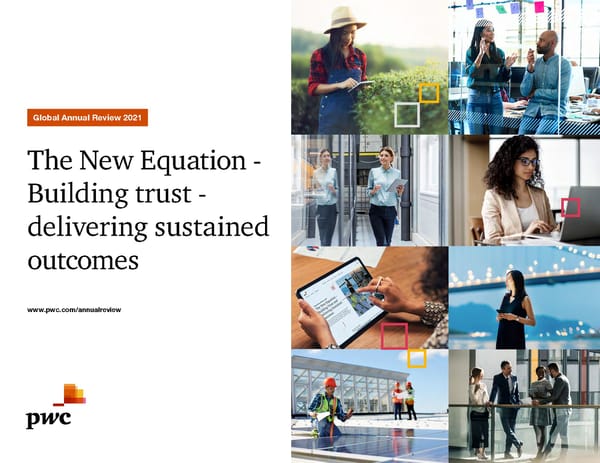
Table of Contents 3 Introduction 56 Quality 8 Financials 66 Risk 15 Impact 81 Governance 28 People 90 WEF IBC Metrics 46 Clients 97 Contact
Introduction These past 18 months have been a testing time for the world to open up again. Their ingenuity and everyone, particularly those who have lost relatives imagination are an inspiration to us all. and friends or have struggled with the health impacts of COVID-19. Across PwC we have pulled together to While the disruption caused by the COVID-19 support our people and the communities in which we pandemic has brought many challenges, it has also live and work, to help each other get through these taught me some very important lessons. Such as the challenging times. need to protect your people as best you can. The need to connect and keep in touch. And the need I want to thank all of my colleagues for their hard to take time for yourself and balance your personal work and perseverance. And on behalf of everyone life with your work. As an organisation we have also at PwC I would also like to thank the front-line learned lessons, and I believe that PwC will emerge workers who have been helping us in countless from the pandemic stronger, more focused and better ways, as well as the scientists and healthcare positioned than ever to deliver on our Purpose - to workers who have developed and rolled out the build trust in society and solve important problems - vaccines that are saving lives and will enable and our strategy - The New Equation.
In a year when economic conditions were tough, but interconnected needs we know every organisation I’m proud that PwC led with our values, taking faces: to build trust and to deliver sustained a “people ifrst” approach - prioritising wellbeing outcomes for all its stakeholders. and health while continuing to create jobs and opportunities for advancement. I’m also proud Our strategy, The New Equation, is about how PwC of the signiifcant investments we have made in brings together unique combinations of people, digitising the PwC network and upskilling our people powered by technology, galvanising ourselves over the past several years. These investments as a community of solvers to address those dual have not only empowered our people to continue challenges. The foundation of the strategy is our to deliver quality service seamlessly while working multidisciplinary model, which allows us to help clients remotely, but have also enabled us to recruit and build trust and deliver sustained outcomes by bringing onboard over 90,000 new employees across the together deep expertise across a broad range of network. Something that’s still hard for me to grasp capabilities. It is this combination of capabilities and is the idea that so many PwC professionals are yet the ability to look at things from different perspectives to set foot in a PwC ofifce. But they soon will, as we that is so essential to delivering high quality and real “Our strategy - The New Equation open up more of our ofifces around the world. While impacts for clients, stakeholders and society at large. - centres on how PwC is uniquely remote working has its beneifts, we are committed positioned to address the two distinct to giving people the opportunity to come together, The New Equation is more than just words on but interconnected needs we know build relationships and share ideas person-to- paper. We’ve committed to more than US$12bn of every organisation faces: to build trust person in a PwC workplace. investments over the next ifve years and the creation and to deliver sustained outcomes for all its stakeholders.” of over 100,000 net new jobs. These investments The New Equation include initiatives such as the establishment of Trust Bob Moritz, PwC’s Global Chairman Institutes based in the US and China. An incremental Prior to the pandemic we were already immersed US$3bn investment in quality. And the addition of in a conversation with thousands of clients and specialists in increasingly critical areas such as other stakeholders about the global trends and technology, digital, climate, strategic deals, leadership challenges they faced - things like technological and change, strategy, and supply chain. We are disruption, climate change, fractured geopolitics, focused on the actions we need to take to reposition social tension and the dissolution of trust in institutions - trends the pandemic only intensiifed our services and the skills we need to deliver for our and accelerated. We applied that “outside-in” stakeholders in the future. These initiatives translate into increased career opportunities for our people, perspective when laying out our new global growth for our operations and an enhanced ability to strategy in June 2021. It centres on how PwC is make a difference for our clients and stakeholders. uniquely positioned to address the two distinct
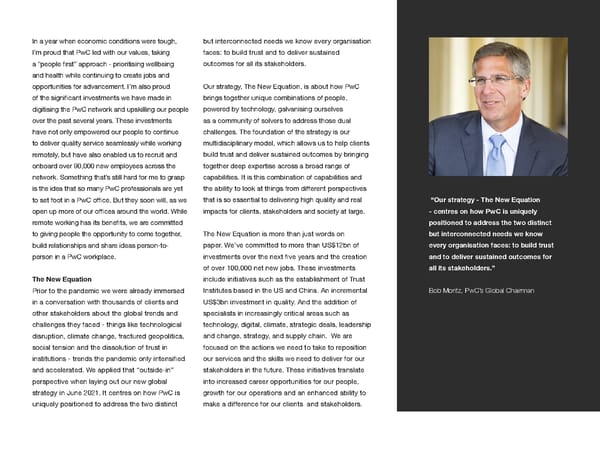
to the creation of trust - has broadened far beyond which were published in September 2020. As well In addition to delivering for our stakeholders and taking care of our people we have worked together the assurance we provide to shareholders on ifnancial as actively promoting the use of these metrics with across our network to develop The New Equation - statements, and now extends to looking at the needs our clients and stakeholders, we are comparing our an impressive achievement given the challenge of of a wide group of stakeholders and the impact that disclosures to these metrics in our global annual engaging virtually with thousands of stakeholders and organisations have not just ifnancially but socially review this year, so everyone can see how far we PwC leaders to test our ideas and ultimately launch and on the planet. This fundamental shift means our have come and how much further we have to go across the world. ability to protect data, make progress on diversity and on our journey towards greater transparency inclusion, and govern responsibly are all a part of how and accountability. To help build trust, an organisation must be worthy we build a trusted brand. of trust A further step forward is that we are providing more In order to help organisations build trust, PwC needs As a global network of ifrms, PwC has committed detail on how the PwC network is organised and the operation of the PwC Global Board. During FY21 I was to be a trusted organisation. At PwC we have a long- to transparency in a number of areas to build that standing reputation for trust that is built on ifnancial trust. For example, we have worked closely with delighted that Lisa Sawicki was chosen as the chair of reporting and compliance, but we know that trust the International Business Council of the World our global governance board, and for the ifrst time in goes much further than that. The concept of trust - Economic Forum in agreeing a universal set of our history we welcomed two independent members to that board. Having independent members on our including what drives trust and how we can contribute environmental, social and governance metrics
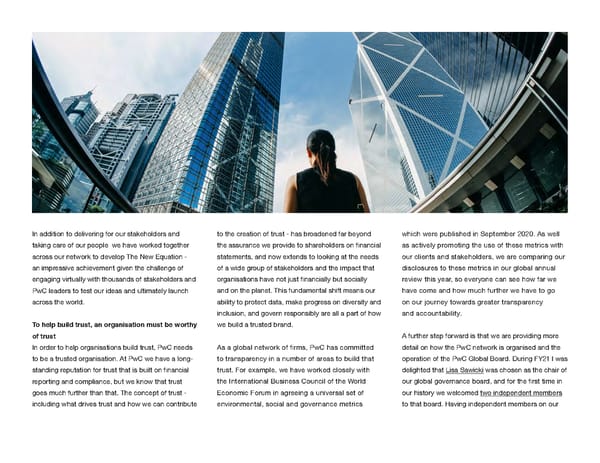
governance and oversight bodies is good practice revenues of US$45 billion for the 12 months to the end of and we are encouraging its adoption by our June – up by 2% on FY20. This was a solid result given member ifrms. the situation. Focusing on quality For the ifrst nine months of FY21 growth remained In an environment where society’s expectations relatively lfat. But as we neared the end of the year are increasing almost by the day, it’s more vital than demand started to pick up, and in the ifnal quarter ever that we maintain an unwavering commitment revenues rose by 18% compared to the same period in to quality right across our businesses. That’s why FY20. While some of this 18% growth is due to a very we are constantly looking for ways both to enhance dififcult last quarter in FY20, it also relfects other factors the quality of our work and also to meet and exceed including an increase in client needs for services such as the expectations of our stakeholders. deals and restructuring, the resilience of our ifrms around the world, and our preparedness to move quickly with We were proud to be the ifrst professional services the right people in the right places when demand started to pick up. With the launch of our strategy The New network to publish its audit quality inspection Equation, which helps us support our clients in building results - and I am happy to say that for the fourth trust and to deliver on the broad business issues they consecutive year our audit quality inspections show are facing, we project that our revenue growth will remain an improvement. While this is clearly satisfying, there is always more we can do and our new robust through FY22. strategy includes US$1bn of new investment speciifcally dedicated to the accelerated deployment In addition to reporting in more detail on our revenues by region and lines of business, we are also reporting this of technology to drive audit quality. In the future, year for the ifrst time some information on net income we believe that a step-change in audit quality will and taxation. Given our legal structure there is no basis to be achieved through a new partnership between consolidate member ifrm ifnancial statements, but we are people and technology. To help bring this about, we committed to improving transparency and to providing are investing heavily in advanced digital skills and increasing amounts of information for our stakeholders. AI-powered tools that are transforming the way our people and tech work together. With this in mind, I encourage you to take a look at the ifnancial report in this global annual review. Financial performance The economic conditions in FY21 remained Continuing progress challenging across the world for much of the year. Overall, I am proud of the progress we have made as a Overall, PwC ifrms across our network had gross global network of ifrms and a 295,000-strong community
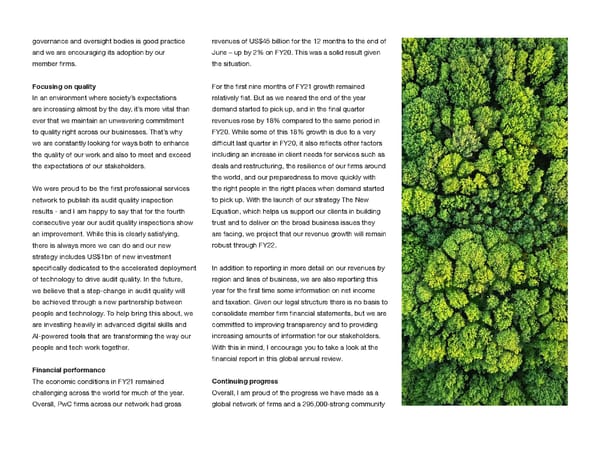
of solvers. Below are some key ■ Two external directors highlights from our global annual appointed to PwC global review and links to where you can governance board ifnd more information: A big thank you to our PwC partners ■ Global revenues up 2% and professionals around the world - who, despite the challenges posed ■ New global strategy launched - by the pandemic, live our values and The New Equation deliver on our purpose and strategy every day. As a result of successfully ■ 2.7 million people upskilled executing on this strategy, I’m by our New world. New skills. conifdent we will be well positioned programme to help reinvent the future in new and unexpected ways, while ■ 84% of global Fortune 500 continuing to make a difference for companies served by PwC our communities and our world. ■ Plans established to achieve I hope you enjoy reading our FY21 our commitment to be net zero global annual review. If you have by 2030. any comments or questions, please don’t hesitate to get in touch. I’ll be ■ Our climate emission reduction delighted to hear from you. targets received SBTi validation Bob Moritz ■ Over 90,000 new people PwC’s Global Chairman join PwC ■ Gender pay gap information published for the ifrst time ■ Audit quality improves for fourth consecutive year
Financials Providing information on revenues, net Gross revenue is recorded as earned on client income, taxation and investments projects. This involves a degree of estimation, considering for example the stage of completion Basis of preparation of individual projects. Gross revenues also As detailed in the Governance section of this include disbursements incurred exclusively on review, each member ifrm of the PwC network behalf of clients. is owned and controlled by its partners, and is independent of other ifrms in the PwC network. Expenses are recognised as incurred, with We therefore cannot present consolidated accruals made for unpaid amounts at the year ifnancial information as envisaged by generally end. These expenses include for example accepted accounting standards. Accordingly, property, administrative and employment the information that is presented below is expenses. Expenses do not include any aggregated from each member ifrm. payments to partners.
Revenue less expenses is a non-GAAP measure period in FY20. While some of this growth is due to which we call “net income”. This is not the net a very dififcult April-June in FY20, it also relfects an proift before tax which you may see reported increase in clients’ need for services in areas such by a corporation, because in some situations as deals and restructuring. As economies around the partnership agreements specify that certain world began to open up, we worked across the PwC expenses are for the account of the individual network to bring together teams of diverse experts partners and not for the member ifrm. An example enabled by the right technologies to provide clients is unfunded payments to retired partners. Such with innovative and imaginative solutions, and amounts are not included in expenses and are designed new products and services to meet and therefore excluded from net income. However, anticipate their changing needs. we believe this non-GAAP measure is useful in assessing the performance of the network Across our network, PwC is focused on delivering consistently over time. high quality services and products to our clients to help them build trust and deliver sustained Our performance outcomes, as they deal with the challenges and opportunities of a rapidly changing world. The “Our ifnancial performance in FY21 was Revenue regional growth numbers for the full year FY21 relfect solid, with growth in revenues across For the 12 months ending 30 June 2021, PwC the continuing effects of the COVID-19 pandemic the world of 2%. This performance ifrms around the world had gross revenues of and the consequent economic slowdowns. However, was driven by clients’ ongoing need US$45 billion (FY20 $43 billion) – up 2.0% in local as the year progressed, growth returned across all for assurance services and increasing currency and 4.9% in US dollars. This was a solid major regions and countries. demand for deals and restructuring work. result given the challenges faced by the global We invested $2.6bn in our people and our economy during the year. operations throughout the year, and as a result believe all of our businesses As a result of the pandemic and the largely remote are well positioned to take account of nature of the work undertaken during FY21, the economic resurgence in the year disbursements and expenses recharged to clients ahead - powered by our strategy, were down 34.0% on the prior year. US$45 billion The New Equation.” For the ifrst nine months of FY21 revenues Dana McIlwain, were lfat. But as we neared the end of the year For the 12 months ending 30 June 2021, PwC Chief Administrative Ofifcer demand picked up, with revenues in the April to ifrms around the world had gross revenues of June period up by 18.1% compared to the same US$45 billion.
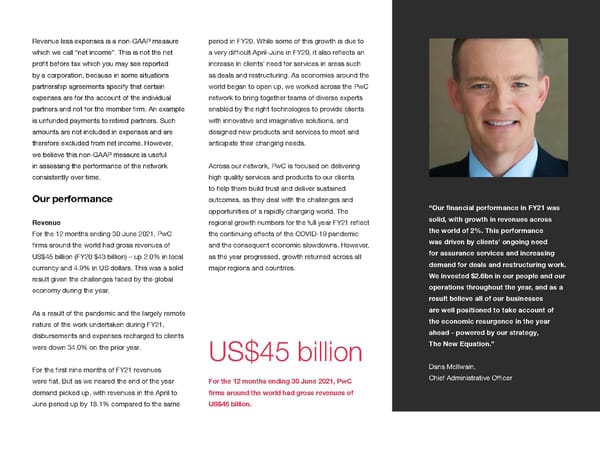
Aggregated revenues of PwC ifrms by geographic region (US$ millions) FY21 at FY21 FY20 at FY20 % change at ex. rates ex. rates % change constant ex. rates Total Americas 18,309 18,285 0.1 0.1 45,142 Asia and Asia Paciifc 8,862 8,104 9.4 6.2 Europe, Middle East and Africa 17,971 16,643 8.0 2.0 Gross Revenues 45,142 43,032 4.9 2.0 % change at constant exchange rates relfects local currency growth without the impact of US dollar exchange rates. Aggregated revenues of PwC ifrms by service line (US$ millions) FY21 at FY21 FY20 at FY20 % change at ex. rates ex. rates % change constant ex. rates Assurance 17,073 16,389 4.2 1.2 Advisory 17,029 16,092 5.8 3.1 Total Tax 11,040 10,551 4.6 1.7 45,142 Gross revenues 45,142 43,032 4.9 2.0 Expenses and disbursements (1,546) (2,268) -31.8 -34.0 on client assignments Net revenues 43,596 40,764 6.9 4.0 % change at constant exchange rates relfects local currency growth without the impact of US dollar exchange rates. FY21 revenues are the aggregated revenues of all PwC ifrms and are expressed in US dollars at average FY21 exchange rates. FY20 aggregated revenues are shown at average FY20 exchange rates. Gross revenues are inclusive of expenses billed to clients. FY20 ifgures have been restated to relfect current business structures in operation in FY21. As a result of this restatement, around US$1.4 billion of revenues previously reported in FY20 as part of Assurance and Tax are now reported under Advisory.
■ Europe, Middle East and Africa (EMEA) revenues America. Revenues were more buoyant at PwC Over the course of the year we saw a return to were up by 2.0%. In the UK, revenues rose by Canada where they rose by 5.1% growth in risk services. In particular, organisations 2.0%, in the Middle East, they increased by recognised the need for professional services to help 4.8%, and in Turkey revenues grew very strongly Each of our lines of businesses - Assurance, Advisory, manage risks exposed by COVID-19 and build on up by 30.0%. Across Africa our business wasand Tax and Legal - grew and developed in FY21. the increased momentum of digital transformation particularly impacted by the pandemic with triggered by the pandemic. We also saw strong revenues falling by 3.6% compared to the Assurance: Revenues from our assurance operations demand for our technology risk and transparency prior year grew modestly by 1.2% to US$17.1 billion (FY20: services, with organisations increasingly seeking US$16.4 billion). Audit remains the cornerstone external assurance over areas such as third-party ■ Asia Paciifc revenues grew by 6.2% a strong of our brand and the key driver for growth in our relationships, sustainability-related disclosures and performance from South Korea, which posted a Assurance business. Given the central role audit plays cybersecurity frameworks. year-on-year revenue increase of 12.3%. After a in maintaining trust in the capital markets and the challenging FY20 during which it saw revenues increasing ifnancial challenges our clients faced over Advisory: Revenues grew by 3.1% to US$17 billion shrink by 1.2%, PwC Australia returned to growth the year, our audit business retained its strong market (FY20: US$16 billion). This growth was driven by in FY21 with revenues up by 2.4% position. We continue to manage other market forces functional and enterprise-wide transformation, such as auditor rotation and increasing competition, where clients needed to access a broad set of ■ Americas revenues were lfat, relfecting the and we project continued steady growth for our capabilities from strategy-through-execution. signiifcant downturn in disbursements and audit operations in the years ahead. We are also Accelerated by COVID-19, we experienced expenses recharged to clients, which particularly seeing increasing demand for our assurance services particularly strong demand for technology-enabled impacted PwC US where revenues were static regarding non-ifnancial information such as ESG business transformation (ifnance, front ofifce, human year on year, and some challenging economic disclosures and expect signiifcant growth in these resources, supply chain) and cloud-driven digital conditions, especially across Central and South areas in the future. transformation as clients sought to build resilience
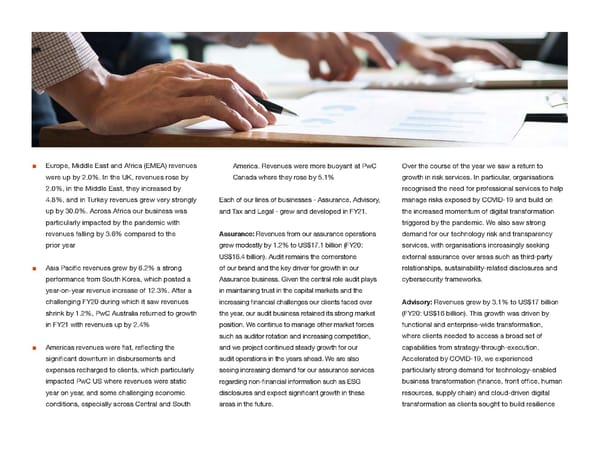
into their organisations. Increased deal activity many businesses faced in meeting their reporting beginning in the second quarter of the year drove obligations remotely throughout the pandemic - the additional opportunities focused on value creation changing tax landscape has also boosted clients’ and preservation, with clients seeking to maximise need for integrated compliance services. value from their transactions and any consequent restructuring. Despite the challenges posed by the Investments pandemic and the inability to travel, our advisory Investments are made by individual partnerships, or businesses across the world were able to bring may be made by groups of partnerships collaborating together a wide range of capabilities for clients in together. These investments cover technology virtual ways, helping them create value and build development, hiring of new partners and staff, the sustained outcomes for their stakeholders. training of employees and acquisitions. Tax & Legal Services: In FY21 revenues from our tax, Unlike companies, partnerships generally can make legal and people operations grew by 1.7% to US$11 investments only from current year income, or from billion (FY20: US$10.6 billion), against the backdrop of bank borrowings secured on future income. Therefore an increasingly complex and challenging environment, most investments are charged to the income driven by various factors including the impact of the statement in the period in which they occurred as an pandemic and local and global tax policy changes. expense. The treatment of acquisitions is dependent upon the individual partnership and acquisition, and As governments and businesses continue to varies from holding the asset in the balance sheet to charging the costs of the acquisition to the income negotiate the challenges of the pandemic and the resulting signiifcant increases in country deifcits, we statement over a period ranging from one to 10 years. are seeing growing demand for the PwC Tax & Legal Despite the heightened economic challenges of network to help clients navigate an increasingly complex tax landscape. Demand in FY21 was the past year, PwC has continued to prioritise ongoing investments in the future of our people, particularly high for Tax deals services and People & Organisation services, where we experienced new technologies, the quality of our work, and new products and services. Across the PwC network, an increasing need for transformation services as businesses reimagine their supply chains, we invested over US$2.6bn during FY21 following on from investments of more than US$3bn in FY20. operating models and workforce of the future. While we saw steady demand for Tax Reporting and This investment occurred despite a more cautious approach to overall spending and a smaller number Strategy services - principally around compliance of new partner admissions. and managed services, in light of the challenges
As part of our investment programme in FY21, PwC ifrms completed nine acquisitions (FY20: 3) and ifve strategic investments (FY20: 4) around the Percentage change in net income world - expanding our professional capabilities in key areas such as data analytics, tax technology and strategy consulting. FY21 FY20 Americas 19.3% 2.5% Net income Early in FY21, the prevailing uncertainty saw Asia Paciifc 15.3% -1.5% member ifrms take aggressive action to manage EMEA 21.1% -1.9% their cost base in order to ensure we could continue to protect as many jobs as possible. As a result Total 19.2% 0.3% of many PwC ofifces being closed, a reduction in % increase/decrease over prior year travel and lower entertaining costs, the overall cost base was signiifcantly lower than in the prior year. This was the case even after higher staff costs were taken into account, relfecting one-off payments other sources of income such as investment income. of tax paid by its partners on the ifrm’s income to be made by member ifrms in many territories to thank In most cases the partnership does not collect this 42% for FY21. their staff for their contribution and to assist them information and it is therefore not possible to estimate with remote working arrangements. with sufifcient accuracy taxes paid on the earnings Other taxes of each partnership. However, each member ifrm Each partnership pays a range of taxes including As a consequence of revenue modestly growing and has strict requirements for its partners not to enter employment taxes. We estimate that the total of expenses reducing, net income increased 19.2% into aggressive tax planning. As a result of this employment taxes paid by our largest 21 ifrms across over FY20 (FY20: increased 0.3% over FY19). speciifc characteristic of partnerships, whereby the the network is US$1.6 billion. payment of taxes falls to individual equity partners, Taxation partnerships in many jurisdictions do not have an Our member ifrms also pay a range of other taxes, obligation to pay corporate taxes. such as property taxes, or unrecoverable sales taxes. Income taxes It is our intention to provide more information on these A characteristic of partnerships is that payment of Some of our partnerships have attempted to calculate amounts in future years. the taxes on the income produced in the partnership the effective rate of tax that their partners are paying is an obligation of the individual equity partners at on the income that they earn and have disclosed this Balance sheet the marginal rates relevant to their total incomes, information in their own markets. An example is our Each partnership has its own assets and liabilities which consist of their PwC distributions plus any Australian ifrm, which has estimated the average rate on its balance sheet. These balance sheets are
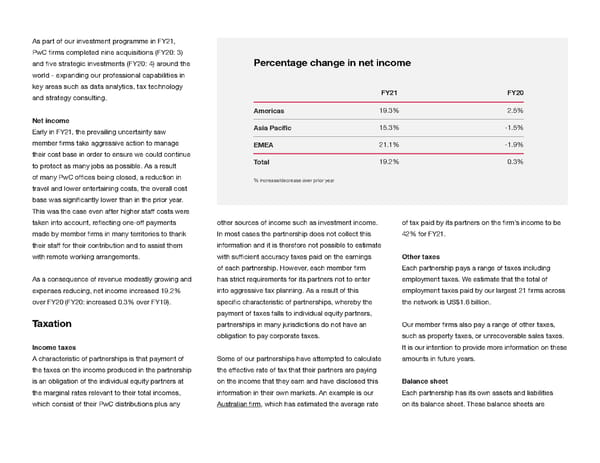
largest 21 ifrms were in receipt of any material payment Based on our experience up to the end of September supported by capital which is contributed by individual partners. Equity partners may be required from governments. Only one of our largest 21 ifrms took 2021, we expect our revenue growth in FY22 to to contribute extra capital based on changes in their part in a government scheme to furlough staff in FY21, outstrip FY21 as demand for deals and restructuring responsibilities, or because a partnership requires and even then for only a very small number of staff. services remains strong and companies look to additional capital to support anticipated organic and build for the future. We are also seeing increasing In future years we will collect and report information inorganic growth in the future. demand for our risk-related services and our broader on payments from governments from all PwC assurance work, as companies look to quantify and Assets are predominantly related to working capital member ifrms. report on not just their ifnancial performance but also (debtors and cash), technology and the ifxed assets their broader impacts on the planet and society. associated with our ofifces. Outlook Adequate banking facilities are maintained by each Economic growth is expected to rebound strongly partnership both to manage working capital and in our largest markets in FY22, creating a positive provide protection against eventualities that may be environment for professional services. reasonably expected to come about. In early FY21 many member ifrms negotiated additional banking Globally our economists expect growth to remain facilities in light of the uncertainty associated with strong through 2021. We project that global real GDP COVID-19. In most cases, the member ifrms did not will increase by around 6.1% by the year end in market require these facilities and net indebtedness is lower exchange rates, in stark comparison with the economic than at the end of FY20. turmoil of 2020, when global real GDP contracted by more than 3%. While we think economic growth will Payments from governments moderate in 2022, it will remain relatively strong, with With regard to our 21 largest ifrms, which are our main scenario projections estimating real GDP responsible for the generation of over 90% of our growth of around 4.3% in 2022. revenues, and with the exception of reliefs that are enacted with general applicability, no PwC ifrm was The pandemic has left organisations with an acute in receipt of any signiifcant or material payments need to repair, rebuild and reshape their businesses for from governments in FY21. the future. Our strategy - The New Equation - which is focused on helping build trust and deliver sustained With regard to speciifc payments or reliefs connected outcomes, and brings our capabilities together in a to the COVID-19 pandemic, again with the exception single community of 295,000 solvers, is designed to of blanket reliefs given to all businesses, none of our support clients as they do this.
Impact Guided by our purpose we are working together to help To support these efforts and fulifl our purpose, PwC address some of the world’s most urgent challenges is taking proactive measures in the following ways: PwC’s purpose - to build trust in society and solve ■ Advancing on our commitments to inclusivity important problems - guides us when it comes to our and upskilling in our communities through our impact on society and our planet. Making this impact New world. New skills. programme; as positive as possible is arguably more important than anything else, and as a community of solvers, we are ■ Reducing our network’s environmental determined to bring the best of our people, powered by footprint while working with people and technology, to help tackle society’s biggest challenges organisations to support their Environmental, and deliver sustained outcomes. We believe that economic Social and Governance (ESG), climate change, and social progress need to be recoupled in order to create and Diversity, Equity & Inclusion (DE&I) a more sustainable, equitable and just world. The foundation transformation; for this broad effort lies in our commitment to furthering progress towards the UN Sustainable Development Goals ■ Providing support for COVID-19 relief efforts; and (SDGs), which are critical to addressing the design problems in our economy. After all, business does not prosper in ■ Engaging with regulators and policymakers to societies that are not prospering. advocate for much-needed reforms
How we have impact and data to better coordinate and respond to emergencies. 20,938 buildings were mapped We believe that everyone at PwC should be able to by volunteers from PwC have a positive impact on society and the planet, both through the paid work we do for clients and beyond. ■ Pro-bono work. Across the network, we engage in a broad range of pro- and low-bono We deliver this support in three ways: projects that are conducted with the same combination of expertise and commitment that ■ Volunteering. Over 39,000 (FY20: 47,864) PwC we put into our client work. This work spans professionals volunteered to support their local support for small local charities through to communities in FY21 – a collective contribution national and global civil society organisations. of over 754,000 hours (FY20: 816,805). This year In 2021 our people continued to contribute we saw a reduction in the number of our people their professional skills to pro-bono support for who were able to volunteer as well as the amount charities and non-governmental organisations “Understanding our impact on the world of time that they were able to commit. This was (NGOs) worldwide. Many of these organisations is key to addressing the pressing issues due to the ongoing impact of the pandemic and are on the front line providing support to of today like climate change and building the many additional responsibilities, such as communities that continue to be affected by economies that work for all. We are home schooling, that our people had to manage the pandemic committed to net zero greenhouse gas on a daily basis. Despite the challenges of the emissions by 2030 and pleased that our pandemic we are very proud that over 39,000 of ■ Collaborating and policy engagement. emission reduction targets were recently our people volunteered this year, embracing the We believe that collaborating with other validated by the Science Based Targets opportunity to use technology to support their organisations to advance global public policy initiative (SBTi). We are proud of the work communities and share their skills virtually and dialogue is crucial to achieving the degree we are doing to reach net zero and the of system change now needed to recouple progress made in the last 12 months in ■ A great example is the work done by PwC China economic and social progress. We have played upskilling our communities around the and PwC Singapore, who participated jointly an active role on a range of public policy issues, world - but we know there is still a long in the Médecins Sans Frontières Missing Map including supporting the development of non- way to go.” Mapathon initiative to help solve the challenges ifnancial reporting standards and working with faced by the ifeldworkers in remote areas UNICEF in support of Generation Unlimited on Emma Cox, Global Climate Leader ‘missing’ from the digital map. This collaboration the skills agenda, as well as joining the Business brought together volunteers to put unmapped Ambition for 1.5C and the UN’s Race to Zero houses and buildings on the digital map. Local campaigns to demonstrate our commitment to and international NGOs can then use these maps achieving a net zero economy
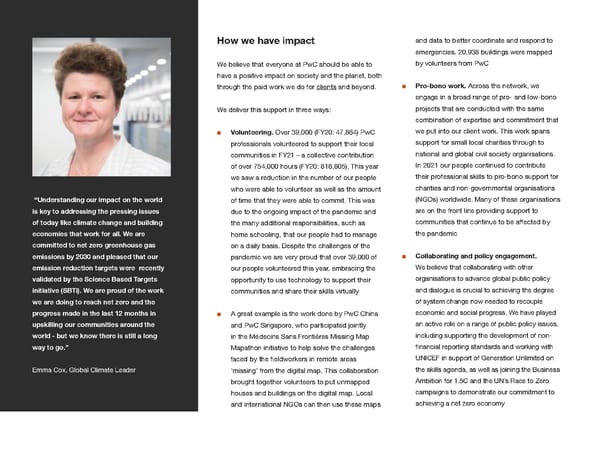
In October 2018, we set an ambitious global target for our community corporate responsibility programmes across our 21 Coming together in the ifght against COVID-19 largest ifrms: to invest in the future and growth of 15 million people, NGOs, and social and As the COVID-19 pandemic continues, we understand all their crisis management processes and micro enterprises to help them maximise their and appreciate the ifnancial burden that the crisis has repurposing their existing infrastructure and potential by 2022. We are proud to report that imposed on communities, and we have remained fully command centres, and converting them into we have surpassed this goal in 2021, one year committed to maintaining our ifnancial investments a crisis management unit - impacting over 80 ahead of schedule. as compared to 2020. Given the immediate needs of million people across 55 districts in the state. some communities, many of our territory programmes PwC India also worked to deliver citizen connect What we are focusing on: have pivoted completely to providing much-needed, and collaboration platforms to assist in gauging inclusivity & environmental on-the-ground support for direct COVID-19 relief. sentiment among citizens, as the authorities sustainability closely monitored people’s concerns The PwC network came together this year to support Operating in 156 countries, we consistently see our colleagues and their families in India, as well as ■ In the city of Guntur in Andhra Pradesh, two major societal challenges that impact every providing broader support to local relief organisations. PwC India partnered with the Department of region and society: inclusivity and environmental Donations were made from across our network to Horticulture (DoH) to assist 1,300 local farmers hit sustainability. When we talk about inclusivity, we provide oxygen concentrators, personal protective by the complete lockdown imposed as a result mean the need for people to have equal access equipment (PPE) and urgently-needed medical of COVID-19. PwC India worked with the DoH to to opportunities, resources and skills so that supplies to front-line hospitals and other health develop and optimise operations, safe harvesting everyone can achieve their full potential. When it facilities. Financial donations were directed to local (while maintaining COVID-19 protocols), comes to environmental sustainability, we focus and international NGOs to help them support the transportation and logistics management mainly on action to address climate change. most vulnerable individuals and communities across including last-mile delivery, helping farmers the country. PwC India worked closely with state market their perishable produce directly to Additionally, we believe there are underlying governments nationwide to combat COVID-19 in the households amid the lockdown. The programme, systemic issues that need to be addressed. following ways: which provided the farmers with 15% to 20% of That is why we are actively supporting a incremental income during the lockdown period, dialogue aimed at reshaping how market ■ In Madhya Pradesh, PwC India worked with proved to be a successful model for linking economies function, and ensuring the rules and the government as they set up a ‘COVID-19 farmers to consumers and vice versa - creating norms that govern corporate behaviour relfect Combating Centre’ in the city of Bhopal. PwC a sustainable and replicable business model for the priorities of the 21st century and help build India assisted the authorities in streamlining the future sustainable economies that work for everyone.
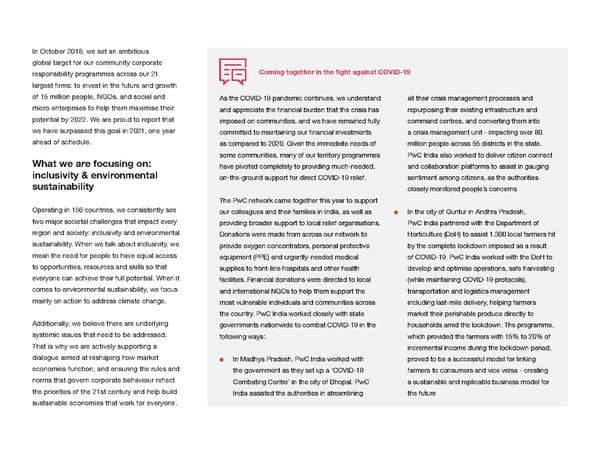
PwC’s efforts to engage with key stakeholders Inclusivity and skills is New world. New skills., through which we seek to to discuss how these issues affect us all include If we are to increase inclusivity and create an enable more people to gain the digital skills they will working with the Global Solutions Initiative economy that beneifts and serves the interests of need for success in the future. (GSI) - a global forum for different stakeholders society, we need to prepare people properly for and a network of world-renowned think tanks to the jobs they do today - and also the jobs they will New world. New skills: Upskilling communities collaborate on policy responses to major global do tomorrow. This is particularly true in the wake Our New world. New skills. initiative is aimed at problems addressed by the G20, the G7 and other of COVID-19, which has upended the livelihood addressing the mismatch between the skills people global governance forums. Our collaboration of millions of people around the world, exposed have today and those needed for the digital world. with GSI has grown out of the need to provide a structural weaknesses in institutions and economics, Of the 4.3 million people, NGOs and social and more integrated, coherent response to pressing widened existing disparities and hit the already micro enterprises we reached last year through our societal issues across different stakeholder groups, disadvantaged particularly hard. Simply put, the community programmes, over 50% (2.7 million) were including business. technological change now underway is of such involved in New world. New skills. initiatives. scope and speed that it requires an urgent global Part of our work with the GSI is in support of its upskilling effort, and - if left unaddressed - poses The jobs of the future will require skills that are harder Global Solutions Summit. This event helps business serious societal and economic risks. That is why we to come by for many, especially in communities where leaders and policymakers collaborate on issues of are committed to action that improves inclusivity and opportunities are scarce. Research ifgures paint a global importance, with a focus on bringing about enables more people to participate in and beneift stark picture. One-third of young people surveyed systemic change to ensure our economies deliver from the economy, and from societal progress more by UNICEF said they lacked opportunities to acquire sustained outcomes for societies. broadly. Our biggest global programme in this area skills for the future, and it’s estimated that around
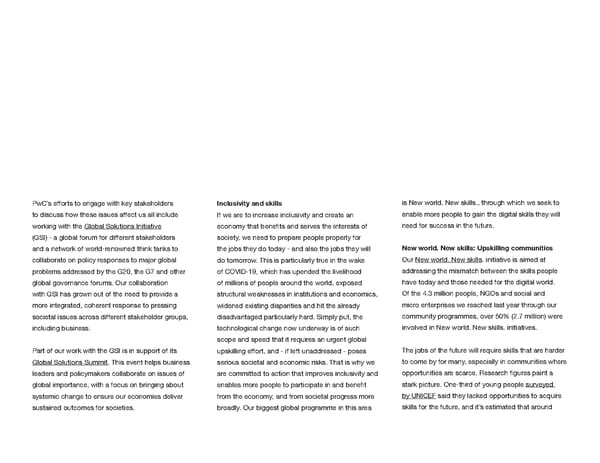
20% to 40% of the jobs currently held by 16-24 year they’ll need to reimagine their role and thrive in a olds are at risk of automation by the mid-2030s. Since post-COVID world. the start of 2020, as the pandemic has caused essential activities and services - including education, training and Also, addressing the United Nations General many jobs - to move online, the challenges for young Assembly, Bob Moritz discussed the role Generation people around the world to get or stay connected have Unlimited plays in upskilling young people and only increased. To help address the pressing global issue connecting them to opportunities for employment, of youth upskilling, PwC in 2020 announced a three- entrepreneurship, social impact and prosperity. year collaboration with UNICEF in support of Generation Unlimited. Our collective aim is to help upskill millions PwC is also a member of the World Economic Forum of young people around the world. We were proud to Reskilling Revolution, an initiative that aims to provide release a ifrst report, Stepping Forward: Connecting one billion people with better education, skills and today’s youth to the digital future, which calls for a new jobs by 2030. type of collaboration involving many parts of society - governments, global institutions, communities and youth - Addressing social injustice and discusses the stepping stones needed to help young people to cross the digital divide. PwC remains deeply committed to helping to end systemic racism and injustice around the world. Our collaborations address both global and local We have continued our efforts within our network upskilling challenges. In South Africa and India we are while also working with other business leaders and working with teams on the ground to develop and expand marshalling support and resources externally. current programmes. In South Africa we’re collaborating to support young women in developing Science, PwC US is proud to have co-founded the CEO Action Technology, Engineering, Arts and Mathematics (STEAM) for Diversity and Inclusion, a CEO-led business skills, with a focus on young people who are unable to community dedicated to supporting more inclusive receive a university education. In India we’re supporting workplaces. Since its launch, nearly 2,000 CEOs and Generation Unlimited - called YuWaah! in India - to help Presidents have pledged to support a more inclusive transform education, skilling and employment for India’s workplace for employees, communities and society at 300 million-plus young people. large. Collectively, the organisations involved employ nearly 13 million people across the United States. On World Youth Skills Day, Bob Moritz, PwC Global Chairman and Generation Unlimited’s Nadi Albino held a At the same time, through PwC US’s Skills for virtual dialogue session with young people to hear directly Society programme, our PwC US employees have how COVID-19 has impacted them, and discuss the skills worked with more than 300 NGOs. Using the skills
and experience they bring to client work, our people are helping these non-proifts digitally transform and address operational challenges, boosting their ability to tackle injustice in the US. Building inclusivity and upskilling communities PwC US has also recently committed US$125 million to help prepare 25,000 Black and Latinx college students for their business careers. The goal is to hire 10,000 students over the next ifve years to support Across our network, PwC member ifrms are having a positive impact, helping the ifrm’s efforts to attract a more diverse workforce to build inclusivity and upskill their communities through various initiatives. and to connect students to other organisations and Examples include: career opportunities. This commitment supports PwC’s global strategy, The New Equation, which looks ■ PwC China: Tech Carnival for rural students to create powerful new combinations through widely ■ Collaborating with Adream Foundation, an NGO, PwC China has different perspectives. been working to help close the skills and opportunity gap, developing curricula and programmes that provide quality education to students PwC UK is working with 25 black-led charities and in rural and underserved communities throughout China. Recently they social enterprises to support their work across a range delivered a ‘Tech Carnival’ to students from rural schools across Jiangxi of activities from helping pregnant women seeking Province, China. The carnival brought to life the importance of digital refuge in the UK to empowering school children from skills and design thinking for nearly 20,000 students ethnic minority backgrounds. In addition, PwC UK has formed a partnership with the Refugee Council to ■ PwC UK: Developing the skills of disadvantaged students, expanding help refugees in the UK get back into the job market their pathway to employability by providing training on employability skills, including ■ PwC UK’s Social Mobility Community Programme focuses on working on professional communication and interview supporting disadvantaged school students, undergraduates and other practice and also seeking out opportunities for groups who could beneift from greater social mobility such as refugees refugees to join PwC UK. and PwC UK Social Entrepreneur Club members. The programme brings together a community of PwC UK professionals, all of whom are passionate about delivering upskilling opportunities in their local regions
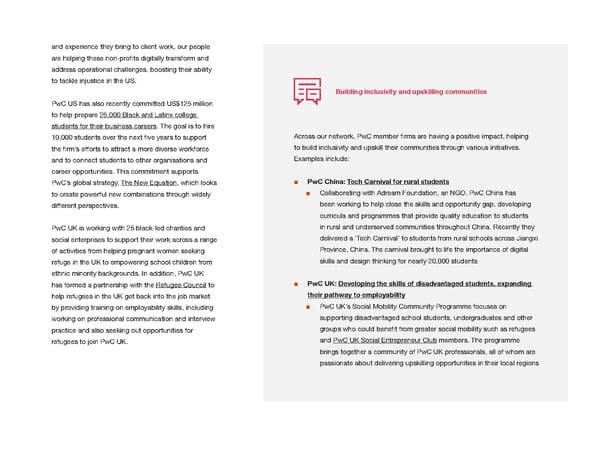
PwC Canada is a founding sponsor of The Onyx Initiative, resources, and working closely with educational us to transform our business model to decarbonise a non-proift designed to help Black college and university partners to support student placement our value chain, increase transparency, and support students join the corporate workforce. opportunities for Canada’s Black students. the development of robust ESG reporting frameworks and standards. The PwC network will also engage with Black students often contend with smaller professional Environmental sustainability clients and suppliers to support them in tackling their networks and a lack of mentorship opportunities. As and net zero climate impact. a result, talented candidates and future leaders are too often excluded from the recruitment talent pool. Environmental sustainability is a core focus PwC’s net zero commitment involves four key areas: The Onyx Initiative will support Black students and for PwC and we’ve been a proud signatory to recent graduates with coaching and online training on ■ Operations: We will reduce our greenhouse gas the UN Global Compact (UNGC) since 2002. important job-hunting skills, including crafting a cover emissions in line with what is required to limit warming We remain deeply committed to operating letter and preparing for a job interview. It will also to 1.5°C above the pre-industrial level, limiting the responsibly in line with the UNGC’s ten connect students with prospective employers, including worst impacts of climate change. This includes a 50% principles. PwC Canada. reduction in scope 1 and 2 emissions and a 50% Achieving net zero absolute reduction in business travel emissions from As an Onyx founding sponsor, PwC Canada is a 2019 base by 2030. In addition, we will accelerate As outlined in PwC’s global strategy, The New contributing substantial expertise and experience our transition to 100% renewable electricity. And to Equation, PwC has committed to achieving to further enhance and ifnalise the Onyx model. The net zero greenhouse gas (GHG) emissions by mitigate our impacts today, we will continue to offset commitment includes providing vital information, ongoing our emissions through high-quality carbon credits 2030. Our net zero commitment will require
■ Clients: We will work with our clients to support support our implementation of net zero-related their efforts to make a net zero future a reality for initiatives and provide a consistent framework for all. This will involve building on our existing client action. And provided a suite of guidance materials work in sustainability and net zero transformation to help our PwC ifrms produce their own internal roadmaps and strategic net zero plans ■ Suppliers: We will engage with key suppliers, encouraging and supporting their efforts to ■ Carried out milestone and progress mapping, achieve net zero. We commit that 50% of our enabling us to check that we remain on track global suppliers by emissions will have set their at both a global and local level own science-based targets to reduce their own climate impact by 2025 ■ Set the ambition to be fully aligned to a 1.5 degree scenario across our scope 1 and ■ Climate agenda: We will continue our 2 emissions as well as our largest scope long-standing programme of research and 3 emissions collaboration with business, policymakers and NGOs to accelerate the transition to a net ■ Committed to the Business Ambition for 1.5C zero economy and the UN’s Race to Zero campaigns Since announcing our net zero commitment in ■ Conducted an analysis of our supply chain and September 2020, we have been working with our set a target to work with suppliers that share our member ifrms to develop the foundations needed level of climate ambition for us to reach our 2030 commitment. ■ Extended our commitment to sourcing 100% For example, we have: renewable electricity to all of our operations in all 156 countries by 2030 ■ Put in place a global governance framework to ■ Developed an enhanced reporting framework support business ownership and accountability to include all PwC member ifrms and operations ■ Appointed Net Zero Business Leaders in each across our global network, as well as expand of our ifrms to support progress towards our what we measure and report to account for our global commitment wider climate impact. From 2023, we will report annually and transparently on our progress ■ Established global workstreams in core areas to towards our net zero targets
We continue to be active in the global climate across these areas. With the ongoing impact of the our ofifces and from our air travel. We report annually conversation and have recently: pandemic, we have seen our emissions reduce in on the areas of our environmental impact that are line with government lockdown measures in various most material to PwC, namely scopes 1, 2 and 3 ■ Joined the LEAF (Lowering Emissions by countries - and with our entire workforce continuing (air travel). As a professional services ifrm, our reliance Accelerating Forest ifnance) coalition, to support to work from home at various stages throughout the on natural resources and capital is relatively small what is expected to become one of the largest ever year, we have seen our scope 1 and 2 emissions compared with many other industries. Therefore we public-private efforts to protect our tropical forests decline by 13% and 27% respectively. Air travel do not report on our consumption of fresh water and (scope 3) is our largest source of carbon emissions, land use. ■ Become a champion for the WEF’s Clean Skies and, as expected, we saw a further reduction from for Tomorrow coalition to help advance and scale last year – of 92% – due to the continuing restrictions the production of sustainable low-carbon fuels on both domestic and international air travel. Our total GHG emissions have reduced by 80% from FY20 ■ Remained heavily involved in vital discussions levels, with our GHG emissions in FY21 being 87,500 about climate change issues, including tonnes CO2e compared to 432,372 tonnes CO2e in sponsoring New York Climate Week in September FY20. In FY21, we bought 83% of our electricity from 2021, and seconding two climate experts to renewable sources, taking us closer to our goal of Afifrming our approach to the Climate Champions team as it prepares for becoming 100% renewable by 2022 across our 21 emissions reduction targets COP26 in Glasgow in November 2021 largest territories (FY20: 71%). ■ Supported an open letter advocating policy We fully recognise the importance of actively reducing We have received validation for our change through our membership of the WEF the climate impact of our operational footprint today. climate targets from The Science Based Alliance of CEO Climate Leaders And to mitigate our impacts further as we work Targets initiative (SBTi). We were proud to towards our net zero commitment in 2030, we are receive the SBTi’s validation, which afifrms ■ Become a founding member of the Net Zero continuing to support a range of high-quality carbon our approach and timeline to achieve our Financial Services Providers Alliance, signing up reduction projects. These projects not only help us to emissions reduction targets in line with a to the Glasgow Financial Alliance for Net Zero reduce carbon emissions but also enable us to take 1.5 degree scenario. The Science Based commitments in September 2021 responsibility for our impact. The initiatives we are Targets initiative is a collaboration between supporting have collectively impacted more than CDP, the United Nations Global Compact, Addressing our impact today 77 million people, protected or restored 510,000 World Resources Institute (WRI) and the Our net zero commitment builds on our 2018 hectares of land, and created over 134,000 new full- World Wide Fund for Nature (WWF). environmental commitment to drive energy efifciency time jobs. Find out more about our offset projects. within our ofifces, switch to 100% renewable electricity and offset air travel (scope 3) emissions The biggest environmental impacts from operating from our 21 largest ifrms. We are making progress our business come from the energy we use to power
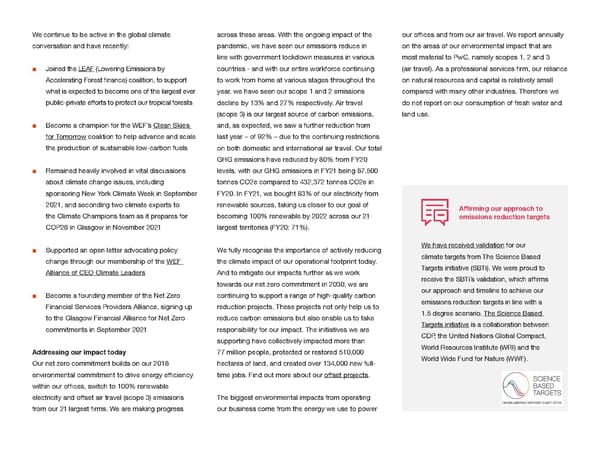
Taking steps to address climate change PwC Australia has, over a number of years, redesigned all of its nine ofifces to reduce emissions associated with ofifce energy consumption. Five ofifces have received an Australian Government National Australian Built Environment Rating System (NABERS) Rating of 5 Stars (“Excellent”) or higher. This includes our Sydney ofifce which, as part of the Barangaroo precinct, is committed to being carbon neutral and water positive and to create zero waste emissions. PwC Netherlands has implemented an internal price on carbon and is using the resulting budget to fund initiatives that help address the ifrm’s climate impact. In May 2021, the Environmental Footprints Insights app was released to help PwC Netherlands’ employees understand the impact of their mobility choices. The tool enables both management and employees to plan and carry out their projects more sustainably by tracking the carbon footprint associated with each project’s mobility. The funds generated from the internal carbon pricing have also been used to accelerate PwC Netherlands’ transition to an electric car lfeet and support the development of a new production facility for sustainable aviation fuels. PwC UK’s new ofifce in Belfast, its largest outside London, opened in July 2021 and was designed with sustainability and wellbeing at its heart. It is Northern Ireland's ifrst BREEAM Excellent building, utilising the previous building's existing frame to reduce embodied carbon, as well as consuming no fossil fuels through the use of 100% renewable electricity to heat and cool lfoors independently on a lfoor-by-lfoor basis, thereby maximising efifciency and energy utilisation. The ofifce incorporates meditation pods and offers employees daily exercise classes in Yoga and Body Combat, as well as physiotherapy and other wellbeing services. PwC Italy's new Milan ofifce - PwC Tower - opened in 2021 and houses over 3,000 staff. It was designed by the Studio Libeskind architectural practice following state-of-the-art building and sustainability criteria. The PwC Tower is LEED certiifed, has 270-square-meters of solar panels and charging stations for electric vehicles, and uses FSC-certiifed wood throughout. PwC Tower - Milan
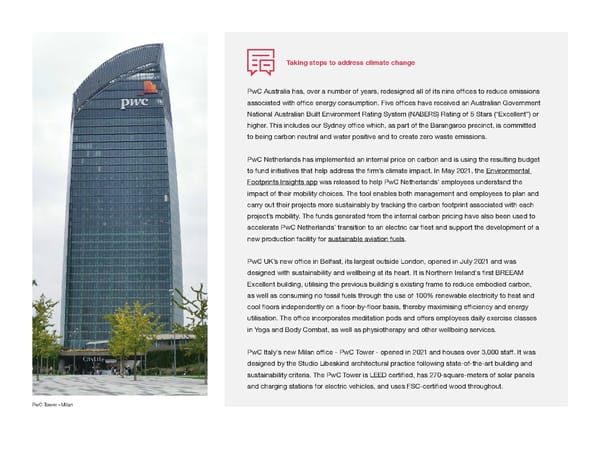
Enhancing corporate transparency International Sustainability Standards Board to Board’s Task Force on Climate-Related Financial through reporting reform set IFRS sustainability standards, the creation of Disclosures the Value Reporting Foundation, new guidelines ■ Responding to the SEC’s request for comment As part of our commitment to optimising our impacts from the SEC on climate disclosures, and the on climate change disclosures - providing on society and the planet and creating sustained publication of the EU’s Corporate Sustainability outcomes, we believe there is an urgent need for Reporting Directive. perspectives in areas such as rulemaking, systemic economic reform to reset incentives and minimum disclosure requirements and industry align economic interests with societal interests. This We have continued to work with a wide range of speciifcity, geography of disclosures, global conviction is at the heart of our active engagement in stakeholders on the quest to develop a common coordination, and assurance global debates about the future of corporate reporting , set of non-ifnancial reporting metrics. This has as we strive to build integrity and conifdence in the included being heavily involved in discussions ■ Helping to shape the application of the SEC’s capital markets. In our view, greater transparency and around the efforts of ifve leading standard-setting new principles-based human capital disclosures consistency in corporate reporting will empower all organisations for corporate sustainability reporting through publications and interactions with clients stakeholders - including shareholders, customers, - the CDP, CDSB, GRI, IIRC and SASB - to reach a and stakeholders employees, governments and civil society - to make common understanding. better decisions. ■ Responding to the IFRS Foundation’s consultation Examples of our work on reporting include: paper on sustainability reporting The past year has seen signiifcant progress on ■ Representation on the SASB, and network ■ Engaging constructively with the European this agenda, with key events - among others - including IFRS Foundation proposals to create an representation on the Financial Stability Commission on its draft proposals to reform
sustainability reporting, corporate governance response to disasters over the past 12 months: and investor transparency around ESG issues Healthcare and diagnostic services at Cox’s Bazar ■ Providing technical expertise to the European Refugee Camps, Bangladesh Financial Reporting Advisory Group and the Around 880,000 Rohingya refugees live in challenging European Commission in their preparations for conditions in Cox’s Bazar, Bangladesh, the world’s developing sustainability reporting standards, in single largest refugee camp. The Rohingya rely heavily line with international efforts on humanitarian aid and face persistent risks - as seen in the devastating ifre that broke out in March 2021, In addition, we have continued our collaboration with which damaged key health facilities and left many the World Economic Forum International Business homeless. This situation was further exacerbated Council (WEF IBC) to promote the universal set of in July 2021 when thousands of people were made ESG metrics that it published last year. Following the homeless by lfooding after monsoon rains inundated publication of these WEF IBC metrics in September refugee sites in southern Bangladesh. “Reporting has to change, and change 2020, over 90 organisations, including PwC, have fast. It took decades of creative, inclusive publicly committed to reporting against these metrics. Working with a local NGO, Health And Education For All discussion and experience to get to the For the ifrst time, PwC has included a report on its (HAEFA), PwC supported efforts to establish healthcare clear and widely accepted standards we own progress against these metrics in this year’s centres in the Kutupalong and Balukhali camps. These have today for ifnancial reporting. We global annual review. healthcare centres, which were procured through Better need to get to the same level of clarity, Shelter, provide access to quality healthcare services, speciifcity and trust around non-ifnancial We also continue to engage with major global free of cost, to refugees and the host population. In metrics - but within a couple of years, not organisations including the G20, OECD, UN, EU. response to the ifre outbreak in March 2021, PwC is a couple of decades.” And we welcomed the supportive statements made supporting the enhancement of these healthcare units by both the G7 and the G20 on the imperative to to treat burn survivors. Between September 2020 and Bob Moritz, cooperate and collaborate on establishing common June 2021, over 137,700 visits to the unit took place. PwC’s Global Chairman globally accepted non-ifnancial reporting standards. Understanding the need for the expansion of health Stepping up in times of need services, PwC is supporting the setting-up of a pathology lab by HAEFA which will provide services free When catastrophic events, natural disasters and of cost for patients at Balukhali camp and subsidised humanitarian crises occur, our foundations and ifrms services to other health institutions in the camps. Water, around the world do whatever they can to help the sanitation and hygiene facilities for patients and frontline people and communities affected. Here are some healthcare staff have also been supported by PwC. examples of the assistance we have provided in
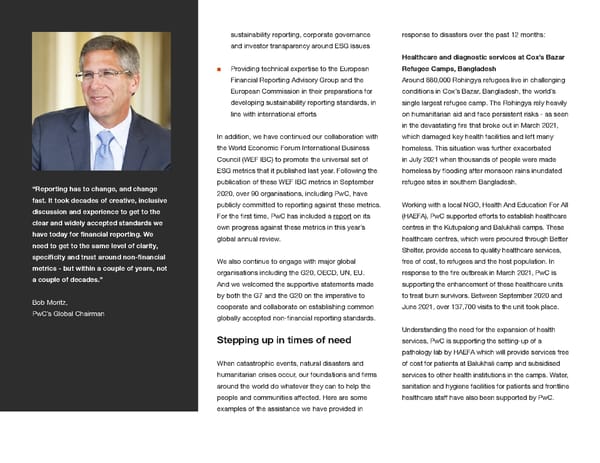
COVID-19 response in Afghanistan and Tajikistan Financial support for earthquake relief in Haiti facility serves more than 15,000 individuals from PwC’s Global Ofifce for Humanitarian Affairs procured On 14 August 2021, a 7.2 magnitude earthquake Kawergosk town and surrounding villages. PwC is 100 temporary shelter units from the social enterprise caused widespread damage and signiifcant loss supporting the expansion of the PHCC to ensure Better Shelter to set up temporary extensions for 24 of life in south-western Haiti. The then-Prime local people can continue to beneift from its services healthcare facilities in remote areas. These facilities Minister called a month-long state of emergency while frontline health workers can continue working are supported by a leading international development as international aid agencies mobilised to provide in a safe, secure and sanitised environment. The agency, the Aga Khan Foundation (United Kingdom), in humanitarian support to those directly affected by expanded facility will be operational in early 2022. regions including Afghanistan and Tajikistan. They are the earthquake. PwC’s Caribbean region engaged its being-used for triaging, testing, treating, and raising staff, who wanted to support their local community. COVID-19 awareness. This resulted in a US$50,000 donation being made to local relief agencies, raised through a combination This initiative is continuing to help contain the virus by of contributions from staff as well as a donation from preventing the spread of the infection to other wards PwC Caribbean ifrms. within the hospitals, and providing sanitised and isolated spaces for targeted treatment and waiting areas. Expansion of Kawergosk Primary Health Care Centre in Kurdistan Region of Iraq Humanitarian support and environmental Political instability, conlfict, economic crises, and restoration, Greece the COVID-19 pandemic have severely damaged In early August 2021, wildifres in Greece devastated Iraq’s healthcare services delivery capability. While many parts of the mainland and neighbouring island refugees and displaced persons in Iraq can access of Evia - a catastrophe described as a “natural free primary healthcare services through camp-based disaster of unprecedented proportions”. primary health care centres and in public health facilities for those living with host communities, limited The PwC Greece team immediately reached out to funding and the pandemic have resulted in increased the Greek Government to offer its support. That offer pressure on health facilities. PwC, in collaboration was accepted - and today, the PwC Greece Advisory with UNHCR, the UN Refugee Agency, is supporting Leader, Kyriakos Andreou, is leading a large-scale pro- the expansion of a primary health care centre in bono initiative for the Government. The project involves Kawergosk that is serving vulnerable displaced the PwC Greece team undertaking humanitarian people, refugees and host populations. support and environmental restoration as well as animal relief projects, with an army of PwC volunteers The Kawergosk Primary Health Care Centre (PHCC) standing by ready to provide their skills and time to is a public health facility located in the town of Dispensing medicines at our medical camp in Balukhali Cox's Bazar. help with the rebuilding efforts when the time is right. Kawergosk, 35 kilometres from Erbil. The existing © Better Shelter 2018
People There is no doubt that this past year has been a develop new skills, and continuing to build a diverse challenging one for people everywhere. And that and inclusive workforce. matters to us - because at PwC, our people are at the heart of everything we do. We currently have To deliver The New Equation, we are focusing on more than 295,000 professionals in 156 countries three key areas: and, as part of our commitment to our new strategy, The New Equation, we plan to hire 100,000 net new ■ Enabling our workforce for today’s realities professionals by 2026. and tomorrow’s possibilities This makes it vital that our “people ifrst” approach ■ Creating a resilient foundation for times continues to guide our actions, as it has done over of change the past year. During it, we’ve remained focused on keeping our people safe, supporting their wellbeing, ■ Developing inclusive leaders for a shifting world providing them with the lfexibility they need to manage the often-competing demands of professional These goals are deeply rooted in our shared purpose, and personal lives, offering them opportunities to values and behaviours, which guide everything we do.
Enabling our workforce for today’s of virtual team activities, ranging from cookie decorating realities and tomorrow’s possibilities contests to iftness challenges and virtual lunches. At PwC, we are enabling our people to have – and Just as our ways of working have changed, so we are deliver – a high-quality experience. To achieve this, we now coaching people in new ways too. During the are actively building the right mix of team members, skills times when quick chats over lunch or while walking and approaches that ift today and lfex for tomorrow. between meetings were not possible, we needed to help our people approach coaching with a new The evolving world of work and how we mindset and make it more intentional than ever before. are responding By increasing access to upskilling opportunities in The world of work is always evolving. But its evolution different types of coaching, our staff and partners are has accelerated rapidly in the past year, opening up encouraged to integrate coaching conversations into opportunities for both PwC and our clients to learn their everyday connections, in person or virtually. lessons and encourage new ways of working. “Our 295,000 colleagues around the Take the example of our assurance practice. After shifting world are our greatest asset and the While remote working clearly has many beneifts, we to fully remote working, many team members were foundation for our success. Through also recognise the importance of coming together in ning that themissing the collaboration and on-the-job lear delivering our strategy, The New Equation, person to build relationships and share ideas. That is physical audit room had historically provided. To create we are creating incredible opportunities why many of our member ifrms are moving towards a lfexible workplace that fosters an environment where for our people that will enable them to a hybrid working model tailored to their local market mentoring and coaching happen in the course of daily achieve their potential, build rewarding conditions. Several of our ifrms, including the UK and work, our assurance teams created virtual audit rooms and sustainable careers and become Africa, have enhanced their lfexible working policies to – digital ‘hangouts’ – where team members and clients inclusive leaders.” provide their partners and staff more choice over how, could come and go at the click of a button. where and when they work. These policies are built on Betty Ann Jarrett, two-way lfexibility and the trust that each individual will Not only did the virtual audit room create a sense of Global Human Capital leader work in a way that suits them while also meeting the belonging and foster connectivity, it also provided a safe needs of their teams, the wider ifrm and our clients. space to ask questions and absorb some of the dialogue and informal coaching that happens organically when We also recognise that extended periods of remote team members are in the same physical location. Our working can lead to feelings of isolation. To combat experience across the PwC network shows that virtual this, our member ifrms have established mechanisms to audit rooms encourage our people to be transparent, ensure our people feel connected while working virtually. lfexible and inclusive as they work together to deliver For example, PwC Malaysia runs an ongoing programme the highest quality for our clients.
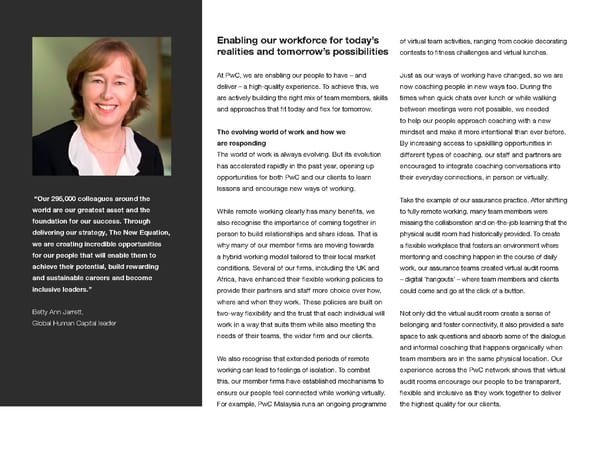
Hires by region broken down by line of service and gender Global line Gender not Region of service FY21 hires Hire rate Female Male declared Americas Advisory 5,493 32.8% 42.0% 57.7% 0.31% Assurance 9,374 35.9% 49.5% 50.4% 0.15% Internal ifrm 3,184 26.4% 51.1% 48.8% 0.13% services Tax 5,119 31.6% 51.7% 48.1% 0.20% Asia Paciifc Advisory 12,263 42.4% 40.6% 59.3% 0.08% Assurance 17,676 43.4% 57.3% 42.7% 0.03% Recruiting for today and tomorrow To turn The New Equation into Internal ifrm 2,464 28.0% 59.6% 40.4% 0.04% services reality we have committed to create 100,000 net new jobs in the next Tax 4,192 27.8% 57.3% 42.7% 0.02% ifve years, with a clear emphasis EMEA Advisory 7,899 26.9% 38.2% 61.8% 0.03% on hiring specialists in increasingly critical areas such as technology, Assurance 14,434 27.8% 47.6% 52.3% 0.01% digital, climate, strategic deals, Internal ifrm 3,555 0.00% leadership and change, strategy, services 19.6% 52.7% 47.3% brand building and supply chain. Tax 4,620 20.3% 55.1% 44.9% 0.00% Despite the challenges of a year dominated by the pandemic, our Total 90,273 31.5% 49.2% 50.7% 0.07% recruiting efforts continued without pause in FY21, and we welcomed 90,273 new joiners (FY20: 81,552), including 24,800 interns.
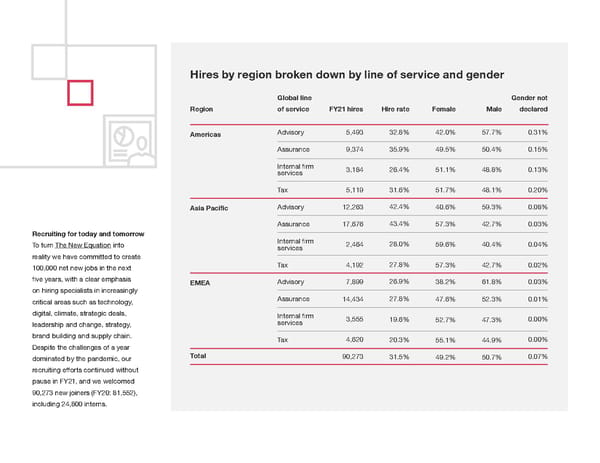
Driven partly by the limitations on face-to-face – wherever they are in the world – while also meetings, our member ifrms are increasingly ifnding providing our people with valuable professional new and innovative ways to connect with potential development experiences. Unsurprisingly, candidates. The UK ifrm created Virtual Park, a virtual the travel and border restrictions that many reality space where potential candidates create governments imposed in response to the pandemic an avatar to interact with PwC recruiters, partners inevitably led to a reduction in international mobility and staff in a variety of settings – an auditorium, a activity over the past year. The total number conference room, an event hall and even a beach – of new international moves in FY21 was 1,052 to learn more about opportunities and ifrm offerings. (FY20: 2,938). These moves took place across 95 Not only has this been a creative way of navigating countries (FY20: 114 countries) and with 42% of pandemic restrictions but, more importantly, moves undertaken by women (FY20: 44%). this medium enables us to expand our reach to universities at which we previously may not have As we move into FY22, we anticipate being able to had a physical presence. mobilise more staff at scale to move internationally. "The virtual audit room makes it easier This, along with continuing to capitalise on our to coach and to speak up while working Our recent hires are ifnding the experience of working new ways of working virtually across borders, will remotely. Even more importantly, it is a at PwC to be a positive one. In both our annual Global enable us to bring together a broader community tool that keeps me socially connected People Survey and the Global New Joiner One-month of solvers to help our clients build trust and achieve with my teams" Survey, staff who have been with us for less than sustained outcomes. one year gave the highest scores in 11 years. This Pascal Wagemakers, relfects improvements we made to deliver onboarding Senior Associate, Netherlands in a virtual environment, which increased the quality, consistency and inclusivity of the experience, and put a particular focus on the pre-hire experience (from offer acceptance through to start date). Together, these improvements are helping new joiners to feel better prepared, know what to expect, and feel connected through using Look Inside - PwC’s online 1,052 community for pre-hires. Staff mobility PwC’s long-established international mobility The total number of new international programme helps us meet the needs of our clients moves in FY21 was 1,052 (FY20: 2,938).
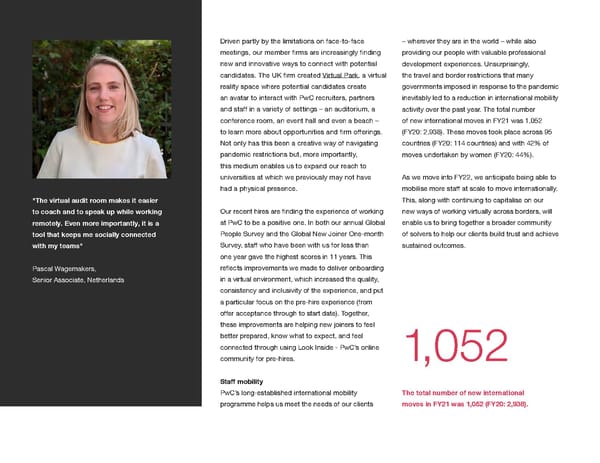
Creating a resilient foundation for Our leaders have been prioritising regular connectivit y times of change with employees – and this seems to be bearing fruit, with our leadership effectiveness scores increasing i n At PwC, we are building a strong and lfexible a number of areas. For instance, 72% of respondents foundation for our people and our network through say the leaders they work with make a point of being the values, systems and healthy habits that enable transparent with information. Furthermore, 70% report our people to conifdently navigate the evolution having personally relevant discussions with their of our business and live up to our ambition of leaders around their development and 92% say that The New Equation. the feedback and coaching they receive allows them to make immediate improvements in their performance. Maintaining a positive, healthy, and engaging workplace While we are proud of our Global People Survey In order to build a resilient foundation for the future, results, we know we can always do better. For we are working to reinforce a positive workplace example, the results have also highlighted a clear where our people feel empowered and supported need to remain focused on improving employee “As a new joiner, I felt a bit nervous, in their careers. In FY21, we re-launched our annual wellbeing, especially as the pandemic continues to especially starting in a virtual world with Global People Survey after a temporary pause in FY20 impact our lives. While 72% of survey respondents people I had never met before. However, in favour of more local, real-time feedback during the say they are able to talk to their teams and leaders I felt conifdent because the training pandemic. The survey is a great indicator of how our about the support they need, only 50% of these period led by the instructors was people feel about working at PwC. It reveals insights respondents currently feel they can both have a insightful. My ifrst ofifcial engagement that help our leaders understand where we’re doing healthy lifestyle and also be successful at PwC. was the best I could have possibly asked well and identify areas that need more work. This is a mismatch we need to address. for. The team was extremely kind and friendly and made it so easy to reach out This year we adopted a new People Engagement Developing inclusive leaders for to them if I needed help. Starting a new Index that focuses on more personalised aspects a shifting world job is always nerve-racking, but PwC of the engagement experience. The index serves as has shown me that it is really home away an overall litmus test for how our people are feeling We have a long-standing commitment to inclusion from home. I love it here.” about PwC, and the early results have been very and diversity (I&D) as a means of delivering on our positive, with 77% of our people having a favourable purpose and strategy. We can only solve the world’s Anonymous feedback from New Joiner One- impression of PwC. Additionally, 84% of survey most important problems if we have diverse teams month Survey. respondents are proud to work at PwC and 74% and foster a culture of inclusion and transparency. enjoy working at PwC and would recommend it as a Knowing this ambition needs to be driven from great place to work. the highest levels, we appointed a
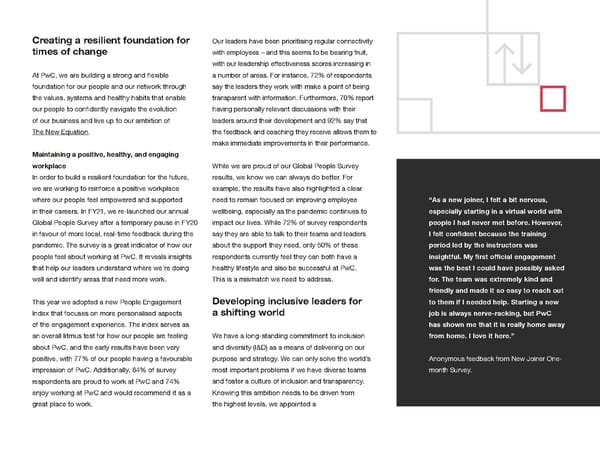
Caring for the wellbeing of our people The health, wellbeing and safety of our of their calendars. The US ifrm has an people continues to be a top priority. We initiative to help teams adopt healthier recognise that further progress in enabling working patterns that includes a 25% a healthy lifestyle for our people requires meeting reduction target and no-video sustained focus on achieving a systemic Fridays. Our Middle East ifrm launched a change in how we work. It also requires ‘Block your o’clock’ initiative that provides targeted actions and interventions when our its people with ideas and mechanisms people need them most. to take control of their calendars to help improve time management and productivity During the past year, mental health has been while reducing stress. a key focus for our network, with many ifrms “This is the second time I have attended offering a variety of programmes to meet But the health and happiness of our people a session and I think it’s really helpful and the needs of their people. For instance, is not only about their mental health. In very relevant. I’m pleased that PwC is PwC Canada offers a Mental Health First October 2020, PwC South Africa launched taking mental health education seriously Aid training programme that focuses on a gender-neutral domestic violence policy. and working to foster an environment recognising the signs and symptoms of It provides support to people at the ifrm where partners and staff can have open mental health issues, how to care for our experiencing or recovering from domestic discussions about mental health.” own mental health and wellbeing, how to and/or gender-based violence, which identify if someone needs help, and our role has been on the rise since lockdown Rick Osuna, in supporting others. Since the programme’s measures were put in place. The policy Senior Vice President, Deals, PwC Canada launch in 2020, over 1,400 staff and offers emotional and legal counselling, partners have attended at least one session, additional leave (to ifle police reports, ifnd with some returning for more. new accommodation, attend court hearings, etc.), and an advance on salary should the Formal programmes have also been victim have to move home. implemented to help people regain control
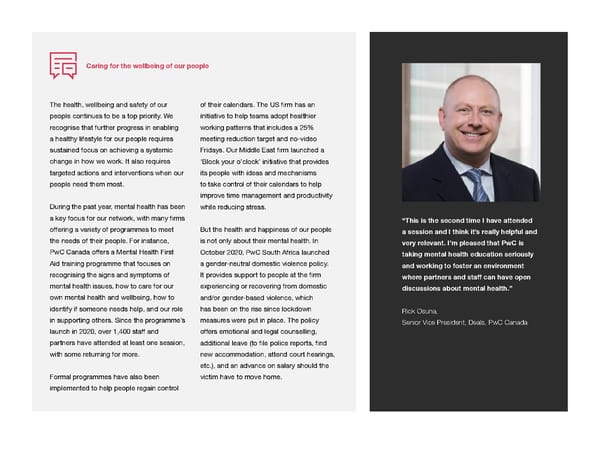
Global Inclusion and Diversity Council in 2020 that are essential to building trust and delivering are actively building a diverse and inclusive work made up of ten PwC leaders and chaired by our sustained outcomes for our clients, while also environment, and 71% felt that Territory Leaders are Global Chairman. In FY21, the Council focused on creating a culture of belonging for our people. One taking appropriate actions to support the I&D agenda. connecting with allocated territory senior partners to of the investments we are making to bring this to life ensure that local I&D goals are aligned with those of is the launch of the Inclusive Mindset curriculum in Supporting and advancing women the network. I&D metrics such as the proportion of September 2021. Sponsored by our I&D Council, this Gender equality remains a priority focus. We are promotions by gender and the percentage of female curriculum aims to help learners build understanding particularly mindful of the disproportionate impact partner admissions were also drafted, and will be of the essential inclusion and diversity constructs that that the global pandemic has had on women, who are used in the future to ensure accountability. will help them to shift their mindset, and to explore now also bearing a greater burden of childcare and both the key human skills essential to practising housework alongside paid work. Inclusion and diversity in a more inclusive behaviours and also the best ways to shifting world improve their leadership skills. We continue to focus on providing women with opportunities to develop, progress and reach their Developing inclusive mindsets Listening to our people full potential. This includes ensuring higher female As part of The New Equation, we need to actively When we surveyed our people, 73% told us that they representation at senior grades, particularly director develop the inclusive mindset and leadership skills felt they ‘belong’ at PwC, 74% said their leaders and partner levels. While many PwC ifrms across our network have their own territory-speciifc programmes in place, achieving balanced gender representation remains a challenge and we have not made the Percentage of female leaders progress that we would like. This is despite the fact that we have equal representation of women across FY21 FY20 FY19 FY18 FY17 our entire global workforce and more women globally Global board 39% 39% 33% 33% 33% at entry-level grades. Network leadership team 0% 0% 0% 0% 0% Global leadership team 36% 40% 40% 47% 50% Global relationship partners 17% 16% 14% 16% 14% Strategy council 5% 0% 0% 0% 5% Partners 22% 22% 21% 20% 19% 73% Internal partner admissions 29% 29% 30% 30% 27% When we surveyed our people, 73% told us that they felt they ‘belong’ at PwC.
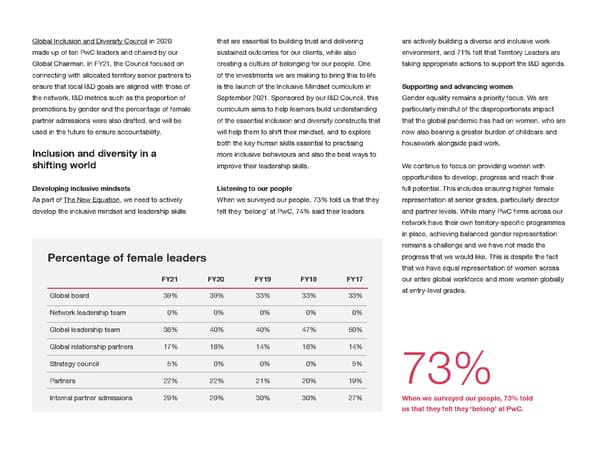
While we have increased the number of female members on our global board from seven to eight with Lisa Sawicki recently selected as our global board chair, we still need to increase female representation further in our global leadership groups. We are working actively with our member ifrms on issues such as leadership pipelines in order to address this and are seeing incremental changes year-on-year at local senior leadership levels. But we know we need to do more to accelerate change in this area. In 2021, we renewed our pledge to the UN’s HeForShe movement, a forum that brings together policy, corporate and academic leaders committed to creating a more diverse, inclusive and gender- equal world. Bob Moritz, our Global Chairman, attended the HeForShe Summit, joining other leaders of industry and policy along with celebrity guests, to share tangible actions that PwC and others can take to make the world a more equal place. As part of this, we released a refreshed version of our Proven Solution, bringing together thoughts from all HeForShe champions on how to achieve gender Employee category by gender female talent and to signiifcantly increase female equality in different settings. We also contributed our representation at director and partner level. We own data to the HeForShe: Data Trends report, which While the number of women directors and have also set goals for the proportion of female shows the progress made by all champions in their partners at PwC has been increasing in recent partner admissions at a number of ifrms to overall representation of women. years, progress has been too slow and there ensure accountability and encourage bold action. is clearly more that we need to do to improve Female representation - particularly at the partner And to mark International Women’s Day 2021, we the representation of women at the higher level - continues to be lower in advisory than in asked female leaders from across our network to grades. Our ifrms have a variety of programmes other parts of PwC, partly due to the size of the share their experiences and perspectives on how in place - recruitment targets, resourcing, available population in the marketplace. However, they overcame career challenges as part of the sponsorship programmes, retention and we are focused on speciifc programmes to Our Leaders #ChooseToChallenge campaign. leadership accountability - to attract and retain address this.
Gender not Employee Global line of service Aggregated management level Female % Male % declared % category Interns/Trainees 53.4% 0.00% by gender Advisory 46.6% and line of Associates 43.9% 56.0% 0.09% Managers 33.9% 66.0% 0.08% service Directors 23.9% 76.0% 0.06% Partners 15.5% 84.5% 0.00% Advisory total 38.3% 61.6% 0.08% Assurance Interns/Trainees 48.9% 51.1% 0.07% Associates 54.0% 46.0% 0.02% Managers 48.1% 51.9% 0.05% Directors 38.6% 61.4% 0.04% Partners 24.2% 75.8% 0.00% Assurance total 50.7% 49.2% 0.03% Internal ifrm services Interns/Trainees 52.7% 47.2% 0.05% Associates 64.1% 35.8% 0.02% Managers 59.4% 40.6% 0.05% Directors 51.5% 48.4% 0.04% Partners 25.0% 75.0% 0.00% Internal ifrm services total 61.0% 38.9% 0.03% Tax Interns/Trainees 54.3% 45.6% 0.12% Associates 58.5% 41.4% 0.06% Managers 52.4% 47.6% 0.02% Directors 40.7% 59.3% 0.00% Partners 27.9% 72.1% 0.00% Tax total 53.7% 46.2% 0.05% Grand total 49.3% 50.6% 0.05%
Employee category by gender FY21 FY20 FY19 Gender not Gender not Gender not Aggregated level Female % Male % declared % Female % Male % declared % Female % Male % declared % Interns/Trainees 49.9% 50.1% 0.06% 46.9% 53.0% 0.04% 48.7% 51.3% 0.07% Associates 53.6% 46.3% 0.05% 53.3% 46.6% 0.04% 53.2% 46.7% 0.06% Managers 46.5% 53.4% 0.05% 46.4% 53.5% 0.06% 46.1% 53.9% 0.06% Directors 35.6% 64.4% 0.04% 34.6% 65.3% 0.04% 34.1% 65.8% 0.07% Partners 22.4% 77.6% 0.00% 22.0% 78.0% 0.00% 21.0% 79.0% 0.00% Focusing on all dimensions of inclusion create a more inclusive workplace for all. For example, inclusion for LGBT+ people. In 2017, we launched and diversity PwC US announced six additional commitments a global LGBT+ network called Shine, which brings Our commitment to inclusion and diversity goes far to accelerate its journey towards building a more together PwC members of this community and their beyond gender to cover all dimensions of diversity. diverse and inclusive organisation. Among these allies. The network has now grown to include 23 With this in mind, PwC has taken action throughout commitments was a promise to publicly release the territories, following the launch this year of Shine FY21 to support people from a wide range of groups. US ifrm’s diversity data and strategy, which it did in communities in Belgium, India, Spain, and the Manila August 2020. This level of transparency supports the Acceleration Centre. In 2021, PwC celebrated Pride We have continued to focus on racial diversity. ifrm’s intention to continue to share where it is on its virtually with people from across the Shine networks Territory Senior Partners from the UK, the US and I&D journey, in line with ESG reporting, and to build in Canada, EMEA, Mexico and the US. We also other ifrms across our network have made public trust in society. released the Together with Pride video, highlighting commitments to take action against the racism and stories from our LGBT+ communities across our injustice that still exists in society today. This has led At a network level, PwC is a founding member ofglobal network. to various programmes, including forums of support the Partnership for Global LGBTI Equality, an ofifcial and active sharing of real-life experiences by our project of the World Economic Forum. This involves Turning to disability - in May 2021 the Valuable 500 revealed the organisations that have signed up leaders and people, as well as awareness training member organisations coming together to advance and committed to do more in support of disability to help shift our people’s behaviours and mindset to global progress in equality and social and economic
inclusion across industries. As part of this, Bob ourselves to ensure our people represent the diversity their approach to pay equity, including Australia, the Moritz, our Global Chairman, has appointed Leandro of our clients and society, and foster inclusion so all US, the Netherlands, and the UK. Our Switzerland Camilo, a partner in PwC Brazil and the local Inclusion our people can thrive. and Netherlands ifrms have obtained the EQUAL- and Diversity head, as Global Disability Leader to help SALARY certiifcation after having been audited by an drive accelerated change across our network. Beyond Ensuring fairness in pay independent third party. this, local support was pledged by other member At PwC, we believe in paying people equitably, ifrms, including Australia, Chile, France, Italy, the irrespective of their race, gender or age. All of our This year, for the ifrst time, we have published a Netherlands and the UK. member ifrms have processes and controls in place global gender pay gap as measured using the World to comply with all applicable local wage laws. PwC Economic Forum deifnition as the ratio of the average We are committed to reimagining accessible member ifrms also regularly conduct comprehensive woman’s pay to the average man’s pay at each employment and helping to build accessible and reviews of compensation data to understand staff level. The calculation is based on the weighted inclusive workplaces. One great example of this is differences among staff. Some member ifrms may average of gender pay gaps at each staff level in our the PwC Australia Ability@PwC employee network, choose to add additional types of pay equity reviews, 21 largest territories. where people from across the ifrm volunteer their such as compensation differences among partners, time to help break down the stigma that people with or an analysis along racial/ethnic lines. Several of The gender pay gap at each level is largely driven disability can all too often face in the workplace, our member ifrms make public disclosures detailing by there being a greater proportion of men in the by delivering disability conifdence training ifrm- wide. This helps to raise the visibility of people with disabilities, and celebrate role models across the Gender Pay Gap ifrm. Another example is the Inclusion and Mentoring Programme for people with disabilities that our Brazil ifrm launched in 2021. The programme aims to Grouped Ratio of basic Ratio of basic eliminate barriers and implement tools to improve the Management salary: Female salary and bonus: Level to Male % Female to Male % experience and enhance the career of our people with disabilities through internal process improvements, Associates 95.7% 95.4% soft and hard skills development, and one-to-one Managers 94.9% 94.0% mentoring sessions with PwC Brazil partners. Directors 92.0% 91.4% While many of our people feel proud of our efforts to foster an inclusive and diverse culture, we must not be complacent. We will continue to challenge
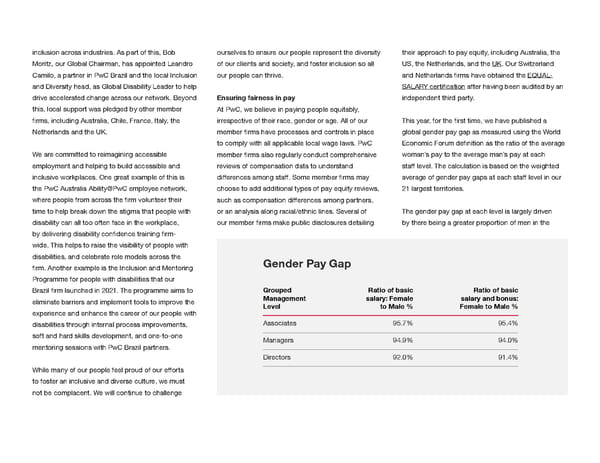
business units where compensation tends to be as expenses, but rather are what remains after higher. We are working hard to address this gap. all other payments have been made. Partners We are making more senior jobs open to lfexible can only participate in the surplus income in their working, reviewing the processes we use to recruit individual partnership, with no sharing across PwC experienced hires, and offering more mentoring and member ifrms. Generally, partnerships do not retain leadership development opportunities for women. For any surplus income, with all of this amount being example, PwC Spain’s NextGen Women programme distributed to partners. was launched this year with the aim of progressively correcting the under-representation of women among These distributions, which are often made gross of partners and staff who lead client engagements. tax, in substance relfect: This programme offers training designed to develop leadership skills, combined with mentoring and ■ Base compensation for the provision of networking sessions. partners’ services “Wherever we operate in the world, we are Partner and leadership remuneration ■ Performance-related pay, relfecting their personal committed to the principles of equal pay An essential element of PwC’s ethos is a set of contribution to the business, the quality of the for equal work. We know we have more common principles for remuneration of partners work they carry out and the performance of the to do to increase the representation of in member ifrms, based on partner performance, whole partnership women in senior roles - and by sharing our behaviours, and quality of work. global gender pay gap for the ifrst time, ■ Dividend on equity, representing a return on the we are making ourselves accountable to Partners may be salaried or equity. Salaried partners capital invested in the ifrm by each partner do better.” do not generally provide capital to - or own equity in - the individual partnerships. Their income is paid as a The relative proportions of these three components Dale Meikle, contractual right, they bear no risk of ownership, and vary considerably in ifrms across the PwC network, Leader, Global Inclusion and they do not participate in the distribution of proifts. relfecting the market in which each partnership Diversity Centre of Excellence operates. In most cases, the partnerships seek to Equity partners have contributed capital and own pay partners a competitive distribution relevant to the partnerships. This capital is at risk in the event of the local professional services market. Partners unforeseen issues. Equity partners have no contractual receive amounts which relfect their level of rights to a salary, and therefore only receive any experience and the role which they play within their amounts once all other payments are made, in what partnership, with each territory senior partner (‘TSP’) are referred to as ‘distributions’. Therefore these earning the highest amount. On average, the income amounts are not charged to the income statement, of a TSP is 6.6 times the income of a new partner.
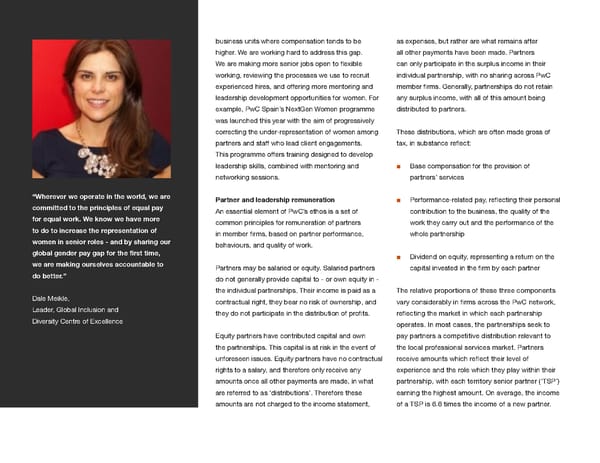
and sharing digital assets. By storing innovative solutions in one central repository and harnessing cutting-edge tools and technologies in data, analytics and robotic process automation, our people are rethinking processes, enhancing quality and efifciency, and improving the way they work and collaborate. The rate at which our people have upskilled themselves has also allowed us to scale innovation and develop new client offerings, solving their problems in new ways. Every step of our digital journey has helped us progress to where we are today – transforming the way we work to beneift our clients and our people, and In FY21, our Global Chairman Bob Moritz earned skills that equip them for today and prbuilding the futurepare of our ifrm.e them 130 times the median basic salary and bonus of for tomorrow. PwC employees across the network. Mr Moritz’s PwC’s Badge Programme is a key part of remuneration is determined by our Global Board of Our upskilling journey began in 2019 when we this ongoing upskilling strategy. It promotes PwC International Limited. It includes a performance launched our ‘Digitising the Network’ programme continuous learning by helping our people component assessed by the Board based on the with the mission to invest in and provide our people acquire the high-priority skills they need achievement of his and the Network Leadership with new skills, innovative tools and capabilities. for today and the future. Badges provide Team’s (NLT’s) annual priorities, progress against While our journey to become a truly digital business visible, portable records of skills that can be the NLT’s shared strategic goals, and input continues, we now have over 159,000 Digital shared internally and externally. The Badge collected from relevant leaders. The overall median Academy graduates (FY20: 100,000) who have Programme continues to expand across compensation of our employees is impacted by our upskilled themselves and we have redeifned how the network, with 48 member ifrms now pyramid-based operating model, with approximately we work to deliver the highest quality and best collectively issuing over 139,000 badges to two-thirds of our people being at senior associate outcomes for our clients. our people (FY20:103,000). And the Badge level or below. portfolio continues to grow, with the launch At the end of the year, these efforts had resulted of the Inclusive Mindset badge and two Developing our people in over 10,000 citizen-led innovations (FY20: new AI badges to help us deliver sustained To deliver on The New Equation, we are dedicated 7,500) in our Digital Lab, PwC’s ifrst crowdsourced outcomes for our clients by combining human to ensuring that our people have the right set of solution-sharing community for ifnding, building ingenuity with technology innovations.
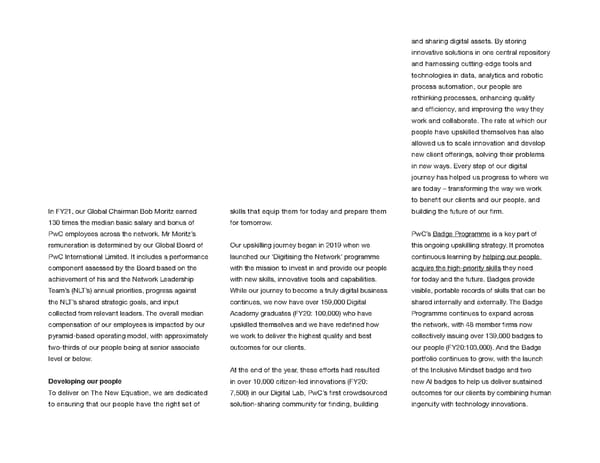
Average training hours Average training per employee hours by gender Average training Fiscal year hours per employee Average learning hours by gender Associates 56 Female 55 Managers 58 Male 56 Directors 52 The data on average training hours per employee highlights that the regulatory training Average training hours by line of service and role for our assurance practice requires a greater commitment of training hours, particularly for Internal ifrm associates when they are working towards Grade Advisory Assurance services Tax formal qualiifcations. As people become more senior, formal training is often replaced Interns/Trainees 27 95 25 37 with other learning opportunities that are not tracked in Vantage, such as executive coaching Associates 43 100 22 51 and real-time learning in the lfow of work. Managers 33 63 20 36 The data also highlights that overall training Directors 26 51 15 30 hours fell last year due to longer in-person Partners 22 51 21 26 sessions being replaced with multiple shorter, more focused pieces of learning. In total, our people launched an average of 1.46 million learning items each month during FY21 (FY20: 1.2 million).
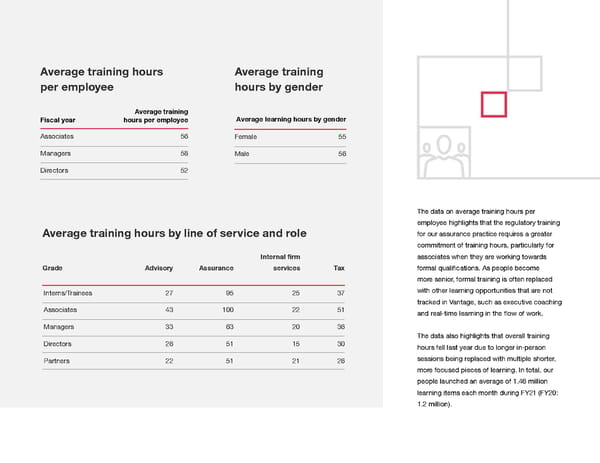
In support of our strategy, we are harvesting training curriculum covering the PwC audit Last year we reported our average training hours the best practices and lessons learned from per employee for the ifrst time, based on the approach and tools, updates on auditing standards our digital upskilling initiative to apply to the learning tracked in Vantage. This year we’ve and their implications, together with audit risk next wave of emerging skills, such as recently expanded the measure to understand more about and areas for improved quality. Supplemented by launched Environmental, Social and Governance robust local training, this curriculum consistently the balance of those training hours across gender, (ESG) Academy and the evolution of the Inclusive prepares partners and staff for the delivery of line of service and level. This data does not capture Leadership badge portfolio. external courses and conferences nor untracked high-quality assurance services. It uses a blend on-the-job learning. of delivery approaches to support our changing Against the backdrop of our upskilling ambitions ways of working, together with real-time, on-the- and the impact the global pandemic had on face-to- Learning and education to drive quality job support. The content is constantly evolving so face training, over the past year we have reimagined We are committed to high-quality services, a that it continues to be ift for purpose. In 2021, for how our people can learn in new and dynamic ways. commitment that is underpinned by our approach instance, a core training programme focused on Virtual learning is no longer a standalone e-learning to ongoing technical training that has quality at its how teams can build a continuous improvement, or virtual classroom experience. We are now using core. PwC has a robust series of technical training quality culture with targeted learning on fraud a wide range of technologies in concert to create a that is delivered to our people each year based on and going concern risk assessment. Learners unique, immersive experience. Vantage – our online the requirements of the member ifrms in each of our practised and shared best practices as they applied learning platform – is a key enabler of this, providing lines of service. professional judgement and professional scepticism direct, personalised access to a wealth of learning skills, while relfecting on how the right mindset, content from PwC and beyond. For example, our assurance practice offers a project management and remote working practices
can support them and their teams in delivering that are continuously refreshed and reinforced with quality work. thought leadership. The content challenges partners to grapple with strategic topics and translate them Reimagined leadership into the context of their clients. Termed ‘futurists’, more than 1,200 partners from across the network Leaders today are grappling with an ever have participated so far. increasing array of urgent challenges confronting the world. The New Equation is We also deliver programmes designed to accelerate our response to helping our clients and other the development of selected partners, to better stakeholders build trust and address these equip them to help both PwC and our clients identify challenges and the intertwined needs every and focus on the opportunities presented by the organisation faces - the need to build trust current world challenges. For example, the Network and deliver sustained outcomes. Achieving Leadership Development Programme (NLDP) is a both of these in today’s complex and fast- 22-month experience that provides 200 partners “My biggest takeaway from the leadership changing world requires a different form from over 40 member ifrms with the opportunity development programme was that being of leadership - one capable of reconciling to engage in a series of immersive activities and a global leader helps you become a better dilemmas, identifying, creating and preserving challenges, working with other partners from around local leader. Also I felt tremendously value, and delivering multidisciplinary solutions the network to expand their views of the world connected and saw the huge opportunity that draw on diverse talent and are powered and increase their effectiveness in leading through that the global network opens up for by technology. We have a variety of leadership complexity and uncertainty. To overcome physical clients, for us and - most importantly - programmes and development opportunities to travel constraints, we used virtual reality (VR) to the opportunity to meet with international grow these essential leadership capabilities. bring remote participants together to solve problems leaders of the ifrm and build pride in collaboratively in real time. Through the power of PwC’s purpose, commitment In the past year, we have launched our VR, participants were able to visit and experience and thinking.” ‘Reinventing the Future’ programme. This is a cities around the world before meeting virtually with major development initiative designed to ensure successful entrepreneurs, innovators and leaders Chaitali Mukherjee, that key client-facing partners are equipped to from those locations. As a culminating outcome Partner, PwC India support our clients in repairing, rethinking and of the experience, each partner then relfected on reconifguring their businesses in light of the their ability to lead through the sustained impact of massive changes happening in the world and COVID-19. Through inspiring TED-like talks, they to build a more sustainable future. It consists revealed how their leadership has evolved to be of a ifve-week series of seminars and tutorials prepared for the moment.
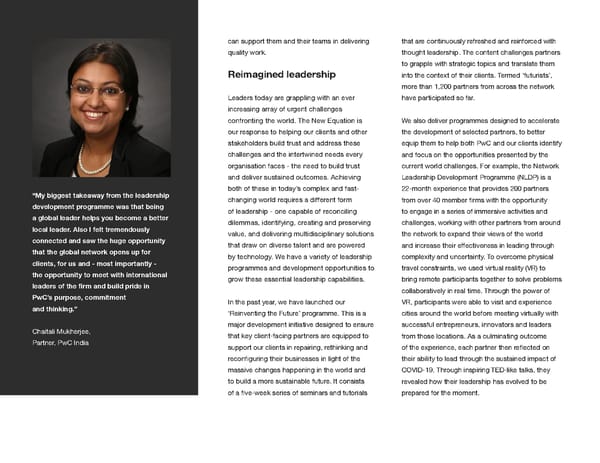
Our People in numbers PwC people by region, line of service or role FY21 FY20 Growth Americas 73,601 72,129 2.0% Asia Paciifc 98,876 90,699 9.0% Europe, Middle East and Africa 122,894 121,430 1.2% Total 295,371 284,258 3.9% FY21 FY20 FY19 Assurance 116,890 118,771 115,438 Advisory 81,369 71,466 68,194 Tax 55,286 55,229 55,261 Internal ifrm services 41,826 38,792 37,112 Total 295,371 284,258 276,005 Level FY21 FY20 FY19 Interns and Trainees 14,718 7,891 12,964 Associates 180,114 179,408 170,733 Managers 69,195 66,033 62,395 Directors 19,447 19,295 18,297 Partners 11,897 11,631 11,634 Total 295,371 284,258 276,005 This is the ifrst time we are reporting detailed data on turnover. In FY21, 90,273 people joined PwC and 53,503 people left. We remain in contact with many of our former colleagues via our strong and active alumni communities.
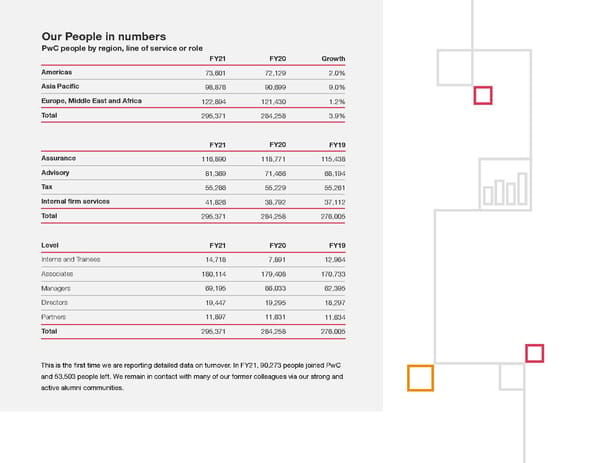
Employee total turnover Basis of preparation Total Turnover Not Region Global line of service departures rate Female Male declared Americas Advisory PwC’s headcount includes partners, regular 3,654 24.4% 33.2% 66.7% 0.11% employees, interns, and ifxed-term employees. Assurance 6,364 27.3% 44.7% 55.3% 0.05% Contingent workers are excluded. Employees Internal Firm Services 1,371 11.8% 62.2% 37.6% 0.15% on leave (parental, disability, sabbatical, etc.) Tax 3,225 22.8% 50.8% 49.1% 0.09% are included in the PwC headcount. The PwC headcount as of June 30, 2021 is the population used for the PwC people by region, line of Asia Paciifc Advisory 5,784 21.8% 38.0% 61.9% 0.12% service and level; employee category by gender; Assurance 9,521 26.3% 55.1% 44.9% 0.05% and training hours. Internal Firm Services 1,226 15.2% 63.6% 36.4% 0% PwC hires include partners, regular employees, Tax 2,351 16.8% 54.4% 45.5% 0.04% interns, and ifxed-term employees. Contingent workers are excluded. EMEA Advisory 5,732 21.9% 36.8% 63.1% 0.04% Assurance Employee turnover includes the departures of 9,208 20.1% 46.4% 53.6% 0.02% regular employees only. All other worker types, Internal Firm Services 1,824 11.2% 56.6% 43.4% 0% including partners, interns, ifxed-term and Tax 3,243 17.0% 55.3% 44.7% 0% contingent workers are excluded. Total 53,503 20.9% 47.2% 52.7% 0.06% The pay metrics (gender pay gaps and the ratio of the Global Chairman’s compensation to the median FY21 employee pay) include regular employees and ifxed-term employees of the 21 largest PwC territories. Partners, interns and contingent workers are excluded.
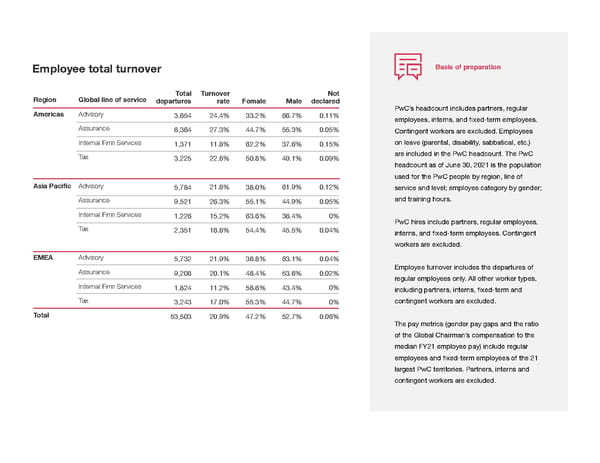
Clients Helping clients build trust and deliver sustained Our community of solvers outcomes in turbulent times builds trust and delivers sustained outcomes Our clients face a once-in-a- generation context of change To successfully address the issues they face, our clients must overcome two interlinked challenges. Organisations today must navigate and cope with pressures including climate change, technological First, they must build trust with a broad range of disruption, geopolitical turmoil, social polarisation, stakeholders. This is vital for them to maintain and fractured trust in institutions, rising environmental, enhance their reputation and relationships, access social and governance (ESG) expectations, skills the capital markets, attract the right talent, grow challenges and an ongoing pandemic. their customer base, manage legal and regulatory risks, and respond to evolving ESG expectations. As they face these challenges, we are proud that Second, our clients must deliver sustained more than 200,000 organisations – including 84% of the Fortune Global 500 – choose to be our clients. outcomes while managing the huge We are dedicated to helping them thrive in a rapidly-transformations taking place in today’s world. To do this, they need new business and changing world, both managing its challenges and seizing its opportunities. operating models.
These challenges are unlike any we’ve experienced before. They require something Fighting COVID-19 shows what’s possible more than the expected. when our community of solvers unites That’s why we’ve developed The New Delivering billions of COVID-19 vaccinations around the world Equation, which unites 295,000 PwC people – at speed – has been, and remains, a huge challenge. It’s in a community of solvers. The huge array one that our global community of solvers took up. Armed with detailed knowledge of the health value chain and enabled by of capabilities across our global community technology, we assisted in delivering sustained outcomes when gives us enormous problem-solving power. they were needed most. We draw on our distinctive blend of human expertise and advanced technologies to Working in a complex and fast-changing environment, our create and deliver innovative ideas that step cross-functional experts supported the design and operation out of the ordinary. of critical clinical trials, enabled the scale-up of vaccine manufacturing, and developed and implemented distribution “Our clients come to PwC for innovative Looking across our network, we combine strategies. Together, these efforts helped to get vaccines and imaginative solutions to help them distributed to people across the globe. the world’s largest assurance practice, the meet the challenges they face and world’s leading tax and legal practice, the capitalise on the opportunities they have We achieved this by combining technical expertise with robust to build trust with - and deliver sustained world’s most distributed forensics capability management and oversight capabilities and deep experience outcomes for their - stakeholders.” (rivalled only by national intelligence organisations), and much more. Our team in crisis management and pandemic response. Together, these includes former ifghter pilots, doctors, capabilities meant we were ideally placed to advise and assist Kevin Burrowes, surveyors, programmers, technologists, governments, ministries of health and national health systems Global Clients & Industries Leader around areas including strategy, design, implementation and data-scientists, architects, lawyers, reporting of vaccine coordination units, enabling them to meet accountants and bankers, to name just a the end-to-end needs associated with COVID-19 vaccinations. few. Together, the members of this diverse community have the imagination to see Our experienced teams analysed data on the results of the things from different perspectives. vaccine rollout, gathering real-world evidence to create go- forward commercial strategies addressing demand. And we We believe this vastly diverse range of continue to support governments and corporations in assessing human expertise - powered and enabled by their readiness and preparing for a future in which the world technology - can solve just about any problem must live with the virus. for our clients. We bring our unique thinking
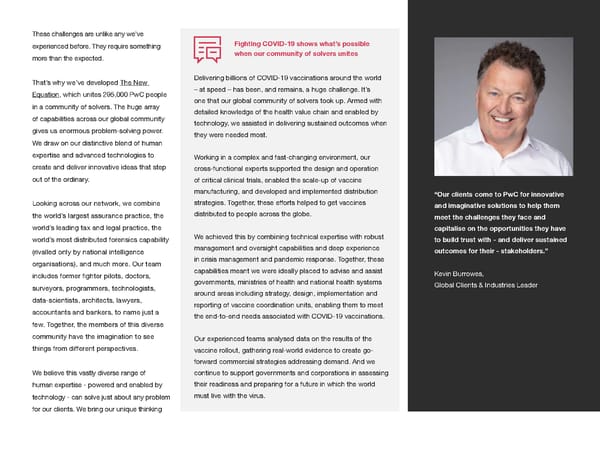
to every challenge, and develop solutions that lead The institute to be built in China will bring an the way. This helps us build trust and create sustained immersive learning experience to life through outcomes. It’s what sets PwC apart. both physical and virtual connectivity focusing on sustainability, digital innovation, wellness and mobility. In the rest of this section, we share some of the ways It will become the creative hub to educate, advise our community of solvers is helping clients build trust and fulifl the changing needs of businesses, leaders, and achieve sustained outcomes in turbulent times. academics, and the next generation of talent. It will act as a trusted platform between our clients, the Our commitment to build trust business community and society to create impactful We are committed to embedding trust-based outcomes for the new era. principles into the core of today’s and tomorrow’s businesses – including by funding the new PwC Across the world, we work continually with clients Trust Leadership Institutes in the US and China. on their compliance with tax and legal regulations, applying a rigorous Global Tax Code of Conduct. PwC US has committed a landmark three-year This enables clients to build trust with regulators US$300 million investment in trust. The keystone and stakeholders by demonstrating clearly of this effort is a ifrst-of-its-kind C-suite that they are meeting their complex and varied educational experience called The PwC Trust regulatory obligations. Protecting business during Leadership Institute. a global pandemic We engage with clients to assess their tax and The US ifrm created the institute to equip 10,000 business strategies with reputation and trust business leaders with the skills to operate in mind. And we encourage and assist them in their companies in ways that earn trust, deliver When the pandemic reached a creating greater transparency around their tax sustainable outcomes and impact business and western European country in 2020, policies, including where and how much they pay. society. Through a multifaceted, immersive learning the government urgently needed to For example, we support numerous multinational experience, leaders will deepen an understanding issue loans to support businesses clients in understanding their total tax contribution, nationwide. We helped the government of the core elements of trust — and their enabling them to demonstrate their contribution to interdependencies — within the evolving stakeholder get a tech system live within two communities and governments. weeks - enabling the nation to landscape. Together with thought leaders and peers, they’ll explore how expectations of trust have securely deliver the largest economic Tax policy is evolving rapidly in response to a evolved in the context of value chain, cyber security, assistance programme in its history. shifting and fractured geopolitical landscape. For data and technology, policy, ethical decision-making example, there are calls for green taxes, a global and other lenses. minimum corporate tax rate, and pressure to restore
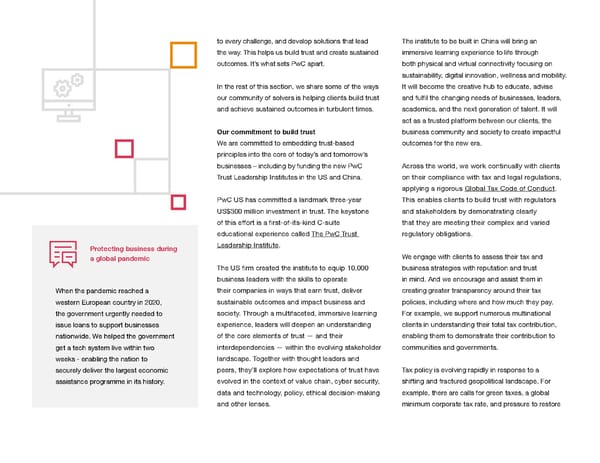
public balance sheets post-COVID. We are actively For example audit and sustainability teams joined engaging with key players such as the Organisation forces to help a global auto manufacturer deliver its for Economic Co-operation and Development (OECD), ifrst fully integrated report bringing together ifnancial advocating for collaboration, consistency and clarity and non-ifnancial data from its 160 entities in 50 Creating a seamless in the debate and decision-making. And we apply our countries. Feedback from investors and shareholders tax compliance service expertise to support policy outcomes that build trust has been very positive. Investors appreciate the report’s in the tax and legal systems. For example, we are demonstration that the company is transforming its collaborating with the World Economic Forum on a strategy and execution for a low carbon world - which is report on carbon pricing that will inform discussions key to the ifrm’s future viability. Multinationals must manage a at the United Nations Climate Change Conference complex web of global tax regulations (COP26) in November 2021. Similarly, we helped a global insurance company deliver to maintain their reputation and rigorous reporting of its ESG KPIs. Trusted ESG metrics public trust. We supported ZEISS, High-quality audits are critical to building trust and an international leader in optics are important to the company’s attractiveness to supporting companies’ continued success. That’s technology, in managing its global tax current and potential employees, clients, and investors. why we are investing an additional US$1 billion in compliance obligations effectively. In addition, rigorous metrics help the company to technology to enhance audit quality. We are leaders More than 90% of ZEISS’s revenue reliably chart its progress toward ESG objectives. in deifning and building the future of audit, including comes from outside its home country applying AI to increase audit effectiveness and of Germany, so a transparent, secure Working with clients to build trust amid turbulence advocating for deeper audit insight into material and seamless cross-border tax Today, companies are facing rapid - and simultaneous risks. And we are calling for greater clarity and - increases in public expectations, compliance compliance service is crucial to the relevance in corporate reporting, and advocating for company’s success. We assisted requirements and risks to their reputation and a culture of challenge. What’s more, we are looking operations. We have supported well-known tech ZEISS in creating a single web-based to the future, innovating to continue to deliver trusted platform, offering a transparent, secure companies in meeting changing societal expectations, audits in a fast-moving world. For example, we offer and seamless tax compliance service navigating risk in moments of crisis, and shaping and audit and assurance services to clients holding or covering many of ZEISS’s obligations meeting changing regulations. transacting in cryptocurrency. globally, including corporate income tax returns, tax accounting, and Non-ifnancial reporting is increasingly expected of statutory ifnancial statements in all its companies. This reporting can be important to maintain business units worldwide. the trust and conifdence of investors and capital US$1 billion markets, not least in industries like auto manufacturing which are facing dramatic transformation as the world We are investing an additional US$1 billion in strives to lower its carbon emissions. technology to enhance audit quality.
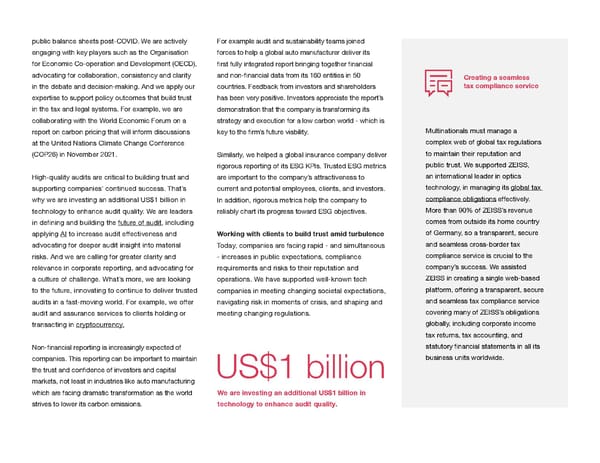
We help many clients respond with As a result, in the past year we’ve agility to shifting legal and societal helped many clients build or repair Developing a winning strategy for 5G expectations in order to build and trust by ensuring data security and maintain trust. For example, we business continuity. We help clients realise the beneifts while managing the challenges of new worked with one of the largest global technologies. We are assisting a European government in growing its retailers to establish protocols and Robust cybersecurity typically economy with a winning strategy to be an early adopter of 5G. Building and operating models to comply with new requires monitoring of millions of commercialising a 5G network is a complex undertaking. Cybersecurity consumer privacy legislation. user actions and digital events. must be stronger. Legacy networks must be managed. Public trust must be This task often presents a logistical navigated. Taking these challenges into account, we delivered a detailed Cyber assurance: building a secure challenge to threat-hunting teams, plan to roll out a robust, quality-assured, next-generation telecoms network digital society who must efifciently access and by 2025. Thanks to this roadmap, the country’s government and key We work with some of the world’analyse a mass of data itemss telecom players now have a shared direction, in turn giving its citizens best-known companies to protectdistributed acr oss many greater conifdence. Our analysis shows a successful 5G rollout could deliver their reputations and relationships servers globally. economic growth across all sectors of the economy. from cyberattacks. The strongest cybersecurity is holistic, so we We’ve created a solution. Working manage all of these aspects with our partners, we’ve built Atlas, and more: a global, resilient, high-throughput Helping reduce greenhouse gas emissions platform to collect and process ■ understanding legal requirements varied forensic artefacts and enable analysts to hunt for threats at The public, regulators, and investors are increasingly demanding that ■ risk and regulation scale. Our bespoke Atlas capability companies reduce their carbon footprint. This can be especially tricky for supplies additional data from rich retail companies, which often produce emissions across complex supply ■ training and culture change forensic artefacts to provide even chains. Another issue is that insufifciently robust action can be dismissed as greater insight. greenwashing. We helped a major UK retail chain address these challenges ■ managed services for with an ambitious roadmap for reducing its operational greenhouse gas ongoing threat monitoring Through our market-leading emissions by more than 70% across its own operations and supply chain, and management behavioural threat detection, we with a three-year payback on its investment. This planned reduction in have identiifed threats ranging from emissions will help the retailer to align to its peers and the ambitious goals ■ penetration testing simulating the removal of customer data to the of the Paris Agreement. the latest techniques used by inifltration of web servers. cyber threat actors
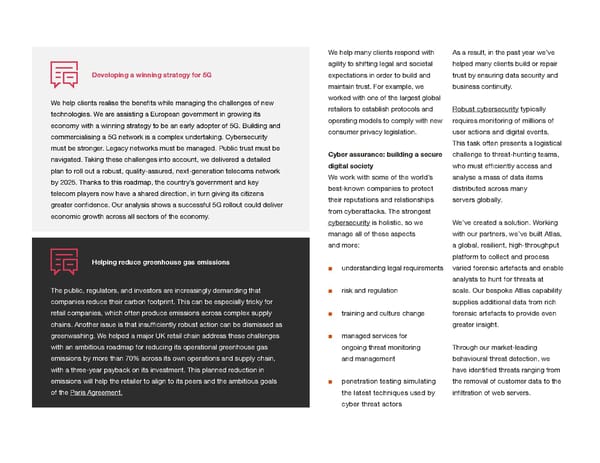
Helping clients transform for a changing future This year, we established a global programme called ‘Reinventing the Future’, designed to help clients make Working to tackle a cyberattack sense of disruptive forces affecting their business and deifne how bold leaders can think about tomorrow. As part of the programme, more than 1,200 PwC partners and industry When attacks come, we are ready. At 2am, the CEO of the SEUPB, which is currently leaders have been trained intensively on how to support responsible for half a billion euros of EU funding, received the text every leader dreads. Her organisation had been hacked by malicious cyberattackers. PwC moved quickly to help clients in navigating fast-moving challenges, such as the digitisation of health services, decarbonisation of energy SEUPB staff identify threats, prioritise actions, communicate with stakeholders and restore supplies, and the opportunities presented by AI. PwC leaders safe operation. This included an entire server rebuild since nothing could be trusted. It took ifve have also created a perspective series, Take on Tomorrow, weeks for the organisation to be fully operational again. But it came back stronger and is now sharing bold insights on issues like digital disruption, climate currently programme called PEACE PLUS.eparing to implement a new €1.1bn EU funding pr change, and workforce & skills. When sectors undergo rapid change, we work with clients to assist them in riding the wave of disruption and securing market-leading positions. For example, the means of Bringing together the best technology thinking for our clients mobility in the future will be autonomous, connected, and emissions-free. By applying our advanced tech skills in virtual The global business community is facing unprecedented challenges related to the product development and data-driven decision-making, we COVID-19 pandemic. As a result, businesses ar e having to accelerate their digital business redesigned processes from strategy to operations to support transformations like never before. One way that PwC helps deliver the right solutions for our a leading automaker to help create the transportation future. clients - whether involving greater innovation, cloud or business transformation, operational As the world transitions towards an increasingly decarbonised efifciency or faster product and service speed to market - is by working, innovating and economy, a major energy company - in the past a provider of collaborating in alliance with some of the world’s leading technology companies like SAP, petroleum products - has transformed to become a market Oracle, Salesforce, Microsoft, AWS, Guidewire and others. leader for energy in a post-carbon era. We are working with With our strategy, industry and engineering experience we help our clients weave the ifrm to embed net-zero considerations into its operating technology throughout their businesses to drive growth and accelerate outcomes. model, supply chain strategy, and growth markets. We Technology can be complicated. We help to simplify the process and maximise impact assisted the company in laying the groundwork to drive along our clients transformation journeys. In combination with our alliance we are bringing decarbonisation across the energy industry, establishing a results for our clients today, while innovating for tomorrow. bold mission to help customers, supply chain partners and other stakeholders reduce their carbon footprints.
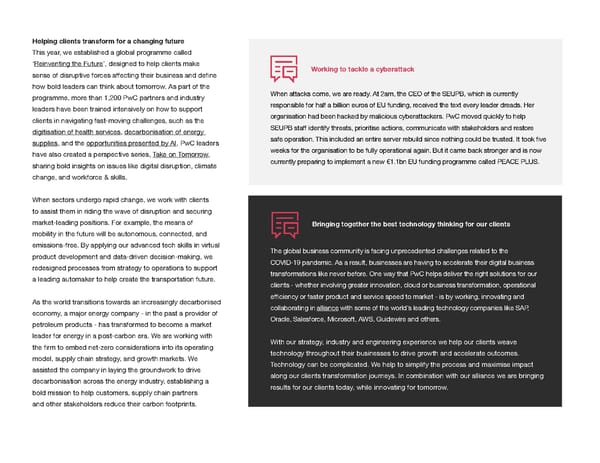
We help clients navigate an evolving ESG environment We work with our clients to transform their We also bring clients the ability to use trusted ESG businesses, empowering them to thrive in a world of performance measurements. We supported one of heightened ESG expectations and opportunities. the world’s largest pharma companies in launching one of its sector’s ifrst ESG bonds. In order for the We are investing in Centres of Excellence to help bond to be trusted by capital markets, we knew there needed to be rigorous measurement of whether clients reach their ESG goals. Supported by experts in carbon reduction, sustainable supply chain, and the company consistently meets the promised ESG other domains, the Centres of Excellence will help performance criteria. For example, how should a clients to integrate ESG into their strategy, transform signiifcant improvement in patient treatment access their businesses and reporting, and deliver trusted be deifned and measured? We leveraged our ESG performance. Internally, we have launched a experience with reporting standards, ESG metrics global ESG Academy to actively upskill all of our and the bond issuance process to provide insights worldwide staff on ESG strategy, transformation, and anticipate challenges early and throughout the and reporting. process. In this way we helped the client to foresee potential challenges from third parties that could We actively advocate for globally aligned ESG erode trust. Our work for this client and others is reporting standards to drive consistency and trust. charting the way forward for ESG bonds and broader ESG reporting, shining a spotlight on consistency, Our community of solvers has the broad range of trust and transparency. skills required to meet complex ESG challenges. For example, when a client needed a way to meet its We assist our clients in embedding ESG deep within green energy targets, PwC Norway brought together their organisations through strategic reinvention and a team that united our risk, consulting, tax and legal business transformation. We’ve created a systematic specialists with a Norwegian software developer. approach to the net-zero transition, and have scoped The team created a solution combining biofuel out practical steps clients can take, such as building compliance and commercialisation with excise tax ESG into executive remuneration. reporting in a single system.
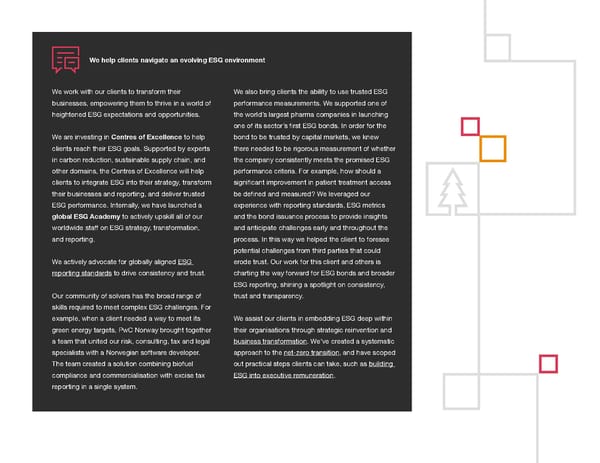
Supporting clients in building a future-fit workforce Our clients need to manage deep changes in workforce management, Making technology work better for people ranging from digital disruption to evolving employee expectations. Our We help design technology that can make the world grocery stores, restaurants and coffee shops. But Hopes & Fears 2021 report shares some work better for people - including 1.3 billion people many visitors quickly left the platform because it was of the ways we help clients anticipate with mobility or vision disabilities. AXS Map is a dififcult to use. Our digital team worked hand-in-hand and navigate key trends affecting crowdsourcing platform powered by Google Maps, with AXS Lab to apply human-centred design and workforces today. and backed by a web app. It enables users to rate make the platform easier to use, enabling it to expand the accessibility of locations like train stations, rapidly and engage new audiences worldwide. Our upskilling report produced in collaboration with the World Economic Forum reveals that half of employees worldwide will need reskilling by 2025. The report clearly shows the value of upskilling in building employee loyalty, Reimaging a talent experience on a global scale increasing inclusiveness, and earning greater trust within society. We worked with Hyatt to re-imagine the entire programme design and management. We worked Innovating to solve important talent experience for 120,000 Hyatt colleagues on closely with Hyatt to design and implement a clear problems six continents, with the goal of improving internal and compelling talent philosophy grounded in Hyatt’s Our Global Innovation Challenge processes on a global scale to support strategic purpose and values. This is enabling the company’s recognises early-stage, technology- workforce planning and help to create a culture leaders to move the business forward through enabled PwC solutions that find new where colleagues can be their best selves every consistent, focused, yet lfexible talent management, ways to solve important problems. In day. Our community of solvers came together to linked to systems, processes and procedures that FY21, we saw record levels of interest support Hyatt, including PwC professionals with support transparent and consistent standards across from across PwC, receiving more than subject matter experience in every aspect of HR the organisation. 470 entries involving almost 5,500 PwC people from 74 countries.
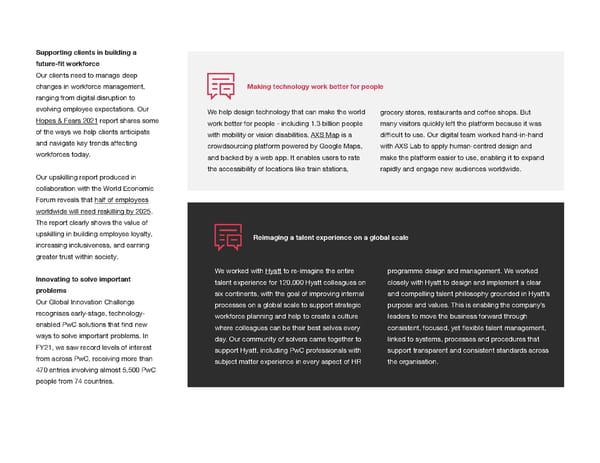
This year, entrants are - among many other example, our space practice applies satelliteCOVID-19 Simulator, which creates a 3D map innovations - using AI to reduce bias in decision- data and AI to support sustainable farming.of a space such as an ofifce, and simulates how making, applying machine learning to satellite PwC’s Insights from Space Smart Farming virus transmission could occur – and could best imagery in order to automate fraud detection, and application sends AI-enabled analysis straight be prevented. The simulator works by modelling using virtual reality to transform diversity training. to farmers’ mobiles, enabling many farmersrealistic human behaviour, for example taking Nearly 30% of the eligible entries are already at the to reduce their use of chemical fertilisers byaccount of the fact that people don’t always follow pilot stage, 26% are being launched, and 21% are applying them in a more targeted way social distancing rules. So the simulator can assist. Similar looking to scale up. Find out more. satellite data-driven solutions arsociety in reopening safely while incre now beingeasing public proposed in a range of other sectors such astrust in safety measures. We are continuously innovating to bring new defence, retail, energy, insurance, and more. products to market that help clients solve In total, we brought more than 110 innovative new problems and deliver sustained outcomes. For Another groundbreaking innovation is PwC’s ventures and products to the market this year.
A breakdown of our clients Indices Total clients Audit clients Fortune Global 500 84% 27% S&P Asia 50 84% 42% S&P Latin America 40 62% 25% S&P Europe 350 89% 30% Note: Audit clients include both sole and joint audits. Non-audit clients are those companies where PwC did not provide statutory audit services and where revenues exceeded US$500,000 in FY21. Percentage of PwC clients in the Fortune Global 500 by industry Total clients Audit clients Consumer markets 82% 29% Energy, utilities and resources 77% 16% Financial services 89% 38% Health industries 90% 29% Industrial manufacturing and automotive 81% 20% Private equity and soveregin investment funds 100% 0% Technology, media and telecommunications 89% 29% A breakdown of PwC’s total revenues in the past year shows that 77% came from clients served by multiple PwC ifrms (FY20: 75%). The remainder came from clients served by one ifrm, including governments and their agencies.
Quality Our approach to delivering quality services across In an environment where society’s expectations all our businesses are increasing almost by the day, and challenges are continuing to emerge unlike any we’ve encountered Focusing on quality… before, it’s more vital than ever that we maintain an unwavering commitment to quality. That’s why we Delivering high-quality work is at the heart of are constantly looking for ways both to enhance the everything we do at PwC - and is something that quality of our work and also to meet and exceed the all our stakeholders rightly expect of us. But what expectations of our stakeholders. We don’t always do we mean by quality? Historically, it meant meet those expectations nor the high standards we compliance and meeting the standards set before set for ourselves. But when our work is not at its us. However, that’s a given. In fact, quality for best, we strive to learn the lessons and improve in us is about much more than just complying with the future. standards, policies and regulations: it’s also about protecting our reputation and being recognised by The New Equation, our landmark global strategy stakeholders for delivering quality outcomes and launched this year, builds on our ongoing commitment keeping our commitments. Achieving that requires to quality and our determination to always improve the right culture, tone at the top, systems of quality what we do. This is why it includes the targeting of management and technology. All of these have been investments to further enhance quality across our areas of focus during the last year, and are areas of businesses. Across a global network of 295,000 further investment in the future. people, we are building a culture that emphasises
that quality is the responsibility of everyone at PwC. approach to transformation, PwC focuses on the Such a culture begins with setting the tone at the outcomes that our efforts are seeking to achieve. top and creating an environment of quality and high To deliver the agreed outcomes, we then mobilise our performance. Over the past year, we have focused on expertise in areas including – among many others – fostering the right tone at the top at all our member strategy, digital and cloud services, value creation, ifrms around the world, striving to drive a quality people and organisation, tax, sustainability reporting, mindset that extends beyond compliance. deals, business recovery services, legal and compliance. ...right across all our businesses To support the delivery of our strategy, each member The foundation of the strategy is our ifrm is required to have in place a Quality Management multidisciplinary model. This allows us to help System (QMS), to complete an annual assessment of clients build trust with their stakeholders and deliver the performance of its QMS, and to communicate the sustained outcomes, by bringing together deep results of this assessment to the network leadership. “We are constantly looking for ways both expertise and the right technologies across a broad These results are then discussed in detail with the to enhance the quality of our work and range of much-needed capabilities. leadership of each PwC member ifrm. If they are not to meet and exceed the expectations of at the level expected, a remediation plan is agreed, our stakeholders. We don’t always meet PwC’s approach to building trust is designed to meet with local leadership taking personal responsibility those expectations nor the high standards rising expectations of transparency, accountability for its successful execution. we set for ourselves. But when our work and stakeholder engagement. It combines expertise is not at its best, we strive to learn the in audit, tax and compliance activities with a drive During FY21, the Network Leadership Team continued lessons and improve in the future.” to expand specialist capabilities in areas such as to make driving quality improvement a key priority, with cyber security, data privacy, ESG and AI. It also speciifc actions being agreed and implemented such Richard Oldifeld, recognises the importance of quality - and that as making more consistent use of certain metrics in Global Markets Leader reporting and compliance represent just one link in our Strategy Council member ifrms. a chain that includes organisational culture, executive mindset, aligned standards, certiifed professionals, As such initiatives underline, the quality of our work stringent controls, tailored technologies and across the full range of our services has remained a appropriate governance. core focus for us – both in terms of how best to test, measure and enhance quality, and also around Similar to building trust, delivering sustained prioritising the levels of investment we need to make outcomes requires us to work in an integrated way. to achieve and maintain the expected levels of quality. Instead of taking a traditional technology-driven Each member ifrm is expected to address key
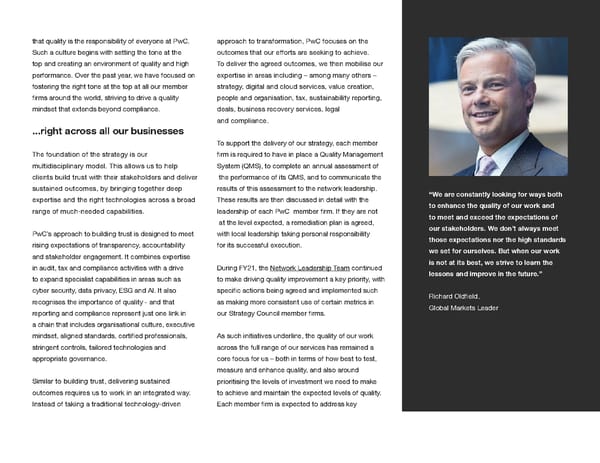
reputational risks fully through its QMS and available to them under the law, having regard Acceptance & Continuance systems and procedures. to all of the principles contained in the Code There is also an expectation that a focus on quality As of 30 June 2021, Tax Policy Panels had been - including both systems and procedures - is given established in 34 territories (FY20: 32), including in all speciifc endorsement by local leadership, including of our 21 Strategy Council member ifrms. A Tax Policy through setting the tone from the top, and is properly Panel is composed of senior partners and subject communicated and understood by our people. matter experts who determine whether a potential tax project or advice position ifts with our brand values and At PwC, our Tax & Legal Services are underpinned our commitments in the Global Tax Code of Conduct. by our PwC purpose and values and our application During FY21 over 560 matters were considered and of the principles of our PwC Global Tax Code discussed by our Tax Policy Panels (FY20: over 340). of Conduct, with adherence to these principles supported by our Tax Policy Panels. Under our Code Our Advisory practice continues to enhance its of Conduct: performance to meet evolving client and market expectations on value and quality. Across the ■ Tax advice must be supported by a credible basis professional services landscape, we know that clients in tax law want more value, higher quality and a more technology- enabled experience, all at a more competitive cost. In ■ No tax advice relies for its effectiveness on any that context, our Connected Execution way of working tax authority having less than the relevant facts has served us productively and allowed us to meet the demands of the market as the pandemic rapidly shifted ■ Tax advice is given in the context of the speciifc our clients’ priorities during the past year. facts and circumstances From a quality perspective, Advisory takes a ■ Tax advice involves discussion of the wider multifaceted approach. We address clients’ evolving considerations involved, as appropriate in the expectations by focusing on quality through four lenses: circumstances, including economic, commercial quality of earnings, quality of delivery, quality of client and reputational risks and consequences arising experience and quality of people. Advisory’s Connected from the way stakeholders might view a particular Execution approach - which includes a common course of action operating model and shared set of priorities - and our implementation of and enhancements to the Advisory ■ PwC ifrms advise clients of appropriate options Quality Management Systems and Risk Processes
contribute to driving quality in these four areas. profession through organisations like the Center for We regularly perform ‘in lfight’ reviews of the most Audit Quality in the United States. And we continue to signiifcant projects at our Strategy Council member publish our overall network internal inspection results ifrms so that we can make any necessary changes for audit engagements. We are eager to keep engaging to ensure the quality of delivery and of the with others to share, listen and learn – while continuing client experience. to invest in enhancing the quality of every audit we undertake. A speciifc focus on audit quality To help our member ifrms deliver consistently Delivering quality audits is core to our purpose, and high-quality audits, PwC has established a quality all of our member ifrms across the world are management framework based on clear objectives committed to providing high quality in all our audit around audit quality and provides support to help work. Our new strategy’s focus on building trust meet these objectives. Our member ifrms can only continues to position audit where it belongs - at deliver quality audit services if they have access to the heart of what we do - supported by a deep the necessary capabilities both in terms of people and “Quality is our number one priority. Over commitment to quality. When our work falls below technology. That’s why our quality objectives focus on the next ifve years we will be investing the standards that we expect and that are set by the having the right capabilities – both at a member ifrm an additional US$1 billion in technology regulators, we should rightly be criticised. We take any level and across our network – and on using these to further enhance the impact and instance of a sub-standard audit very seriously and capabilities to meet our own standards and applicable effectiveness of our audits as a key part we work hard to analyse the root cause of the issue, professional requirements. These capabilities can only of our strategy - The New Equation.” learn the lessons and take the opportunity to enhance be developed and utilised within a quality culture, in the quality of future audits. Our member ifrms also which leadership sets the right tone and acts as role James Chalmers, relfect the importance of quality in the evaluation, models for our values and behaviours, with the result Global Assurance Leader, PwC recognition and accountability of the relevant that positive quality outcomes are demonstrated assurance partners and leadership teams. across the practice. We welcome the increased public focus on audit We also continue to provide guidance to support our quality, and the dialogue about how auditors, engagement teams in addressing new and emerging preparers and investors can work collaboratively to risks with our clients and as part of our audits. increase the level of conifdence in ifnancial reporting. Examples might include evaluating the impact of We have actively contributed to this debate with climate-related risks, and assessing whether these audit committees, boards and regulators worldwide, might give rise to a risk of material misstatement both directly as PwC, and also collaboratively as a of the ifnancial statements due to fraud or error.
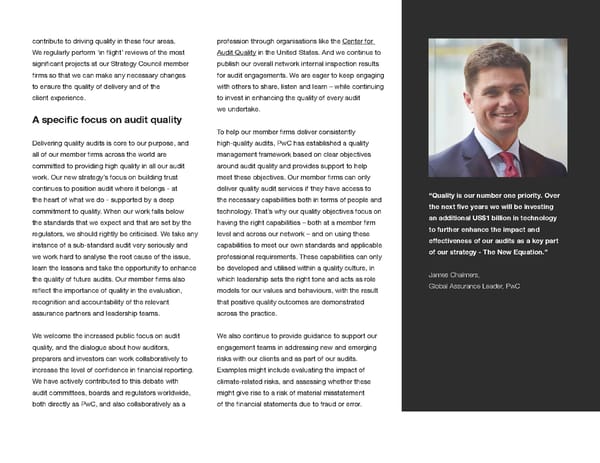
Our ongoing response to COVID-19 As it continues to evolve, the COVID-19 pandemic has had seen most of our clients and engagement teams complete an unprecedented impact on our clients and our people, as a full audit cycle on an almost entirely remote basis. well as on global and local economies and wider society. The pervasive nature of this impact requires us to conduct To support our audit teams in dealing with these challenges, an ongoing assessment of how we respond to the changing we’ve issued guidance, for example with respect to performing risks the pandemic presents. inventory counts in a COVID-19 environment. We’ve also encouraged the use – where necessary – of specialists to support At PwC, in addition to continuing to safeguard the health, audit teams on speciifc areas such as impairment and going safety and wellbeing of our people, we have remained concern analysis. focused on working together as a network, with our clients and with other stakeholders to continue to deliver A member ifrm’s system of quality management provides the audit quality. framework to identify, assess and respond to the risks arising from the pandemic. And as the pandemic continues to progress, From the early stages of the pandemic, we put a team we share experiences and examples from across our network in place to monitor COVID-19 developments globally and to provide continuous and real-time learning to our people and to highlight areas of critical importance to support our help them respond to evolving risks and challenges. Our quality execution of quality audits – including looking at how we framework is built on the solid foundations of our purpose, values can best equip PwC ifrms and engagement teams to identify and quality culture, and this bedrock has been more important emerging or changing risks and respond appropriately . than ever over the past year-and-a-half. We developed speciifc guidance on the impact of COVID-19 for our engagement teams around the world covering critical Using technology aspects of audit quality, including regulatory and standard- Our audit technology infrastructure and tools have been in place setting updates, audit reporting, methodology, accounting, for a number of years, and enabled our people to continue to and learning and education. This gave our teams the critical carry out their work despite the signiifcant change in our physical means to assess the unique circumstances at play and working environment. respond accordingly Today, the impact of COVID-19 continues to evolve. In response, Meeting challenges we’re continuing to monitor and address its ongoing effects on As a result of the pandemic we faced a number of new our people and clients, including the implications of the changing challenges in our audits, not least because this past year has or easing of restrictions.
Integrated and aligned in the member ifrms since 1 July 2019 is consistent with right way the approach and principles underlying the new ISQM 1 model. Both ISQM 1 and QMSE implement Our audit quality objectives are founded a quality management approach at both a ifrm on having the right people, supported by and engagement level that shifts the focus to effective methodologies, processes, and a more proactive management of the quality of technology, appropriately directed and engagements, supported by ongoing, real-time supervised. These represent the capabilities monitoring and timely and effective remediation that we believe are relevant to achieving of any deifciencies that are identiifed. and sustaining audit quality. To help our member ifrms apply these capabilities, we Systems of quality management in compliance have a number of dedicated functions within with ISQM 1 are required to be designed and the PwC network that develop practical implemented by 15 December 2022, and the tools, guidance and systems to support evaluation of the system of quality management audit quality. We’ve integrated and aligned is required to be performed within one year after these elements to create a comprehensive that date. In terms of the updates needed to the and interconnected quality management QMSE framework to comply with ISQM 1, we do framework, Quality Management for Service not expect a signiifcant additional burden on Excellence (QMSE), that each member member ifrms, as any necessary updates relate ifrm implements and tailors to relfect its to areas that they were already likely to be individual circumstances. addressing. Rather, these changes will relfect explicit requirements in ISQM 1 being made In December 2020, the International similarly explicit in the QMSE framework. Auditing and Assurance Standards Board (IAASB) issued its new Quality Delivering quality Management Standards - International Standard on Quality Management (ISQM) Central to the QMSE framework is the recognition 1, ISQM 2, and International Standard that quality management needs to be embedded on Auditing 220 (Revised). ISQM 1, in in everything we do as individuals, teams, and ifrms. To support consistency and guide our member ifrms, applying a quality management approach, is a signiifcant change from ISQC 1, the the quality objectives are supported by designated standard that it replaces. The QMSE activities that we believe are vital to achieving them, focused mainly on building a quality infrastructure framework that has been in place in PwC
and organisation. Each member ifrm supplements these These include professional scepticism, objectivity, key activities to respond to risks that it has identiifed specialist skills and judgement – all supported by as relevant for its own operating environment and state-of-the-art technology. PwC’s values guide our client base. auditors in making their assessments, in applying ethical behaviour and building a str ong culture. Integral to a ifrm’s quality management process under This year some member ifrms have started – and the QMSE framework is the use of Assurance Quality other member ifrms have continued – programmes Indicators (AQIs) to “aim to predict”, Root Cause looking into how they can further enhance their Analysis to “learn”, Real-Time Assurance to “aim to quality culture. These initiatives consider what more prevent”, and the Recognition and Accountability we can do to foster the behaviours that underpin Framework to “reinforce” our quality culture, behaviours quality, and cover topics such as how auditors can and outcomes. The effective design and operation challenge each other and clients more effectively, of this quality management process is key to making how to create an environment that enables that sustainable improvements to quality. QMSE also challenge, and how audit teams can use feedback to emphasises the need to think more broadly about facilitate continuous learning. quality and risks to quality beyond compliance and to take a more holistic approach to monitoring, moving To avoid the risk of independence issues, PwC ifrms towards a greater reliance on real-time, ongoing apply global ethical and independence principles and monitoring, which represents a signiifcant change e guidelines that limit the non-assurance services they ar from past approaches to monitoring and inspection. able to provide to audit clients. These have the effect of prohibiting auditors from acting in a management Values, judgements, objectivity and om capacity or as an advocate for an audit client, and fr professional scepticism auditing the results of other services provided. Performing high-quality audits requires more than just These guidelines are reinforced by regulatory the right processes. The auditor’s role is to reach a restrictions on the services the ifrms can sell to audit professional judgement based on reasonable assurance clients. These restrictions vary by country – but may as to whether the ifnancial statements prepared by the include a complete ban on selling some services, entity’s management are free of material misstatements and caps on the revenue that can be generated from and present a fair picture of the entity’s ifnancial others as a proportion of audit fees. In addition to performance and position. To carry out this assessment these restrictions, some member ifrms have further effectively, our auditors need to use all the capabilities limited the services they provide to certain clients in that have been built up in line with our quality objectives. response to local concerns.
Highly skilled people - Our audit engagements are staffed based on in audit, as well as building the delivery model for innovative, independent, expertise, capabilities and years of experience. the audits of the future – which are expected to objective mindsets - powered Engagement leaders determine the extent of direction, require more types of data, evaluate a broader range by smart technologies supervision and review of junior staff. In order to of information when assessing risks and integrate learn and further develop their skills, team members non-ifnancial information more fully. This additional People at the heart of wha t we do: We aim to obtain feedback on their overall performance, technology investment builds on our ongoing focus recruit, train, develop and retain the best and the including factors related to audit quality such as on quality, supported by rigorous methodology and brightest people who share PwC’s strong sense of technical knowledge, auditing skills and professional training across all lines of service. responsibility for delivering high-quality services. scepticism. Audit quality is an important factor in And to prepare staff and partn ers for the delivery of performance evaluation and career progression quality assurance services, we provide them with decisions for both our partners and staff. access to a comprehensive curriculum of formal learning and technical cours es. During the past yea r, Where appropriate and necessary, our audit teams are we have continued to focus on using this curriculum able to draw on expertise from parts of the network to give PwC’s audit practition ers the opportunity to outside the assurance practice. Audit – especially sharpen their professional ju dgement, scepticism, in today’s data-rich world – requires analysis and and technical and pr ofessional skills. The audit judgement on vast amounts of increasingly diverse curriculum is available to PwC member ifrms in a information. This means that a deep understanding of modular format, allowing them to choose when technologies like data analytics, as well as capabilities they will deliver different portions of the curriculum around the valuation of physical assets and complex and augment it with locally-developed training ifnancial instruments, actuarial calculations, treasury based on local needs, as well as being able to be operations, tax compliance, and many other areas, delivered in a remote format, given the ongoing can all be vital. Being able to bring these skills to bear impacts of the COVID-19 pandemic. The materials on audit work helps strengthen audit quality and the have a variety of designs and formats which all trustworthiness of information used by the consumers follow consistent principles: of ifnancial statements. ■ Focus on practical application Powered by technology: PwC’s new strategy – The New Equation – further enhances our commitment to ■ Simulate on-the-job experiences quality and our use of technology to help deliver it. It includes US$1bn of new investment dedicated to ■ Make use of technology in the classroom/ the accelerated deployment of technology that further virtual classroom where appropriate automates the implementation of quality frameworks
In the future, we believe that a step-change in audit ■ Aura Platinum – our cloud-based enterprise quality will be achieved through a partnership between resource planning system for the audit – is at people and technology. We continue to invest heavily the heart of how we build and execute the audit Internal reviews in advanced digital skills and AI-powered tools that are plan, driving quality and consistency. It lays the transforming the way people and tech work together. foundation for future digitisation and automation AI and automation have the potential to enhance audit and now has 146,000 users across the PwC work with exceptional speed and accuracy, reducing network The monitoring carried out by each human bias and error while augmenting human member ifrm includes reviews of judgement. Our auditors will work with intelligent ■ Connect Suite – our suite of collaboration tools completed engagements. Called machines that will be able to spot patterns and trends with over 700,000 users – helps us to collaborate Engagement Compliance Reviews in large data sets, and detect anomalies and exceptions and exchange information efifciently with our (ECRs), these are risk-focused for further testing. clients and group audit teams across the network monitoring procedures covering, on a periodic basis, individuals in each We are building our Next Generation Audit (NGA) by ■ PwC Extract – our data extraction tool – enables ifrm who are authorised to sign audit teams to gather and manage client data. It allows focusing holistically on the technology, people and or non-audit assurance reports. teams to connect to client systems, acquire data business model it will involve. The NGA programme Each review assesses whether in a secure way and store data safely will radically transform the way we work across our an engagement was performed global network by creating a simpliifed and intuitive in compliance with PwC Audit ■ Halo for Journals – our data analytics tool – approach that harnesses the power of data, intelligent guidance, applicable professional provides deeper insights to clients through built-in automation and the expertise of our teams. It will standards and other applicable deliver quality improvements as well as signiifcantly visualisations, and allows engagement teams to engagement-related policies and spend less time performing manual processes enhancing our people’s experience of auditing both procedures. In addition, the PwC ifnancial and non-ifnancial data, and the value we and more time understanding transactions. It network undertakes periodic reviews deliver to our clients. enhances quality by helping to identify unusual of member ifrms’ systems of quality items and potential risks. Halo is currently being management to assess whether We will continue to invest in these tools and in used with 14,726 audit clients (FY20: 13,000) the overall quality objective and developing the skills of our people to maximise and underlying quality management accelerate the beneifts across the entire audit. And These reviews are led by experienced independent objectives have been achieved. we are continuing to develop, implement and use new Assurance partners, supported by independent teams technologies to improve audit quality and provide better of directors, senior managers and other specialists. insights and user experiences. Examples include: Review teams receive training to support them in
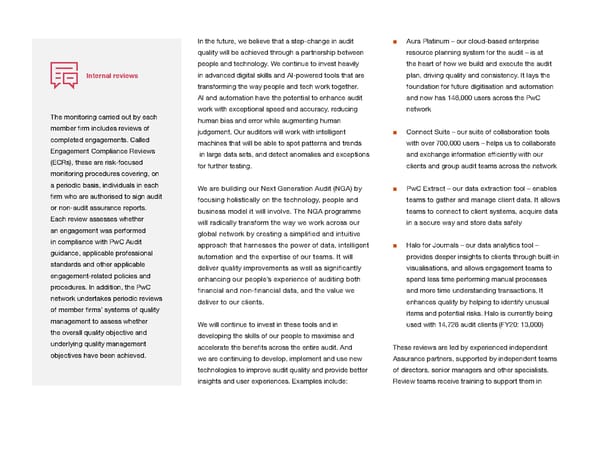
Results of our network internal inspections for audit engagements 2021 2020 2019 2018 2017 Total audit engagement reviews 1,618 1,661 1,768 1,890 1,870 Compliant % 83.3% 82.2% 76.5% 76.0% 72.8% Compliant with Improvement Required % 13.2% 14.0% 18.4% 16.2% 18.4% Total Compliant % 96.5% 96.2% 94.9% 92.2% 91.2% Non-Compliant 56 63 91 147 164 Non-Compliant % 3.5% 3.8% 5.1% 7.8% 8.8% fuliflling their responsibilities, and use a range of through our internal inspection process, 56 (3.5%) were inspection by external regulators. Some 58 of these checklists and tools developed at the network level rated as non-compliant, and, of those, ifve (2020: four) regulators are members of the International Forum of when conducting their review procedures. have been assessed as requiring a restatement of the Independent Audit Regulators (IFIAR). In 2015, in an audited organisation’s ifnancial statements and/or for the initiative aimed at improving audit quality, nine leading Between 2017 and 2021, we reviewed a total of auditor’s report to be withdrawn or reissued. audit regulators represented on IFIAR’s Global Audit 8,807 audits by member ifrms worldwide. The results Quality Working Group, and the six biggest global audit are set out in the table above. Forty-six per cent of We know we can do better and that we need to networks, agreed on a target to decrease the proportion those audits were of ‘public interest entities’ (PIEs) reduce the level of non-compliant audits further. of audits of listed public interest entities identiifed with (essentially listed and other signiifcant companies) We are investing heavily in enhancing audit quality ifndings from regulator inspections on an aggregate basis – and of these PIE audits, 197 were classiifed as non- as described above – and we remain fully committed over a four-year period up to 2019. compliant over the ifve years. to a culture of continuous improvement. A new 25% reduction target was subsequently established In cases where an audit is deemed to be non-compliant, Monitoring by audit regulators with the Global Audit Quality Working Group for the period we consider what, if any, impact this may have on from 2019 to 2023 with an expanded group of 25 audit the ifnancial statements of the entity. For the 2021 In addition to our internal review programme, regulators. We continue to monitor our progress against eviewedinspection cycle, of the 1,618 audits that we r our member ifrms are subject to monitoring and this target for regulatory inspection results.
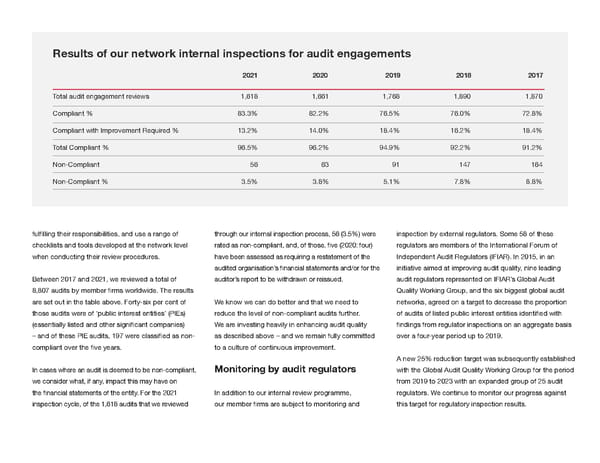
Risk How we identify and manage key risks and engage with both network standards and policies (and the with our stakeholders compliance monitoring process), as well as legal and regulatory requirements. Identifying, managing and planning for the mitigation of risk is an essential part of running any business. The Network Leadership Team provides strategic At PwC, we work with many organisations across the direction (including in the area of ERM). The Chief globe to help them deal with the growing risks they Risk Ofifcer (CRO) is responsible for network risk face in our increasingly complex world. We also invest management, including ERM. signiifcant time and resources in anticipating and managing the risks faced by PwC. Members of the Global Leadership Team have ownership of some of the most signiifcant risks and At PwC, the Board of PwCIL (Global Board) provides set the guidelines for the compliance and monitoring oversight, review and approval of our network associated with them. Line of service leaders are enterprise risk management (ERM) approach responsible for the quality management systems within and focus. The Risk Committee of the Board is their own line of service. responsible for monitoring key risks and responses, quality assurance, the network’s overall risk The Network Risk Council provides strategic direction management framework, and overseeing compliance and advice for the network risk management strategy,
including consideration of strategic risks and input ■ the conifdence of clients and other key to the network ERM programme. The Network Risk stakeholders (including regulators and Council is composed of the Global Markets leader; governments) CRO; Chief Administrative Ofifcer; Global Chief Information Technology Ofifcer; Global General ■ legal and regulatory compliance across the Counsel; Chief Ethics & Compliance Ofifcer; Global network Clients and Industries leader; Purpose, Policy & Corporate Responsibility Leader; and the Global ■ achievement of the network strategy, including Security Leader. its purpose The PwC network and member ifrms take a rigorous ■ the ability of member ifrms to recruit and retain approach to ERM. The risks with the highest potential key talent in signiifcant parts of the business impact for the PwC network are identiifed on an annual basis. These key network risks (KNRs) and their related The current KNRs are as follows. signiifcant mitigation plans are reviewed by the Global “In a rapidly-changing world, it is vital Board and speciifcally its Risk Committee. Quality and compliance: that we work together as a network to understand the risks faced by PwC and KNRs are identiifed as risks which have the potential ■ Client and service quality: Failure in client implement effective responses to mitigate to either: acceptance or continuance, or failure to them. A key part of that mitigation is how manage service delivery quality in existing and PwC communicates and engages with our ■ undermine the achievement of the network new services with cross-border and network key stakeholders across the world.” strategy and business objectives, or implications Paddy Carney, ■ fundamentally damage the network and ■ Compliance: Failure to manage and comply with FY21 Chair of the Board of PwCIL compromise its future legal or professional requirements, including local Risk Committee policies and standards, leading to regulatory In assessing the signiifcance of risks, consideration is action and/or signiifcant conlficts of interest given to the impact on: ■ Independence: Failure to comply with external ■ revenues across the network of ifrms independence requirements and/or manage the ongoing complexity and changes in ■ client and service quality, and the network’s independence regulations, while attempting ability to fulifl its obligations to regulators, clients to grow the business in new areas and meet and stakeholders changing expectations
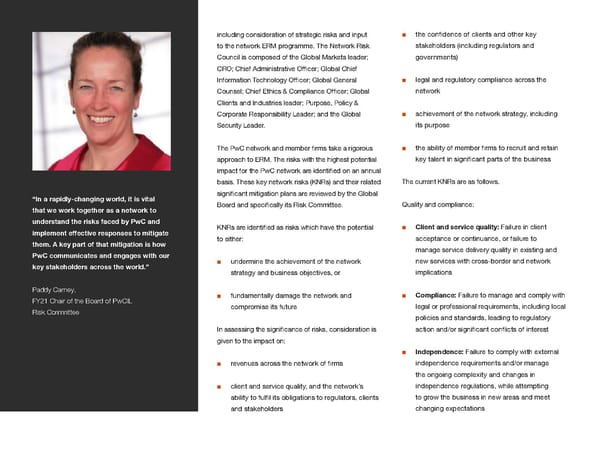
■ Signiifcant matters: Failure to respond ■ Resilience of member ifrms: Failure of promptly and appropriately to a signiifcant a signiifcant member ifrm to withstand an issue in a member ifrm that could have economic, regulatory or political shock, or security-, technology- or client-related complete adequate contingency planning implications for the broader network ■ Technology resilience and availability: Failure to ■ Regulations and/or public policy: Risk of manage critical system availability, impacting the a regulatory change that would hamper our ability to service clients and manage the business ability to operate in a sustainable way ■ People: Failure to attract, retain and train ■ Data strategy and management: Failure appropriate talent to ensure resources can be to manage and maintain ifrm or third- deployed rapidly in order to realise opportunities party data in line with compliance and and make adequate plans for workforce-related regulatory standards changes such as automation; and failure to have the right skills in place to meet clients’ changing ■ Information and cyber security: Failure to needs. In the context of the COVID-19 pandemic, manage the security of ifrm or third-party resilience with regard to people includes the information, causing legal, reputational and need to respond to the health emergency, adopt brand damage to the network different virtual and socially distanced business practices, and address the challenges of ensuring Network resilience: a successful ‘return to ofifce’ strategy ■ Black swan events: Failure to prepare Market risks: for market events with network-wide implications which require an immediate ■ Technology-enabled disruption: Failure to response, such as a regulatory change or a prepare for and respond to disruption, including macroeconomic disruption like a pandemic. bringing new services and solutions to the market with speed and agility ■ Green swan events: Failure to prepare for environmental events with network-wide ■ Strategy execution: Failure to ensure implications in terms of immediate/disaster relevance and meet client expectations due to response, reputational damage and incomplete implementation of core elements of potential macroeconomic impact the network strategy
■ Investment: Failure to ensure sufifcient to the professional regulations and standards investment in future growth areas and under which we operate (including those related to reinvestment in existing services auditor independence) remain as important as ever. Similarly, the security and resilience of our systems Societal risks and trust: and technology infrastructure, and the resilience of the individual member ifrms that provide our global ■ Societal risks and trust: Failure to anticipate and reach and capability, are key to their ability to recruit respond to market and societal expectations or and retain the right staff both to service our existing engage in the broader societal agenda businesses and clients, and also to explore future opportunities for expansion and development. ■ Purpose, values and behaviours: Failure to adopt and live our values. The COVID-19 pandemic has underlined the importance of managing certain risks. In particular, ■ Climate: Failure to review and consider the it highlighted risks related to the resilience of our impact of climate change on the network and technology infrastructure, which underpinned all of our prepare for its implications professional services as our 295,000 people switched to working remotely. In addition, it underscored the Network mutuality and speed of response: importance of mitigating risks that could affect our people, both in terms of keeping them safe through the ■ Network mutuality/alignment: Failure of health emergency and ensuring their mental wellbeing member ifrms to act collaboratively, due to as we moved to continued remote working. conlficting regional and national priorities in the external environment The challenges inherent in the ADAPT framework (increasing wealth disparity, technology disruption, ■ Strategy execution: Failure of member ifrms to demographic pressures, polarisation and a decrease in execute multiple priorities simultaneously trust) not only underpin the reasoning behind The New Equation strategy, but are also radically changing the As with most other businesses, the most signiifcant business context in which we operate. risks facing the network are relatively constant over time. They relfect risks that are inherent to the nature We are acutely aware of the impact that we have of the business, and include the response to changes on the world around us and the need to work with in strategy and the external environment. Accordingly, our stakeholders to manage those impacts more the risks we face around ensuring the quality of our effectively. As an example, the network now clearly services, meeting our legal obligations, and adhering recognises that the world is facing a series of
potentially existential threats around climate change. and rules. This includes the compliance As a major international organisation and employer, by member ifrms of the network with audit we need to play our part in addressing these threats. independence rules and regulations Accordingly, this year marks the ifrst time we have formally recognised this risk within the network’s ■ Our ability to meet the evolving requirements of ERM structures and processes. regulatory and public policy PwC’s network ERM standard requires each ■ The compliance by member ifrms with member ifrm to develop an ERM programme applicable data management standards with roles and responsibilities for identiifcation, prioritisation and mitigation of enterprise-level risks. ■ The ability of member ifrms to safeguard and This programme identiifes the most signiifcant risks manage data appropriately that could impact the member ifrm, using the KNRs as a major input. For every risk identiifed, each ■ The quality of our information and cyber member ifrm is required to assess the probability of security processes and procedures the risk occurring, its potential impact, and whether the risk is operational, forward-looking or emerging, ■ The alignment of the behaviours of member and then develop an appropriate response. ifrms and our partners or staff with our values and societal expectations Material issues impacting stakeholders ■ The resilience of member ifrms to withstand economic, regulatory and political shocks The issues that are of concern to our key external stakeholders are assessed and taken into account as ■ The resilience of critical network and member part of the process to identify KNRs. ifrm technology systems These can be summarised as follows: ■ Our ability to attract, retain, train and deploy the right people to ensure quality delivery ■ The quality of work performed for clients and and innovation delivery of sustained outcomes ■ The maintenance of the PwC brand and the ■ Our compliance with international and local conifdence it gives to investors and clients in laws, regulations and professional standards our work and deliverables
PwC’s key internal and external stakeholders: Investment community Think tanks Suppliers Government Partner Regulators organisations Professional Material Standard and trades Clients issues Academics setters bodies Potential NGOs clients Potential colleagues Alumni PwC Partners PwC Colleagues Internal stakeholders External stakeholders
Engaging with our stakeholders PwC engages with stakeholders at both the process of commenting on both ifnancial network and individual member ifrm levels. and non-ifnancial reporting consultations. Details of how PwC communicates with certain stakeholders at the member ifrm level can be Regulators: We work closely with our found in individual ifrms’ transparency reports. regulators across the world, particularly on efforts to enhance audit quality. Some examples of how PwC engages at a network level are described below. These Think tanks: Being involved in key examples are by no means exhaustive - they’re discussions on issues such as climate only an indication of the multiple ways that PwC change and social inequality is a top priority actively engages with its stakeholders on key for PwC and a key part of our work to fulifl issues throughout the course of the year. our purpose. Our People: PwC engages with its people across Investors: As the world’s largest network the world on a continuous basis, both locally and of audit ifrms we play a key role in the network-wide. functioning of the capital markets. Understanding the views and needs of Clients: We work with over 200,000 organisations investors is very important to us. across the world ranging from individuals to the world’s largest corporations. Alumni: There are many thousands of PwC alumni across the world and they remain an Standard setters: PwC actively participates in important part of the PwC community.
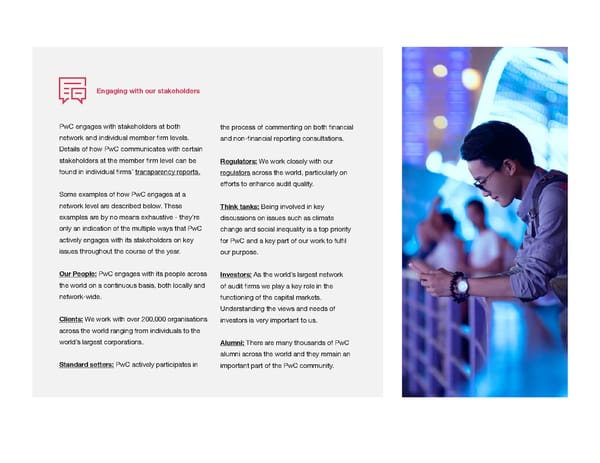
PwC’s approach to knowing ■ establish their client’s identity (including the our clients identiifcation of ultimate beneifcial owners where required) We demonstrate our integrity by knowing the identity of our clients and others with whom we do business, ■ not provide any service, or enter into any and adhering to applicable standards on anti-money business relationship, that could constitute laundering. Where we suspect criminal behaviour, we them or a ifrm being involved in direct or take appropriate action. indirect money-laundering activities The PwC standard on ethics and compliance setsOur policy and guidance pr ovides practical and out how PwC member ifrms should mitigate the detailed explanations that explain concepts risk that they inadvertently become involved insuch as when to do the checks and what to look actual or potential money-laundering activities.for. Each member ifrm is r equired to establish a As most legislation on anti-money laundering isreporting procedur e in place for any partner or staff based on the Financial Action Task Force (FATF) member to report any knowledge or suspicion of recommendations as a baseline, the PwC standarmoney laundering.d is consistent with these recommendations and the Our clients work with us because they trust PwC risk-based approach guidance for accountants. and expect quality service. For this reason, we The standard requires each PwC member ifrm to continually seek to enhance our standards to establish systems, policies and procedures to mitigate combat ifnancial crime. As a network, we are in the the risk of being, directly or indirectly, involved in process of implementing new Network Know Your money laundering or terrorist ifnancing. The speciifc Client (KYC) policies, procedures and technology standard requirements for each PwC member ifrm are to help assess the risks related to our new and described in the following section. existing clients and the services we provide to them, while also driving a consistent approach to The standard also sets out the core requirements and KYC across the PwC network. This new approach prohibitions for every partner and member of staff. It to KYC will help us monitor risk proifle changes to is made very clear that engaging in money-laundering the client during engagements. It will also provide practices is illegal and unacceptable behaviour, and transparency and comprehensive information partners and staff have obligations to assist in the about our clients on a global basis to support us in prevention of money laundering. Speciifcally, partners making informed decisions that protect our brand and staff in member ifrms must: and reputation.
PwC’s approach to anti-corruption ■ taking steps to identify and resolve any departures from or violations of PwC network and local policies Corruption is at the centre of some of the world’s most pressing problems. PwC is opposed to ■ annually undertaking monitoring to assess compliance corruption in any form and recognises the importance with this standard as well as PwC network and local of making smart choices when it comes to its policies and guidance, and resolving any deifciencies, business relationships. We think carefully about our where identiifed actions to avoid engaging in or facilitating bribery, corruption, money laundering, and/or terrorist The standard also sets out requirements for every partner ifnancing activities. and staff member. It is clear that engaging in corrupt practices is not acceptable behaviour. Speciifcally, partners The PwC standard on ethics and compliance speciifcally and staff in member ifrms must not: sets out how member ifrms are expected to identify and mitigate the risk of bribery and corruption in their ■ engage in bribery or any other corrupt practices, activities. It is consistent with the principles of the UK including the giving/receiving of preferential treatment Bribery Act 2010 and the U.S. Foreign Corrupt Practices that may be perceived as a bribe Act of 1977. The standard requires each member ifrm to establish systems, policies and procedures for the ■ solicit, accept, offer, promise or pay a bribe or prevention of bribery and corruption. It sets out speciifc improper payment, either directly or through a third requirements for each member ifrm, including: party. This includes so-called ‘facilitating payments’ or ‘facilitation payments’ ■ appointing an experienced individual who, with appropriate leadership oversight, is responsible for Our policy and guidance provide practical and detailed implementation of the requirements of this standard explanations to clarify dififcult concepts, such as what may constitute a bribe or corrupt behaviour and what is considered ■ annually preparing a risk assessment to evaluate a ‘gift’ or other preferential treatment. Each member ifrm is (a) the level and type of risks the ifrm faces and (b) required to establish a reporting procedure for any partner or the policies and procedures the ifrm uses to comply staff member to disclose if they have unwittingly been involved with this standard and/or to respond to local risks in any activity that may have contravened this standard. ■ training all personnel (including new joiners) Each year, all partners and staff at PwC member ifrms annually on the PwC network and local policies are required to sign a personal anti-corruption and guidance compliance conifrmation.
In FY21, among our 21 largest ifrms, one ■ Integrity – to be straightforward and honest in professional and business relationships. employee was dismissed from a ifrm for all professional and business relationships This includes not to disclose any such violating that ifrm’s internal anti-corruption information to third parties without proper ■ Objectivity – to not allow bias, conlfict of and speciifc authority, unless there is policy. The incident involved a PwC employee demanding cash payments from an individual interest or undue inlfuence of others to override a legal or professional right or duty to who worked as a contractor. professional or business judgements disclose, and not to use the information for the personal advantage of the professional Managing independence ■ Professional competence and due care – to accountant or third parties maintain professional knowledge and skill at the Ethics, independence and objectivity level required to ensure that a client or employer ■ Professional behaviour – to comply with receives competent professional services relevant laws and regulations and avoid any based on current developments in practice, action that discredits the profession Ethics legislation and techniques; and to act diligently At PwC, we adhere to the fundamental and in accordance with applicable technical and All member ifrms must also comply with our principles of ethics set out in of the International network standards, which cover a variety professional standards Ethics Standards Board for Accountants (IESBA) of areas related to ethics and compliance, Code of Ethics for Professional Accountants ■ Conifdentiality – to respect the conifdentiality including ethics and business conduct, (“the IESBA Code”), which are: of information acquired as a result of independence, anti-money laundering, anti-
trust and fair competition, anti-corruption, information situation or when they see any instances of behaviour protection, ifrms’ and partners’ taxes, sanctions laws, inconsistent with the Code. internal audit, and insider trading. We take compliance with these ethical requirements seriously and strive We have just completed the network-wide to embrace the spirit and not just the letter of those implementation and rollout of the new PwC Ethics requirements. Ethical conduct is the expected Helpline and case management system. Each behaviour of all of our partners and staff, and they member ifrm has a conifdential and secure tier of the undertake annual mandatory training and submit helpline where concerns may be reported and will be annual individual compliance conifrmations as part investigated. The Ethics Helpline is available to all PwC of our system to support appropriate understanding partners and staff as well as third parties. of the ethical requirements under which we operate. Partners and staff uphold and comply with the In order to deal with any concerns regarding the standards developed by the PwC network, and the movement of people between PwC and government, leadership of each ifrm monitors compliance with PwC has put in place a set of principles that our these obligations. network expects to be followed by all ifrms when hiring a former government ofifcial or when someone from Each member ifrm is required to uphold the PwC PwC takes a senior post in government. values and PwC purpose. In addition, each PwC member ifrm has adopted the PwC network standards, Objectivity and independence including the PwC Global Code of Conduct (“the As auditors of ifnancial statements and providers of Code”) and related policies that clearly describe other types of professional services, PwC member ifrms the behaviours expected of our partners and staff and their partners and staff are expected to comply members. These behaviours will enable us to build , integritywith the fundamental principles of objectivity public trust. Because of the wide variety of situations and professional behaviour. In relation to assurance that our professionals may face, our standards provide clients, independence underpins these requirements. guidance under a broad range of circumstances, but all Compliance with these principles is fundamental to with a common goal: to do the right thing. serving the capital markets and our clients. Upon hiring or admittance, all staff and partners are The PwC Global Independence Policy is based on provided with the Code. They are expected to live by the International Independence Standards included the values expressed in the Code in the course of their in the Code, supplemented by the independence careers at PwC. They have a responsibility to report requirements of the United States Securities and and express concerns, and to do so fairly, honestly, Exchange Commission (SEC), the Public Company and professionally when dealing with a dififcult Accounting Oversight Board (PCAOB) of the United
States, and the EU Audit Regulation of 16 April as joint ventures and joint marketing) and 2014. It contains minimum standards with which on the purchasing of goods and services PwC member ifrms have agreed to comply, including acquired in the normal course of business processes that are to be followed to maintain independence from clients, when necessary. ■ acceptance of new audit and assurance clients, and the subsequent acceptance of Each member ifrm has a designated partner (known non-assurance services for those clients as the ‘Partner Responsible for Independence’ or ‘PRI’) with appropriate seniority and standing. This In addition, there is a Network Risk partner is responsible for implementation of the PwC Management Policy governing the Global Independence Policy, including managing independence requirements related to the the related independence processes and providing rotation of key audit partners. support to the business. The partner is supported by a team of independence specialists. These policies and processes are designed to help PwC comply with relevant professional and Independence policies and practices regulatory standards of independence that apply The PwC Global Independence Policy covers the to the provision of assurance services. Policies following areas among others: and supporting guidance are reviewed and revised when changes arise, such as updates to ■ personal and ifrm independence, including laws and regulations, changes to the Code, or policies and guidance on the holding of ifnancial changes in response to operational matters. interests and other ifnancial arrangements such as bank accounts and loans by partners, staff, Each ifrm supplements the PwC Global the ifrm and its pension schemes Independence Policy as required by local regulations in cases where these requirements ■ non-audit services and fee arrangements. The are more restrictive than the global policy. policy is supported by Statements of Permitted Services (SOPS), which provide practical Independence-related systems and tools guidance on the application of the policy in As a member of the PwC network, each PwC respect of non-audit services to audit clients and member ifrm has access to a number of related entities systems and tools which support member ifrms and their personnel in executing and complying ■ business relationships, including policies and with our independence policies and procedures. guidance on joint business relationships (such
These include: non-audit services engagement leader and the audit engagement leader regarding a proposed ■ The Central Entity Service (‘CES’), which non-audit service, documents the analysis of any contains information about corporate entities potential independence threats created by the including all PwC audit clients and their related service and proposed safeguards (where deemed entities (including all public interest audit clients necessary), and acts as a record of the audit and SEC-restricted entities) as well as their partner’s conclusion on the permissibility of the related securities. CES assists in determining service the independence restriction status of clients of the member ifrm and those of other PwC ■ The Global Breaches Reporting System, which member ifrms before entering into a new non- is designed to be used to report any breaches of external auditor independence regulations audit service or business relationship. This (e.g. those set by regulation or professional system also feeds Independence Checkpoint and Authorisation for Services requirements) where the breach has cross- border implications (e.g. where a breach ■ ‘Independence Checkpoint’, which facilitates the occurs in one territory which affects an audit pre-clearance of publicly traded securities by relationship in another territory). All breaches all partners and managerial practice staff before reported are evaluated and addressed in line acquisition and is used to record their subsequent with the Code purchases and disposals. Where a PwC member ifrm wins a new audit client, this system ■ The Global Joint Business Relationship system, automatically informs those holding securities in which provides a standardised process and that client of the requirement to sell the security system for the assessment, approval and ongoing where required monitoring of joint business relationships ■ Automated Investment Recording (‘AIR’), which Each member ifrm also has a number of speciifc is a global PwC solution that simpliifes portfolio systems, which could include, for example, a rotation maintenance for PwC partners and staff in tracking system that monitors compliance with audit Independence Checkpoint by automating the rotation policies for engagement leaders and other recording of security transactions using direct daily key audit partners involved in an audit. feeds from participating brokers Independence training and conifrmations ■ Authorisation for Services (‘AFS’), which is a global Consultation by engagement teams on independence system that facilitates communication between a issues is embedded in the PwC culture. Teams are
encouraged to consult with independence specialists requirements. In addition to the conifrmations described whenever a matter is complex, or in the case of any above, as part of this monitoring member ifrms perform: doubt about what to do. ■ compliance testing of independence controls PwC’s processes are supported by comprehensive and processes training of partners and staff. Each member ifrm provides all partners and staff with annual or ■ personal independence compliance testing of ongoing training in independence matters. This a random selection of, at a minimum, partners, training is typically based around milestones related as a means of monitoring compliance with to a change in position or role, changes in policy or independence policies external regulation, and, as relevant, provision of services. Partners and staff receive computer-based ■ an annual assessment of the member ifrm’s training on independence policy and related topics. adherence with the PwC network’s standard Additionally, training is delivered to members of the on independence practice on an as-needed basis by independence specialists and risk and quality teams. The results of monitoring and testing are reported to the ifrm’s management on a regular basis. All partners and practice staff are required to complete an annual compliance conifrmation. This involves Each member ifrm has disciplinary policies and conifrming their compliance with relevant aspects of mechanisms in place that promote compliance with the member ifrm’s independence policy, including independence policies and processes, and require their own personal independence. In addition, all any breaches of independence requirements to be partners conifrm that all non-audit services and reported and addressed. This includes a discussion with business relationships for which they are responsible the client’s audit committee regarding the nature of a comply with policy and that the required processes breach, an evaluation of the impact of the breach on the have been followed in accepting these engagements independence of the member ifrm and the engagement and relationships. These annual conifrmations are team, and the need for actions or safeguards to maintain supplemented by periodic and ad-hoc engagement- objectivity. Although most breaches are minor and level conifrmations for certain clients. attributable to an oversight, all breaches are taken seriously and investigated as appropriate. The member Independence monitoring and disciplinary policy ifrm also follows any supplemental local requirements Each member ifrm is responsible for monitoring relating to the reporting of breaches. The investigations the effectiveness of its quality control system of any identiifed breaches of independence policies in managing compliance with independence also serve to identify the need for disciplinary measures,
Revenues from audit clients in major indices FY19 72% 28% clients and their related entities. These documents are based on the International Independence Standards established by the IESBA, as well as the rules and FY20 71% 29% standards issued by other regulatory authorities. Member ifrms supplement this with local standards. FY21 70% 30% When our member ifrms are providing non-audit services to audit clients, they are required to provide only those non-audit services that are permissible Audit services under the applicable rules. In some instances, these Non-audit services non-audit services are required by law or regulations to be performed by the auditor. However, while we have the right controls in place regarding the improvements in systems and processes, and for provision of non-audit services to audit clients, we additional guidance and training. audit engagement partner responsible for services to are also conscious of the threats to independence in that entity (or a related entity). A new Authorisation for appearance that can be created by the provision of Review Service (AFS) system launched in FY20 has increased non-audit services to our audit clients. So we assess PwC reviews each ifrm’s compliance with professional the effectiveness and efifciency of the scope of this threat as part of our acceptance processes. standards and policies, including those relating services review and approval process. to independence, through inspection activities Our Network Risk Management Policy also requires directed at a risk-based sample of member ifrms. In FY21, as part of our ongoing improvement efforts, that engagement teams who perform certain non- Any departure from independence requirements the AFS system was replatformed to further enhance audit services engagements for SEC-restricted entities in the PwC independence policies and/or external our independence control processes and integrate obtain approval from an independence specialist. These regulations is evaluated. them more closely with our other risk processes. reviews are performed by independence specialists who To support these improvements and promote make up a global Centre of Excellence (CoE). Controls over non-audit services understanding of the independence requirements that Before providing non-audit services to entities that are apply, PwC has developed a comprehensive set of In FY21, 72% of revenues from our audit clients in subject to independence restrictions, all member ifrms policy and supplementary guidance documents that major global indices were for audit services. Twenty are required to obtain authorisation from the group address the provision of non-audit services to audit eight per cent were for non-audit services (FY20: 29%).
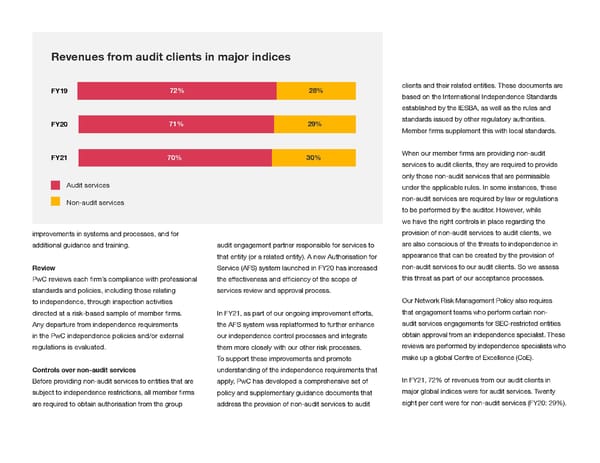
As a global board we work closely with PwC’s global leadership teams. This work includes reviewing their performance against our agreed strategy and objectives; setting, updating and overseeing the implementation Governance of the standards by which every member ifrm in the PwC network has agreed to abide; and liaising with the governance bodies of individual ifrms in the PwC network to share expertise and best practice. How we are organised, the standards we expect and the codes of conduct we live by In FY21 the board’s key areas of focus were the development of the new PwC network strategy - The Introduction from the Governance Chair of PwCIL, New Equation - as well as our ongoing response to Lisa Sawicki the COVID-19 pandemic, the quality of the services we provide and the impact of major initiatives such as I was honoured to be elected as the chair of the our New world. New skills. programme. PwC network’s global governance board in June 2021, having served as a global board member for As part of our continuous improvement efforts, the previous four years. I very much look forward to in FY21 the global board commissioned a chairing the global board and working with my fellow governance effectiveness review of itself. The board board members, including our two independent board is currently reviewing and implementing the key members Troy Paredes and Jan Sijbrand. recommendations. In the year ahead, the board is maintaining a tight focus on the quality of PwC’s During my ifrst term as a global board member, we services and reviewing the execution and impact of made some signiifcant strides towards being more The New Equation across the PwC network. open and transparent about how the PwC network is organised, and about the standards and behaviours We are encouraging all our member ifrms to have that we expect of our leadership team, member ifrms external board members on their governance bodies. and of all our people across our network. We also Please take a look at the progress we have made focused very closely on the quality of the services we in this area - along with many others - in this global provide to our stakeholders across all our businesses annual review. and right around the world. You can read more on these topics in this global annual review. Lisa Sawicki, Governance Chair of PwCIL
Legal structure, leadership and As members of the PwC network, PwC ifrms share governance knowledge, skills and resources. This membership facilitates member ifrms to work together to provide Network structure and member ifrms quality services on a global scale to international and In many parts of the world, the right to practise audit local clients, while retaining the advantages of being and accountancy is granted only to ifrms that are local businesses – including being knowledgeable majority-owned by locally qualiifed professionals. about local laws, regulations, standards and practices. PwC is a global network of separate ifrms, operating locally in 156 (FY20: 155) countries around the world. Network Leadership Team As of 30 June 2021, the PwC network has 637 active The Network Leadership Team (NLT) sets the overall and client-facing entities. The partners in each ifrm strategy for the PwC network and the standards to elect a Territory Senior Partner to lead that ifrm for a which member ifrms agree to adhere. In FY21 PwC’s ifxed term. The length of this term, and the maximum latest strategy - The New Equation - was launched “Consistent high standards across number of terms for which any Territory Senior Partner and its roll-out began across the PwC network. The everything we do are fundamental to the can be elected, are set by each member ifrm. NLT is made up of the Global Chairman of the PwC success of PwC. Our global governance network - currently Bob Moritz; the Territory Senior board plays a key role in overseeing the PricewaterhouseCoopers International Limited Partners of the member ifrms in China - Raymund rigorous standards that every PwC ifrms are members of PricewaterhouseCoopers Chao, the UK - Kevin Ellis, and the US - Tim Ryan; PwC member ifrm agrees to comply International Limited (PwCIL), a UK private company and a iffth member appointed by the Global Board, with and the monitoring of compliance.” limited by guarantee that facilitates coordination currently the Chairman of PwC Europe - Harald between member ifrms. PwCIL does not practise Kayser. The Global Chairman of the PwC network Lisa Sawicki, accountancy or provide services to clients. It works and the iffth member may serve for a maximum of Governance Chair of PwCIL to develop and implement policies and initiatives two terms of no more than four years each in their to create a common and coordinated approach for respective capacities. The terms of the other NLT member ifrms in key areas such as strategy, brand, members are limited by the arrangements in their risk, and quality. respective ifrms. The NLT met 32 times in FY21 (FY20: 32). In FY21 all NLT meetings were held virtually. Member ifrms have the right to use the PwC name and to request the resources and methodologies Strategy Council of the PwC network. In return, member ifrms agree The Strategy Council, which is made up of the to abide by common policies and standards. Each Territory Senior Partners of the 21 largest member member ifrm agrees to pay its allocated share of ifrms and regions, agrees on the strategic direction network costs. of the network and facilitates alignment for the
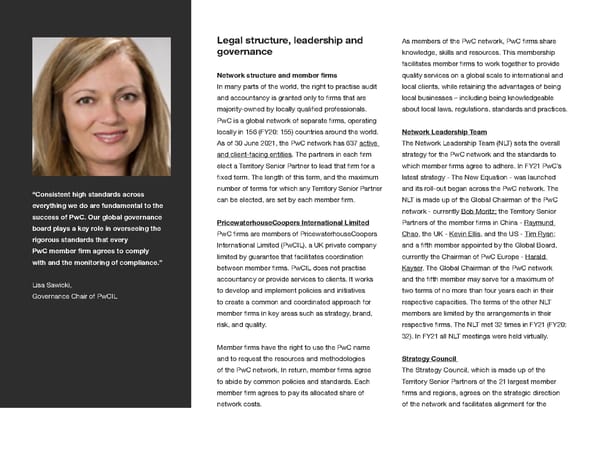
execution of strategy. The Strategy Council is providing strong alignment on matters of strategy, also have experience and competencies across the expected to meet at least quarterly. In FY21 the quality and execution among member ifrms. spectrum of Environmental, Social and Governance Strategy Council met 11 times (FY20: 11). All (ESG) issues, including diversity and inclusion, social meetings in FY21 were held virtually. You can view a short biography of each board mobility, renewable energy and corporate governance. member here including details of any other boards or Global Leadership Team bodies that they may serve on. The board currently has four standing committees: The Global Leadership Team (GLT) is appointed by, the Governance Committee, Markets Committee, Risk and reports to, the NLT. Its members are responsible Having a broad range of backgrounds and Committee and Operations Committee. The board for leading teams drawn from PwC member ifrms to experiences is an essential ingredient in the board may establish other committees from time to time. coordinate and lead PwC’s activities across all areas discussions. In addition to their technical expertise of the business. The GLT met 10 times in FY21 (FY20: across a range of disciplines, our board members Below is a summary of each Committee’s focus areas. 9). In FY21 all GLT meetings were held virtually. Global Board Committee Committee focus areas The board of PwCIL is comprised of 20 members who are responsible for the governance of PwCIL and Governance ■ Network governance and leadership matters, including succession planning the PwC network, oversight of the NLT, and approval of network standards. With the exception of two Markets ■ Relationships (including clients, joint business relationships) and markets external, independent directors, the other 18 elected ■ Portfolio of services (including delivery models) members are full-time partners of PwC member ifrms ■ Brand positioning from around the world who are not members of the ■ Corporate Responsibility and Public Interest senior leadership teams of those ifrms. Of the current 18 elected Board members, eight are women. Operations ■ Finance and operations including network investments and performance ■ People, including up-skilling, culture and values Board members are elected every four years by ■ Technology strategy, enablement and execution, including data protection partners exercising their votes through their member ifrms. The current board, with members from 13 Risk ■ Enterprise-wide risk management and legal matters countries, took up ofifce in June 2021. Board ■ Quality, network standards, ethics & compliance and policies members may serve a maximum of two terms of four ■ Firm admissions years each. Six of the board members are in their second term. Seven board members currently serve Note: During FY21, the Board met 13 times (FY20: 12). Collectively, the board’s standing committees met 31 times (FY20: 36). Each meeting in FY21 was virtual. as chair of their member ifrm’s governance body,
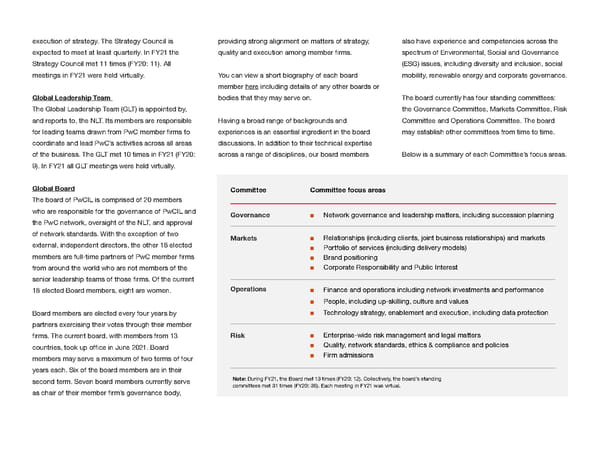
Governance boards in member ifrms ■ PwC Netherlands has a wholly external oversight All member ifrms are required to have a separate board as required by Dutch legislation local governance body to oversee the performance of the ifrm’s leadership and to provide direction and ■ PwC Italy has an independent director on its audit guidance. While these governance boards have ifrm board traditionally been made up of partners from that ifrm, as with the global board, external people are Transparency increasingly joining these boards or alternatively member ifrms are setting up additional advisory Many PwC member ifrms publish annual transparency bodies made up of external members. We regard reports disclosing information relating to their legal this as good practice and are encouraging its structure and ownership, governance structure, internal wider adoption across the member ifrms in the quality management systems, quality assurance, PwC network. For example, the majority of the 21 education and independence practices, audit revenue, Strategy Council ifrms either have, or are taking and partner remuneration. These reports, many of which are set out in accordance with the requirements steps to have, some form of external oversight, either in the form of external governance board of the relevant local laws and regulations, such as members or advisory bodies: article 13 of the EU regulation No. 537/2014, are designed to give stakeholders insights into key aspects ■ PwC US currently has two external members on of PwC member ifrms, and to aid understanding of its board how PwC member ifrms are organised and deal with key issues such as quality management. To read the ■ PwC UK has ifve independent non-executive transparency reports for PwC member ifrms click here. directors on its Public Interest Body Network standards and policies ■ PwC Canada has four external directors on its board PwC member ifrms agree to abide by certain standards including: ■ PwC Switzerland has a Public Interest Committee consisting of ifve external members Strategy and alignment: Each member ifrm shall implement a strategy which is aligned with the PwC ■ PwC Australia has a three-member external audit network’s strategy and implement the strategic quality advisory board initiatives set out by PwC’s NLT.
Investment: Each member ifrm shall annually invest Enterprise Risk Management: Each a percentage of its net revenues to fund investments, member ifrm shall establish an enterprise risk at levels to be agreed annually with PwC’s NLT. management programme and integrate this Investments are used to fund, among other things, within its business operations. It will also perform enhancements in quality, risk management, an enterprise-wide risk assessment which technology developments and acquisitions. identiifes and prioritises the components of enterprise-level risk, and develop speciifc action Technology: Each member ifrm shall implement plans to mitigate each identiifed risk. the network technology strategy, including speciifc policies on information security and data protection. People: Each member ifrm shall put in place an appropriate strategy, policies, processes and Quality: Each member ifrm shall establish business systems to attract, retain and develop a diverse processes that promote and facilitate the delivery of group of people of the quality needed to deliver quality services and comply with all applicable PwC services and operate its business. network and professional standards and requirements. These include having processes in place to enable Ethics & Compliance: Each member ifrm shall ifrms to provide quality services in a manner that embed a strong culture of ethics and business meets relevant stakeholder expectations, and conduct in its people and in the way they member ifrms only accepting clients and undertaking conduct their business, including training for all engagements that are consistent with PwC’s network new joiners in ethics and compliance and annual risk management policies. training and assessment for all employees. Brand: Each member ifrm shall consistently relfect Independence: Each member ifrm shall establish the attributes of the PwC brand, including brand systems, policies and procedures designed to positioning, brand personality and visual identity, ensure that the ifrm and its people comply with in all external and internal activities and messages. independence laws and regulations, including PwC’s minimum requirements and policies. Governance: Each member ifrm shall have an oversight function, independent from management, In addition to the common standards which practises continuing good governance. and policies of the PwC network, PwC member ifrms also have access to common methodologies, technologies and supporting materials for many services.
■ Each year, every member ifrm completes an These methodologies, technologies and materials help member ifrms, partners and staff perform their annual self-assessment of its compliance work more consistently, and promote quality while with network standards and related policies and procedures and conifrms whether it is in supporting their compliance with the way PwC compliance with the standards. The member does business and in line with our strategy - The New Equation. ifrm supports its self-assessment with appropriate evidence in required areas Monitoring compliance with network standards and policies ■ As part of the self-assessment, a senior partner of each member ifrm signs a conifrmation as to By PwC member ifrms: Each member ifrm whether the member ifrm was in compliance, must monitor its controls and the effectiveness in all material respects, with each network of its quality management systems in a manner standard. The senior partner also commits appropriate to the level of risk in its environment, to address any remedial actions identiifed as assessing in particular whether the policies and a result of the self-assessment. To address procedures that constitute its system of quality speciifc matters where process improvements management are designed appropriately and are needed, member ifrms, with the assistance operating effectively to provide reasonable of the network, prepare, review and execute assurance that its work is being performed in action plans compliance with laws, regulations and professional standards. This includes performing annual risk ■ Each self-assessment is independently assessments and action plans, reviews of its evaluated by a core team of specialists and systems and procedures, transaction testing feedback is provided to the member ifrm, where appropriate, and reviews at the individual where appropriate. Where a member ifrm is engagement level across each line of service. unable to conifrm compliance, in all material respects, with the standards, it must implement At the network level: Each year, using a common a remediation plan which is monitored with the technology platform, PwC member ifrms assess assistance of the network their compliance against the network standards. This platform facilitates the review and assessment of All member ifrm partners and staff complete controls, the establishment of testing requirements, individual annual compliance conifrmations and the collection and evaluation of evidence indicating their understanding of, and compliance relevant to the member ifrm’s assessment: with, those policies which are applicable to them.
Network Review Programme: In addition to the a principles-based guidance, it is designed to help above, we would in a normal year conduct a Network PwC people think about dififcult questions, promote Review Programme (NRP) that coordinates and consultation, and encourage them to speak up where facilitates network-wide reviews that are sponsored/ concerns arise. requested by global leadership. However, these reviews involve on-site physical meetings, which The Code also sets out a common set of have not been possible as a result of the COVID-19 expectations, a key element of which is abiding by pandemic. Once it is safe to travel again the NRP will applicable laws and regulations. If any local law or resume. In the absence of the NRP on-site reviews, regulation is more restrictive than the Code, local law there has been an increased focus on the assessment or regulation governs. and analysis of each ifrm’s reporting against the network standards. Each member ifrm agrees to comply with network standards and policies which complement the The way we do business and principles embodied in the Code. Certain sections Codes of Conduct of the Code are reinforced by PwC’s ethics and compliance standards, network risk management PwC member ifrms undertake their business policies and local supplemental policies, which activities within the framework of applicable seek to address local legislation, regulation and professional standards, laws, regulations and risks. We expect the same standard of behaviour internal policies. They also nurture a culture that from those organisations who work with member supports and encourages PwC people to behave ifrms. Third parties are required to regularly conifrm appropriately, with integrity and ethically, especially their compliance with the PwC Third Party Code of when they have to make tough decisions. PwC Conduct or its equivalent. people have ready access to a wide array of support networks within their respective ifrms – both formal In the area of taxation, it is a general principle that and informal – and technical specialists to help them taxpayers have the right to manage their tax affairs reach appropriate solutions. provided they act within the law. Equally they should also be able to access independent advice The PwC Code of Conduct (the ‘Code’) is applicable on their tax position. However, the dynamic and to all partners and staff in the PwC network. It does complex nature of tax laws - both at a national and not provide detailed guidance on every situation international level - is such that it is not always clear where PwC partners and staff might need to answer where lines should be drawn. To help our clients and the question, “what is the right thing to do?” Instead, our people make informed decisions on tax, taking
into account the relevant considerations, the member available to all PwC partners and staff and ifrms of the PwC network act according to the Global third parties. Tax Code of Conduct. Listen up. Listening and collaboration mean we Complaints and allegations consult with our colleagues so that concerns are heard and addressed in an open and The PwC Code of Conduct and the behaviours we professional manner. We consult with our seek to reinforce are brought to life in numerous ways supervisors, coaches, ethics teams and human for our people, including formal training, leadership capital representatives. They are responsible programmes emphasising a ‘Speak up Culture’ and for addressing and escalating as necessary the ‘Respect at Work’, and in our day-to-day work and issues brought to their attention. handling of complaints and investigations. Follow up. For any allegation, complaint, or Speak up. Speaking up is crucial to our culture at concern, we investigate and address the situation PwC – it is a living example of our values. Speaking in an appropriate way. If a concern is reported, up when something doesn’t seem right demonstrates it is handled with appropriate conifdentiality integrity and that we have the courage to do the and discussed with others only as needed. right thing. It also helps to prevent mistakes and Disciplinary action is taken as appropriate and misconduct, while showing that we care about each in accordance with established accountability other and our business. And it assists us in living up frameworks in each member ifrm. to our commitment to delivering quality outcomes. Everyone within the PwC network – no matter what Non Retaliation. PwC is committed to protecting their level or role – is encouraged and empowered to our people against retaliation when complaints speak up when dealing with a situation that doesn’t are ifled in good faith. Retaliation is serious seem right. Each has a responsibility to report and misconduct that will not be tolerated, and any express their concerns. PwC professional - whether a member ifrm partner or staff member - who takes retaliatory We have just completed the network-wide action will be held accountable. implementation and roll-out of the PwC Ethics Conlficts of interest Helpline and case management system. Every member firm has a confidential and secure tier Given the broad nature of our operations and the of the helpline where concerns may be reported many clients that we serve, PwC frequently faces and will be investigated. The Ethics Helpline is
the risks of potential conlficts of interest. Principles or regulations could override the principles or provide We take any potential conlfict seriously additional requirements with which a member ifrm must and if a conlfict is identiifed, the network When we recruit staff from governments and related comply. However, we expect member ifrms to have a is committed to facilitating member ifrms’ agencies or when our people leave PwC to join those common minimum approach in line with these principles. efforts to take timely steps to address it. organisations, our principles are: Member ifrms maintain internal controls and processes to identify potential conlficts ■ When government ofifcials join PwC, we uphold any and comply with relevant regulations. professional restrictions the government or the law Network programmes reinforce the need imposes on them. Where there are no rules, we put to act in accordance with the PwC Code appropriate restrictions in place of Conduct and frameworks for ethical decision-making at both a member ifrm ■ When government ofifcials join PwC, they do not and network level. The network and represent us in front of those government bodies member ifrms understand that there is they previously represented for a period of at least a greater risk of conlfict, or a perception one year, or for a longer period if prescribed by of such issues by our stakeholders in the government some key areas (including working with government) and there are separate ■ When a senior PwC person joins a body that has principles to deal with these areas. regulatory oversight of PwC and our practitioners, we advise the body of any ongoing ifnancial interest Working with government they have in PwC (e.g. pension arrangements), and ask that the individuals are not involved in making The PwC network has a set of principles decisions about PwC for at least one year and until it expects to be followed by all ifrms when that ifnancial interest concludes hiring a former government ofifcial or when someone from PwC takes a senior ■ So we can uphold the practice outlined in the point post in government. When we refer to above, we take steps to request retired partners to government in this context, the term covers advise us before accepting an appointment with any not only organisations regarded as strictly government body or regulatory agency governmental, but also organisations that regulate or have public oversight of the There will be differences in how these principles apply to professional services that we provide. local circumstances for our member ifrms, as local laws
WEF IBC Metrics In January 2021, PwC became one of the ifrst organisations to publicly endorse the World Economic Forum’s (WEF) Stakeholder Capitalism Metrics. We actively encourage our stakeholders and business partners to consider adopting the metrics for their own reporting. As part of our commitment to promoting transparent and comparable reporting, we are including an overview of our disclosures based on the Stakeholder Capitalism Metrics. We do not consider some of the metrics as material for us as a professional services network and in these cases we provide explanations for these omissions. We have made some real progress in reporting against these metrics this year, but we are committed to going further and to reporting more detail on more metrics in the years to come.
Principles of Governance Our purpose is to build Our values: Each year over 295,000 trust in society and solve PwC partners and staff important problems. Act with integrity, make complete ethics and a difference, care, work compliance training. together, reimagine the possible. Our code of conduct sets out a common framework around how we expect our people to behave and to do the right thing. Ethics helpline: Our global governance board, which has We also have specific codes of conduct for appointed two independent members met We offer a safe place for our work on tax, the third parties we work 13 times in FY21 while its standing our people and third with and principles for those who join PwC committees on governance, operations parties to report a concern from government and vice versa. and risk met 31 times in total. or ask a question. Planet Our 21 largest firms will Total greenhouse gas emissions: Received validation in July be using 100% renewable 2021 for our emission 100% electricity by June 2022. 87,500 tonnes reduction targets from the reduced by 80% over FY20. Science Based Targets In FY21 83% of electricity initiative (SBTi). came from renewable sources. Joined the LEAF (Lowering Emissions Member of the World by Accelerating Forest finance) Coalition, to support what is expected to become Committed to Business Council for net zero by 2030 Sustainable Development. one of the largest ever public-private efforts to protect our tropical forests.
People People by region: People survey results Number of new recruits 84% Are proud to work at PwC Total Americas 73,601 Enjoy working at PwC and 295,371 Asia Pacific 98,876 74% would recommend it as a EMEA 122,894 great place to work 73% Feel they ‘belong’ at PwC Number Employee Gender ratio 90,273 of partners turnover rate 11,897 20.9% Plans to add 100,000 additional jobs by 2026 49.3% 50.6% 0.05% Female Male Not declared Average training Global Gender pay gap data Female internal partner admissions 56 hours per employee published for first time. 29% of total admissions. Prosperity Aggregated revenues of PwC firms Over 39,000 PwC people Investments: US$2.6bn by geographic region (US$ millions) volunteered to support their local communities. No of acquisitions: 9 Gross revenues Americas 18,309 45,142 Asia Pacific 8,862 Volunteering time EMEA 17,971 754,000 hours Gross revenues by Line of Service: Total Assurance 17,073 Employments taxes paid by 21 largest firms 45,142 Advisory 17,029 Net income US$1.6 billion* Tax & Legal 11,040 +19.2% over FY20 *estimate
1. Principles of Governance More Adoption Additional Topic Metric Description information status details Governing Purpose Setting Purpose The company’s stated purpose, as the expression of the means by which Link Full a business proposes solutions to economic, environmental and social issues. Corporate purpose should create value for all stakeholders, including shareholders. Quality of Governance Body of the highest governance body and its committees by: competencies Link Full Governing body composition relating to economic, environmental and social topics; executive or non- Composition executive; independence; tenure on the governance body; number of each individual’s other signiifcant positions and commitments, and the nature of the commitments; gender; membership of under-represented social groups; stakeholder representation. Ethical Behaviour Protected A description of internal and external mechanisms for: Link Full Ethics Adivce 1. Seeking advice about ethical and lawful behaviour and organisational and Reporting integrity; and Mechanisms 2. Reporting concerns about unethical or unlawful behaviour and lack of organisational integrity Anit-Corruption 1. Total percentage of governance body members, employees and Link Partial. business partners who have received training on the organisation’s anti- Planned corruption policies and procedures, broken down by region. to be full 2a). Total number and nature of incidents of corruption conifrmed during adopted by the current year, but related to previous years; FY22. 2b). Total number and nature of incidents of corruption conifrmed during the current year, related to this year. 3. Discussion of initiatives and stakeholder engagement to improve the broader operating environment and culture, in order to combat corruption. Stakeholder Material issues A list of the topics that are material to key stakeholders and the company, Link Full Engagement impacting how the topics were identiifed and how the stakeholders were engaged. stakeholders Risk and Intergrating Risk Company risk factor and opportunity disclosures that clearly identify the Link Full Opportunity and Opportunity principal material risks and opportunities facing the company speciifcally Oversight into Business (as opposed to generic sector risks), the company appetite in respect of Process these risks, how these risks and opportunities have moved over time and the response to those changes. These opportunities and risks should integrate material economic, environmental and social issues, including climate change and data stewardship.
2. Planet More Adoption Topic Metric Description information status Additional details Climate Change Greenhouse Gas For all relevant greenhouse gases (e.g. carbon dioxide, Link Full methane, nitrous oxide, F-gases etc.), report in metric tonnes of carbon dioxide equivalent (tCO2e) GHG Protocol Scope 1 and Scope 2 emissions. Estimate and report material upstream and downstream (GHG Protocol Scope 3) emissions where appropriate. TCFD Fully implement the recommendations of the Task Force Link Full implementation on Climate-related Financial Disclosures (TCFD). If necessary, disclose a timeline of at most three years for full implementation. Disclose whether you have set, or have committed to set, GHG emissions targets that are in line with the goals of the Paris Agreement – to limit global warming to well below 2°C above pre-industrial levels and pursue efforts to limit warming to 1.5°C – and to achieve net-zero emissions before 2050. Nature Loss Land use and Report the number and area (in hectares) of sites In progress We recognise and value the importance of nature and ecological owned, leased or managed in/or adjacent to protected biodiversity highlighted in our Nature Risk Rising report sensitivity areas and/or key biodiversity areas (KBA). produced in collaboration with the World Economic Forum. We are also proud to be part of the newly launched Task Force on Nature Related Financial Disclosures. Given the type of our services, however, our direct use of land is limited. We operate from ofifces in 156 countries and nearly all are located in towns and cities. A certain number of our ofifces have speciifc biodiversity plans and we will continue to share their learnings more broadly across our network. We will also review where we may have ofifces adjacent to protected areas and/or areas of key biodiversity and will share ifndings and insights in future reports. Fresh Water Water Report for operations where material: megalitres of In progress Given the ofifce based nature of our operations, our Availability consumption water withdrawn, megalitres of water consumed and water consumption is limited and has been lower than and withdrawal the percentage of each in regions with high or extremely usual in the last 12 months because a large number of in water stressed high baseline water stress, according to WRI Aqueduct our people have spent the majority of their time working areas water risk atlas tool. Estimate and report the same from home. A number of our territories have set water information for the full value chain (upstream and consumption targets and track their progress and downstream) where appropriate. have reviewed the levels of water stress for the areas in which they operate. We will continue to share these ifndings and learnings more broadly across the network and will share any material insights in future reports.
3. Prosperity More Adoption Topic Metric Description information status Additional details Community and Total tax paid The total global tax borne by the company, including Link Full It is a characteristic of partnerships that payment Social Vitality corporate income taxes, property taxes, non-creditable of the taxes on the income produced in the VAT and other sales taxes, employer-paid payroll taxes, partnership is an obligation of the individual and other taxes that constitute costs to the company, by equity partners. Given this and the separate legal category of taxes. structure of PwC network member ifrms, we do not collect information at a global level on taxes paid on income by each individual ifrm. Our member ifrms also pay a range of other taxes, such as property taxes, or unrecoverable sales taxes. It is our intention to provide more information on these amounts in future years. Wealth Creation Absolute number 1. Total number and rate of new employee hires during the 1. Link Partial For this metric we are exploring how to and Employment and rate of reporting period, by age group, gender, other indicators of provide additional data in future reports employment diversity and region. 2. Total number and rate of employee turnover during the reporting period, by age group, gender, other indicators of diversity and region. Economic Direct economic value generated and distributed (EVG&D), Link Partial Given the separate legal structure of Contribution on an accruals basis, covering the basic components PwC network member ifrms, we do for the organisation’s global operations, ideally split out not produce consolidated ifnancial by: – Revenues – Operating costs – Employee wages and accounts for PwC globally, however we beneifts – Payments to providers of capital – Payments do provide some information related to government – Community investment 2. Financial to revenues, net income, employment assistance received from the government: total monetary taxes paid, and so on. value of ifnancial assistance received by the organisation from any government during the reporting period. Financial 1. Total capital expenditures (CapEx) minus depreciation, Not material Since PwC is a network of privately- investment supported by narrative to describe the company’s owned separate legal entities, this contribution investment strategy. metric is not relevant to us. 2. Share buybacks plus dividend payments, supported by narrative to describe the company’s strategy for returns of capital to shareholders. Total R&D Total costs related to research and development. Link Full expenses ($)
4. People More Adoption Topic Metric Description information status Additional details Skills for the Training 1. Average hours of training per person that the organisation’s 1. Link Partial For this metric we are exploring how to Future provided (#, $) employees have undertaken during the reporting period, provide additional data in future reports by gender and employee category (total number of hours of training provided to employees divided by the number of employees). 2. Average training and development expenditure per full time employee (total cost of training provided to employees divided by the number of employees). Dignity and Pay quality ($) Ratio of the basic salary and remuneration for each Link Partial For this metric we are exploring how to Equality employee category by signiifcant locations of operation provide additional data in future reports for priority areas of equality: women to men, minor to major ethnic groups, and other relevant equality areas. Diversity and Percentage of employees per employee category, by age Link Partial For this metric we are exploring how to inclusion (%) group, gender and other indicators of diversity (e.g. ethnicity). provide additional data in future reports Risk for An explanation of the operations and suppliers considered Not material We do not use child, forced or compulsory incidents of to have signiifcant risk for incidents of child labour, forced or labour in any of our own operations. Our child, forces compulsory labour. Such risks could emerge in relation to: a) suppliers have to abide by our Global Third of compulsory type of operation (such as manufacturing plant) and type of Party Code of Conduct, or its equivalent, labour (#, %) supplier; and b) countries or geographic areas with operations which is explicit in our opposition to and intolerance of any form of child labour, and suppliers considered at risk. human trafifcking and modern slavery. Wage level (%) 1. Ratios of standard entry level wage by gender compared to 2. Link Partial We do not have data on standard-entry local minimum wage. wage level by gender compared to the local 2. Ratio of the annual total compensation of the CEO to the miminum wage. However, our member median of the annual total compensation of all its employees, ifrms are required to comply with all local except the CEO laws, and we have conifrmed with all our member ifrms that they do have processes and controls in place to comply with all applicable local wage laws. Health and Health and 1. The number and rate of fatalities as a result of work-related 2. Link Partial The safety and well being of our people Wellbeing Safety (#) injury; high-consequence work-related injuries (excluding is a top priority. The people section of fatalities); recordable work-related injuries; main types of work- our global annual review includes some related injury; and the number of hours worked. details on how we provide our people 2. An explanation of how the organisation facilitates workers’ with access to heathcare services, and in particular how we address issues of mental access to non-occupational medical and healthcare services, health. Fortunately the nature of the work and the scope of access provided for employees and workers. undertaken by PwC means that work place injuries are extremely rare.
Global Annual Review 2021 www.pwc.com/annualreview For more information, please contact: Mike Davies Director, Global Corporate Affairs and Communications, PwC UK Tel: +44 7803 974136 [email protected] Note to readers: In this Global Annual Review, the terms PricewaterhouseCoopers, PwC, our, we and us are used to refer to the network of member ifrms of PricewaterhouseCoopers International Limited or, as the context requires, to one or more PwC member ifrms. © 2021 PwC. All rights reserved. PwC refers to the PwC network and/or one or more of its member ifrms, each of which is a separate legal entity. Please see www.pwc.com/structure for further details.

